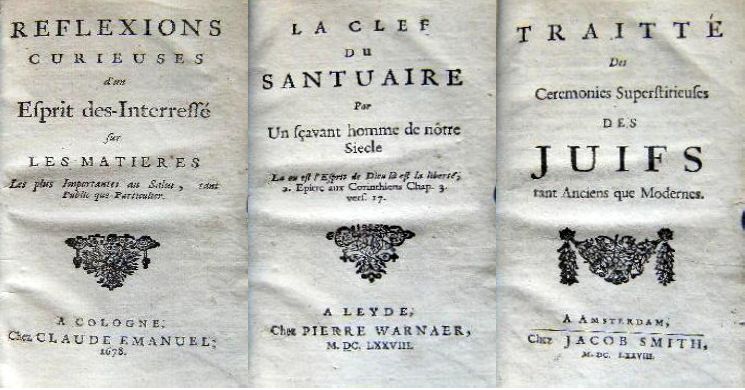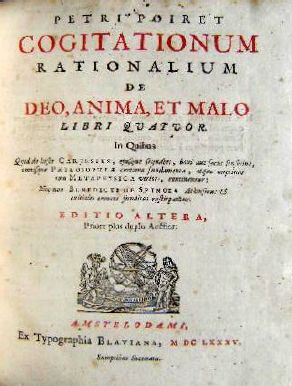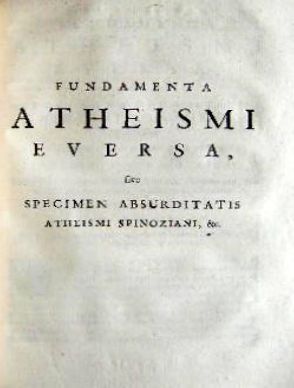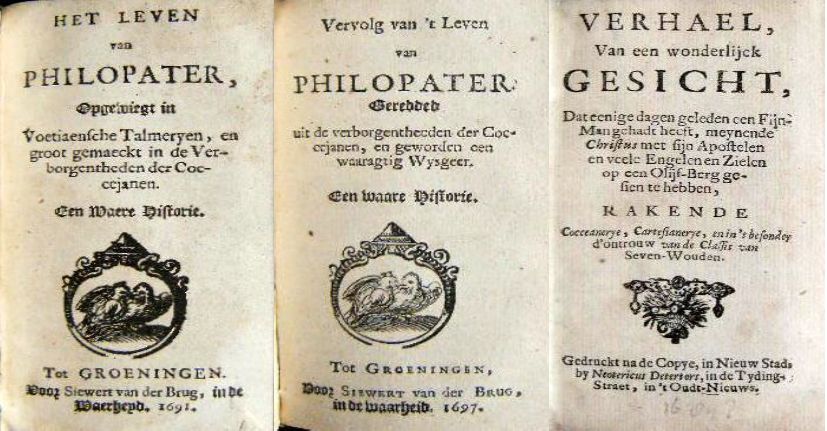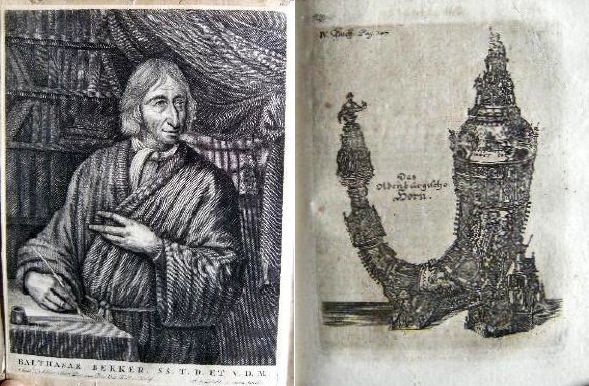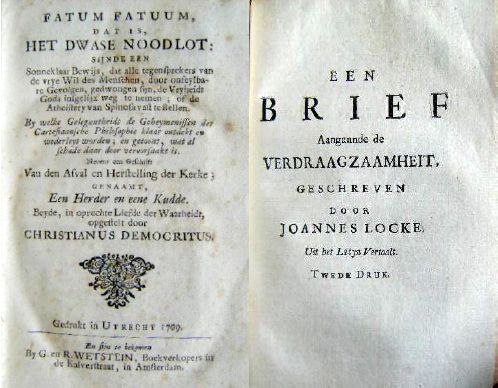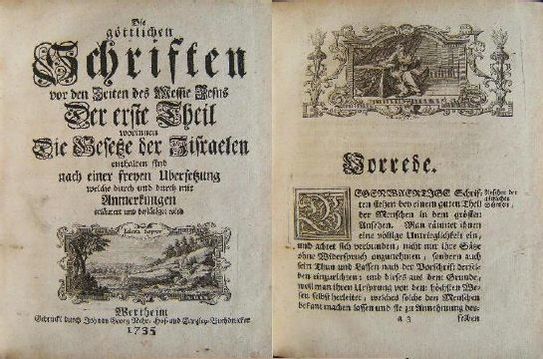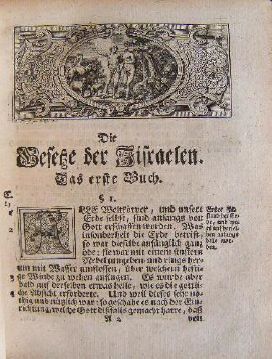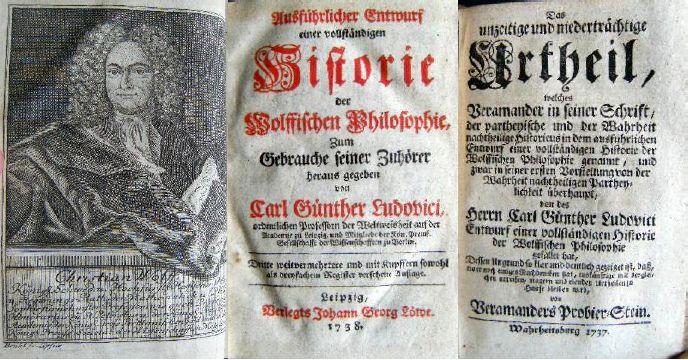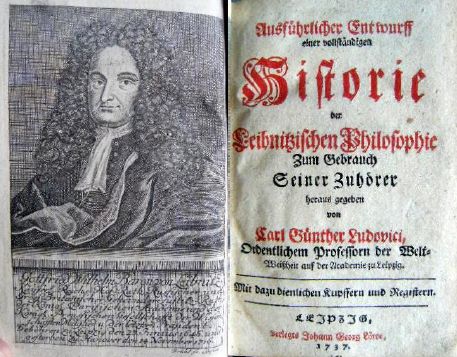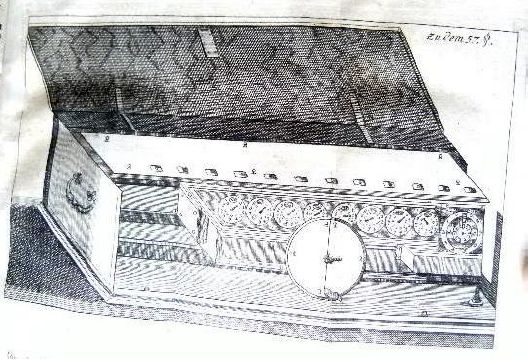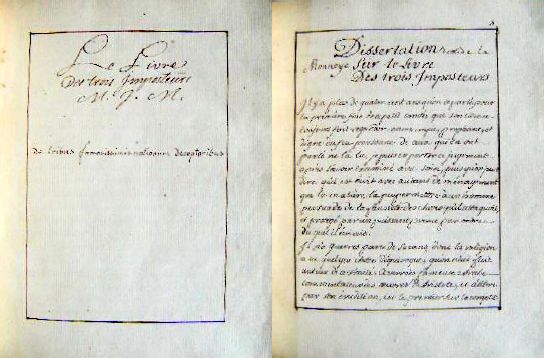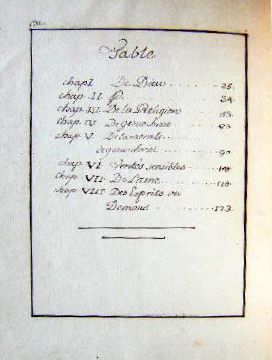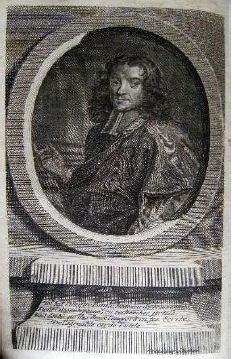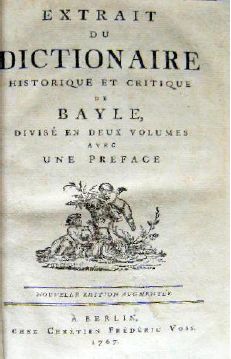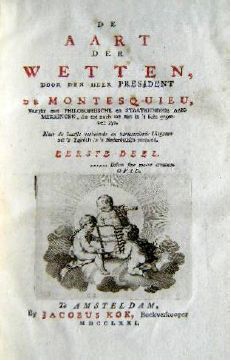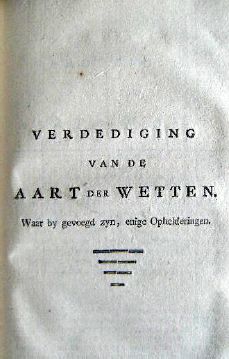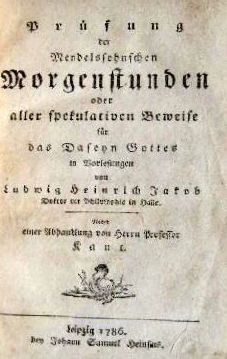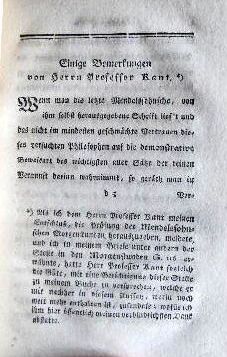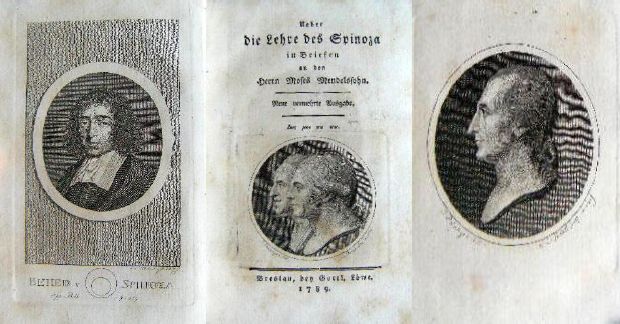- Home
-
Leven
-
Geschriften
- TIE >
- KV >
- PPCM
- TTP >
- TP >
- E >
- EP >
-
NS - Voorreeden
>
- NS_VR01
- NS_VR02
- NS_VR03
- NS_VR04
- NS_VR05
- NS_VR06
- NS_VR07
- NS_VR08
- NS_VR09
- NS_VR10
- NS_VR11
- NS_VR12
- NS_VR13
- NS_VR14
- NS_VR15
- NS_VR16
- NS_VR17
- NS_VR18
- NS_VR19
- NS_VR20
- NS_VR21
- NS_VR22
- NS_VR23
- NS_VR24
- NS_VR25
- NS_VR26
- NS_VR27
- NS_VR28
- NS_VR29
- NS_VR30
- NS_VR31
- NS_VR32
- NS_VR33
- NS_VR34
- NS_VR35
- NS_VR36
- NS_VR37
- NS_VR38
- NS_VR39
- NS_VR40
- NS_VR41
- NS_VR42
- NS_VR43
- Filosofie
- Blog
-
Lezen
-
Omtrent Spinoza
>
- Tolstoi en Spinoza
- Spinoza en schriftvervalsing
- Ieder zijn Spinoza
- Mijn avontuur met het Operaportret
- Over de twee Spinoza's
- Brevieren... in Spinoza
- Boeken die het leven veranderen?
- Spinoza-light
- De bronzen denker aan de Paviljoensgracht in den Haag
- Spinoza en de Schone Letteren
- Benjamin DeCasseres
- Theun de Vries over Spinoza
- De ethiek van Robert Misrahi in het spoor van Spinoza
- Spinoza's Lieux de mémoire
- De tekstdoolhof van Pierre Bayle
- Vermeer en Spinoza
- Gérard de Nerval, romantische naturalist
- Graaf Stanislaus von Dunin-Borkowski S.J., Spinoza-pionier
- Lord Bertrand Russell
- Harold Foster Hallett (1886-1966)
- Het dodenmasker van Spinoza...?
- De Wereldbibliotheek en Spinoza
- Spinoza en het humanisme
- In memoriam Robert Misrahi
- De niet genoemde
- Pierre Bayle: République des Lettres
- Ed Witten, de snaartheorie en Spinoza
- Bibliografie en links
- De interlineaire Spinoza >
-
Omtrent Spinoza
>
- Bibliofilie
- Kalender/Contact
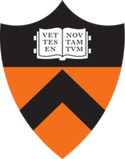
Alle hieronder genoemde werken zijn consulteerbaar in de bibliotheek van het Institute for Advanced Studies, Princeton University, New Jersey, USA. |
©Matthys de Jongh (inhoud)
©Spinozakring Lier (format) |
A collection of books by Spinoza and on his life and work, books that influenced him and books showing the influence of his philosophy on later authors. The first part includes Spinoza's own works, in seventeenth, eighteenth and nineteenth editions. It is chronologically arranged, starting with the original edition of his first book on Descartes, the only book published with his full name on the title.
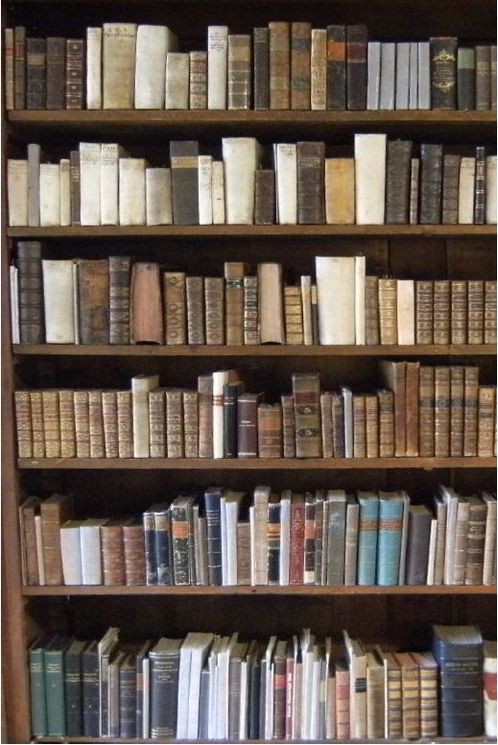
The Tractatus theologico-politicus is represented with two issues of the original quarto edition, three issues of the octavo edition, including two with deceiving titles, extremely rare and not present in the important collections of Bamberger, Wolf and the Spinozahuis. The first Dutch translation De rechtzinnige theologant is also present, as well as both issues of the French translation, one of them with all three deceiving titles.
The Opera posthuma, which includes his magnum opus the Ethica, is present, together with the Dutch translation De nagelate schriften and the German translation of the Ethica. This is followed by several editions of individual and collected works in Latin, French and German.
The second part is also chronologically arranged and includes a few works that influenced Spinoza, like those by the brothers De La Court and by Thomas Hobbes, Lodewijk Meyer's rare Philosophia S. Scripturae interpres, and Adriaan Koerbagh's rare Bloemhof. Soon after the publication of the Tractatus until the end of the seventeenth century various authors, mostly theologians, published refutations. Amongst these authors we only mention Johannes Musaeus, Edward Stillingfleet, Pierre Poiret, Christophorus Wittichius and François Lamy.
Other authors, while attacking Spinoza, also showed mostly concealed sympathy, like Burchard de Volder, Aubert de Verse, Malebranche, Balthasar Bekker and Franciscus Cuperus. Only a few books openly sympathized with Spinoza's philosophy, like Abraham Cuffeler's Specimen artis ratiocinandi and Johannes Duijkerius' Leven van Philopater and Arnold Geulincx's Ethica of zeden-konst.
Contributions to Spinoza's biography started with Pierre Bayle's Leven van B. de Spinoza, soon followed by Christianus Kortholt's De tribus impostoribus magnis and Jean Colerus Vie de B. de Spinosa.
The controversy about Spinoza continued in the eighteenth century, with opponents like Johann Conrad Dippel, Bernard Nieuwentyt, Fenelon, Samuel Clarke, and Jean Buddeus. In the 1730's raged the discussion known as the Wolff-Lange controversy, described by Jonathan Israel as 'one of the most significant cultural confrontations of the eighteenth century and perhaps the most important of the Enlightenment'.
In 1785 Friedrich Heinrich Jacobi's Ueber die Lehre des Spinoza initiated another controversy, known as the Pantheismusstreit to which was contributed by a.o. Moses Mendelssohn, Johann Gottfried Herder, Ludwig von Jakob, Thomas Wizenmann, Johann Reimarus and Friedrich Schelling.
There were also several writers showing outspoken or more concealed sympathy with Spinoza's philosophy, like John Toland, Henri de Boulainvilliers, Simon Tyssot de Patot and Willem Deurhoff. Of particular importance is Hendrik Wyermars' Den ingebeelde chaos, a treatise that has been called a 'Tractatus de emendatione Spinozae' and not present in the collections of Bamberger, Wolf and the Spinozahuis.
Finally we mention Johann Lorenz Schmidt's Spinozistic Wertheim Bible, the atheistic Traité des trois imposteurs, present in manuscript and printed, and the rare volume of early anti-religious writings Nouvelles libertés de penser, 'a landmark in the history of the Enlightenment'.
The majority of the literature of the nineteenth century had an academic character. But there were also new contributions to the Pantheismusstreit, to Spinoza's biography and further developments of his philosophy, for example Bruno Bauer's extremely rare Das entdeckte Christenthum.
The third part contains a small reconstruction of Spinoza's library. It is based upon the inventory made after Spinoza's death, probably by his Amsterdam publisher Jan Rieuwertsz the elder, reproduced in A.J. Servaas van Rooijen's Inventaire des livres formant la bibliothèque de Bénédict Spinoza.
The Opera posthuma, which includes his magnum opus the Ethica, is present, together with the Dutch translation De nagelate schriften and the German translation of the Ethica. This is followed by several editions of individual and collected works in Latin, French and German.
The second part is also chronologically arranged and includes a few works that influenced Spinoza, like those by the brothers De La Court and by Thomas Hobbes, Lodewijk Meyer's rare Philosophia S. Scripturae interpres, and Adriaan Koerbagh's rare Bloemhof. Soon after the publication of the Tractatus until the end of the seventeenth century various authors, mostly theologians, published refutations. Amongst these authors we only mention Johannes Musaeus, Edward Stillingfleet, Pierre Poiret, Christophorus Wittichius and François Lamy.
Other authors, while attacking Spinoza, also showed mostly concealed sympathy, like Burchard de Volder, Aubert de Verse, Malebranche, Balthasar Bekker and Franciscus Cuperus. Only a few books openly sympathized with Spinoza's philosophy, like Abraham Cuffeler's Specimen artis ratiocinandi and Johannes Duijkerius' Leven van Philopater and Arnold Geulincx's Ethica of zeden-konst.
Contributions to Spinoza's biography started with Pierre Bayle's Leven van B. de Spinoza, soon followed by Christianus Kortholt's De tribus impostoribus magnis and Jean Colerus Vie de B. de Spinosa.
The controversy about Spinoza continued in the eighteenth century, with opponents like Johann Conrad Dippel, Bernard Nieuwentyt, Fenelon, Samuel Clarke, and Jean Buddeus. In the 1730's raged the discussion known as the Wolff-Lange controversy, described by Jonathan Israel as 'one of the most significant cultural confrontations of the eighteenth century and perhaps the most important of the Enlightenment'.
In 1785 Friedrich Heinrich Jacobi's Ueber die Lehre des Spinoza initiated another controversy, known as the Pantheismusstreit to which was contributed by a.o. Moses Mendelssohn, Johann Gottfried Herder, Ludwig von Jakob, Thomas Wizenmann, Johann Reimarus and Friedrich Schelling.
There were also several writers showing outspoken or more concealed sympathy with Spinoza's philosophy, like John Toland, Henri de Boulainvilliers, Simon Tyssot de Patot and Willem Deurhoff. Of particular importance is Hendrik Wyermars' Den ingebeelde chaos, a treatise that has been called a 'Tractatus de emendatione Spinozae' and not present in the collections of Bamberger, Wolf and the Spinozahuis.
Finally we mention Johann Lorenz Schmidt's Spinozistic Wertheim Bible, the atheistic Traité des trois imposteurs, present in manuscript and printed, and the rare volume of early anti-religious writings Nouvelles libertés de penser, 'a landmark in the history of the Enlightenment'.
The majority of the literature of the nineteenth century had an academic character. But there were also new contributions to the Pantheismusstreit, to Spinoza's biography and further developments of his philosophy, for example Bruno Bauer's extremely rare Das entdeckte Christenthum.
The third part contains a small reconstruction of Spinoza's library. It is based upon the inventory made after Spinoza's death, probably by his Amsterdam publisher Jan Rieuwertsz the elder, reproduced in A.J. Servaas van Rooijen's Inventaire des livres formant la bibliothèque de Bénédict Spinoza.
Spinoza's works
(1) Renati des Cartes principiorum philosophiae pars I, & II, more geometrico demonstratae ... Accesserunt ejusdem cogitata metaphysica ... In quibus difficiliores, quae tam in parte metaphysices generali, quàm speciali occurrunt, quaestiones breviter explicantur.
Amstelodami, apud Johannem Rieuwerts [Amsterdam, Jan Rieuwertsz] 1663.
4to. [XVI],140p. With numerous woodcut figures. Nineteenth-century half calf, gilt back with red label, marbled boards, red edges. Title-leaf soiled and with a contemporary owner's name (Forster Coll Eman. 168[?]). Corner of last leaf torn away with loss of the last few letters of the last 6 lines and the gloss; small tear in the same leaf without loss. Bookplate from the North Library of the Earls of Macclesfield dated 1860 to front paste-down.
First edition of Spinoza's first book, the only book published with his full name on the title. This book originates from notes taken by the student and Spinoza's Rijnsburg house-mate Johannes Casearius, to whom Spinoza had explained the problems in metaphysics treated in the second part of Descartes' Principia philosophiae. Spinoza's Amsterdam friends showed great interest in this dictation and urged him to treat the first part in the same way. Spinoza did so 'within two weeks' and made a revised version of Casearius dictation of the second (and a fragment of the third) part. To this he added an appendix Cogitata metaphysica, p.91-140) of his own hand. Spinoza's Amsterdam friend Lodewijk Meyer did some editorial work and added a preface, in which he explained that the book does not express Spinoza's own ideas, and that his own opinions ideas sometimes radically differed from those of Descartes. Meyer was also responsible for the side notes and the references within the text. Another Amsterdam friend Johannes Bouwmeester added a panegyric, and a third friend Jarig Jelles paid for the printing. Kingma & Offenberg note that 'the usefulness of this publication for Spinoza lay principally in the opportunity whicht it gave him to make his name known to those highly placed in the country (by which he probably meant the De Witt brothers and their entourage) and to whet their appetite for his other writings, which he would then be able to publish without risk to himself'.
The former owner of this copy William Forster came from Huntingdonshire and was admitted sizar at Emmanuel College, Cambridge in July 1682. He died 1719.
*Kingma & Offenberg 1. Van der Linde 1. Wolf 356. Bamberger 675. Spinozahuis 160/184. SB 112.
(1) Renati des Cartes principiorum philosophiae pars I, & II, more geometrico demonstratae ... Accesserunt ejusdem cogitata metaphysica ... In quibus difficiliores, quae tam in parte metaphysices generali, quàm speciali occurrunt, quaestiones breviter explicantur.
Amstelodami, apud Johannem Rieuwerts [Amsterdam, Jan Rieuwertsz] 1663.
4to. [XVI],140p. With numerous woodcut figures. Nineteenth-century half calf, gilt back with red label, marbled boards, red edges. Title-leaf soiled and with a contemporary owner's name (Forster Coll Eman. 168[?]). Corner of last leaf torn away with loss of the last few letters of the last 6 lines and the gloss; small tear in the same leaf without loss. Bookplate from the North Library of the Earls of Macclesfield dated 1860 to front paste-down.
First edition of Spinoza's first book, the only book published with his full name on the title. This book originates from notes taken by the student and Spinoza's Rijnsburg house-mate Johannes Casearius, to whom Spinoza had explained the problems in metaphysics treated in the second part of Descartes' Principia philosophiae. Spinoza's Amsterdam friends showed great interest in this dictation and urged him to treat the first part in the same way. Spinoza did so 'within two weeks' and made a revised version of Casearius dictation of the second (and a fragment of the third) part. To this he added an appendix Cogitata metaphysica, p.91-140) of his own hand. Spinoza's Amsterdam friend Lodewijk Meyer did some editorial work and added a preface, in which he explained that the book does not express Spinoza's own ideas, and that his own opinions ideas sometimes radically differed from those of Descartes. Meyer was also responsible for the side notes and the references within the text. Another Amsterdam friend Johannes Bouwmeester added a panegyric, and a third friend Jarig Jelles paid for the printing. Kingma & Offenberg note that 'the usefulness of this publication for Spinoza lay principally in the opportunity whicht it gave him to make his name known to those highly placed in the country (by which he probably meant the De Witt brothers and their entourage) and to whet their appetite for his other writings, which he would then be able to publish without risk to himself'.
The former owner of this copy William Forster came from Huntingdonshire and was admitted sizar at Emmanuel College, Cambridge in July 1682. He died 1719.
*Kingma & Offenberg 1. Van der Linde 1. Wolf 356. Bamberger 675. Spinozahuis 160/184. SB 112.
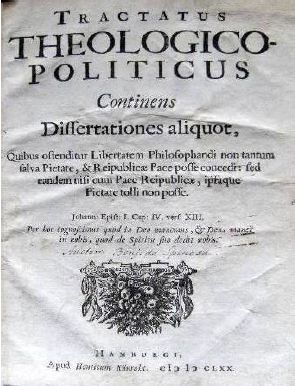
(2) Tractatus theologico-politicus ...
Hamburgi, apud Henricum Künraht [Amsterdam, Jan Rieuwertsz] 1670 [but 1672]. 4to. [XII],233,[1 errata]p. Fine modern calf, back with gilt-lettered red label. Title slightly stained and creased and with a minor old repair (not affecting the text), inner margin of title and last leaf strengthened. On the title in ink in an old hand 'Auctore Benjs [?] da Spinosa'.
Usually identified as first edition, third issue. Identified by Bamberger as second edition, second issue. This issue differs from the first issue of the second edition by the date on the title only, the first being dated 1672 on the title.
Bamberger has suggested an explanation for these issues. 'In the summer of 1672 it appeared that the concerted efforts of the orthodox church groups had been checked by official indifference and delaying tactics; from September, 1671, to July, 1672, the church councils and synods were silent. It was probably at that time that Rieuwertsz made the plans for the edition of 1672. However, on August 4, 1672, Johan de Witt was forced to resign as Grand Pensionary and, a few weeks later, a savage mob murdered him in the streets of Amsterdam [sic!]. Spinoza had lost his great protector. It seems reasonable to assume that at that time the first issue was changed into the second. And as the political climate worsened after De Witt's death, greater prudence became necessary.' The first issue of this second edition is of great rarity.
J.Kingma & A.K.Offenberg have made accurate descriptions of all editions of Spinoza's works printed before 1800. The four quarto editions and the present second issue of the second edition can be distinguished by the imprints, the errata and the corrections made, and the misnumbering of certain pages. The present edition agrees with their description of nr 5: the imprint as quoted, the errata on pages 8, 22, 39, 41, 95 and 121 corrected, the other errata not corrected, page 42 misnumbered 24, page 207 misnumbered 213, page 161 Cap. XIV misnumbered Cap. XVI (and not Cap. XVI misnumbered Cap. XIV as Kingma & Offenberg erroneously state), and signature (*)3 misprinted (*)4.
Other typographical differences between the quarto editions were already noticed by Land. The chronology of the various editions made by Land and Bamberger is based upon the assumption that succeeding editions became increasingly imperfect. Kingma & Offenberg suggest that, since Spinoza took an 'active interest in the corrections of his text', the present edition may be dated 'after 1677'.
*Bamberger T2a. Kingma & Offenberg 5. Land B. Van der Linde 3. Wolf 362. Bamberger 679. Spinozahuis 162 & 163 (Land A & C only) / 202 (without details). Knuttel 391.
(2) Tractatus theologico-politicus ...
Hamburgi, apud Henricum Künraht [Amsterdam, Jan Rieuwertsz] 1670 [but 1672]. 4to. [XII],233,[1 errata]p. Fine modern calf, back with gilt-lettered red label. Title slightly stained and creased and with a minor old repair (not affecting the text), inner margin of title and last leaf strengthened. On the title in ink in an old hand 'Auctore Benjs [?] da Spinosa'.
Usually identified as first edition, third issue. Identified by Bamberger as second edition, second issue. This issue differs from the first issue of the second edition by the date on the title only, the first being dated 1672 on the title.
Bamberger has suggested an explanation for these issues. 'In the summer of 1672 it appeared that the concerted efforts of the orthodox church groups had been checked by official indifference and delaying tactics; from September, 1671, to July, 1672, the church councils and synods were silent. It was probably at that time that Rieuwertsz made the plans for the edition of 1672. However, on August 4, 1672, Johan de Witt was forced to resign as Grand Pensionary and, a few weeks later, a savage mob murdered him in the streets of Amsterdam [sic!]. Spinoza had lost his great protector. It seems reasonable to assume that at that time the first issue was changed into the second. And as the political climate worsened after De Witt's death, greater prudence became necessary.' The first issue of this second edition is of great rarity.
J.Kingma & A.K.Offenberg have made accurate descriptions of all editions of Spinoza's works printed before 1800. The four quarto editions and the present second issue of the second edition can be distinguished by the imprints, the errata and the corrections made, and the misnumbering of certain pages. The present edition agrees with their description of nr 5: the imprint as quoted, the errata on pages 8, 22, 39, 41, 95 and 121 corrected, the other errata not corrected, page 42 misnumbered 24, page 207 misnumbered 213, page 161 Cap. XIV misnumbered Cap. XVI (and not Cap. XVI misnumbered Cap. XIV as Kingma & Offenberg erroneously state), and signature (*)3 misprinted (*)4.
Other typographical differences between the quarto editions were already noticed by Land. The chronology of the various editions made by Land and Bamberger is based upon the assumption that succeeding editions became increasingly imperfect. Kingma & Offenberg suggest that, since Spinoza took an 'active interest in the corrections of his text', the present edition may be dated 'after 1677'.
*Bamberger T2a. Kingma & Offenberg 5. Land B. Van der Linde 3. Wolf 362. Bamberger 679. Spinozahuis 162 & 163 (Land A & C only) / 202 (without details). Knuttel 391.
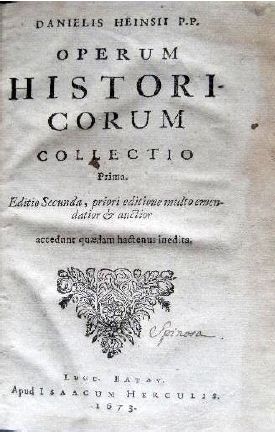
(3) [Tractatus theologico-politicus ...] Danielis Heinsii P.P. Operum historicorum collectio prima. [Second title-page: secunda]. Editio secunda, priori editione multo emendatior & auctior accedunt quaedam hactenus inedita.
Lugd. Batav., apud Isaacum Herculis [Amsterdam, Jan Rieuwertsz] 1673.
2 volumes in 1. [XXII],334; [XVIII],182,[19]p. Contemp. calf, blind tooled back with label ('Tractatus/ th. pol: Spin.'), sprinkled edges, minor wear to top of back. Bookplate of the 'Bibl. Hammer / Stockholm' to front paste-down. On the title in ink in an old hand 'Spinosa'.
Third edition, one of five issues in octavo. This edition combines Spinoza's Tractatus theologico-politicus and Lodewijk Meyer's Philosophia S. Scripturae interpres. One of three issues with fictious title-pages, all extremely rare and not present in either Wolf, Bamberger or Spinozahuis. After the fall of Johan de Witt the political situation in Holland had changed and Rieuwertsz thought it wise to publish this new edition without revealing its contents. He therefore published it with three fictious titles: the title as quoted above, Francisci Henriquez de Villacorta ... Opera chirurgica omnia and Totius medicinae idea nova seu Francisci de le Boe Sylvii ... Opera omnia. They are all from the same printing and the title-pages form an integral part of the first quires. However, the true contents was soon discovered and on July 19, 1674, the printing, distribution and sale of the book was forbidden.
*Bamberger T.3H. Kingma & Offenberg 9. Van der Linde 5.
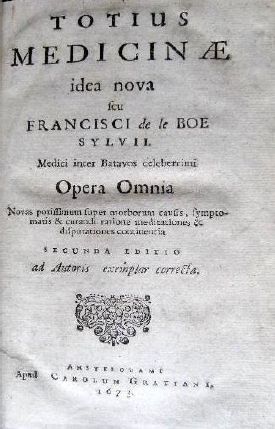
(4) [Tractatus theologico-politicus ...] Totius medicinae idea nova seu Francisci de le Boe Sylvii. Medici inter Batavos celeberrimi. Opera omnia. Novas potissimum super morborum causis, symptomatis & curandi ratione meditationes & disputationes continentia. Secunda editio ad autoris exemplar correcta.
Amstelodami, apud Carolum Gratiani [Amsterdam, Jan Rieuwertsz] 1673.
2 volumes in 1. [XXII],334; [XVIII],182,[19]p. Contemp. blind tooled calf, back with label ('Tractatus theologicus politicus'), neat repair to top of back, sprinkled edges.
Third edition, one of five issues in octavo. This edition combines Spinoza's Tractatus theologico-politicus and Lodewijk Meyer's Philosophia S. Scripturae interpres. One of three issues with fictious title-pages, all extremely rare and not present in either Wolf, Bamberger or Spinozahuis.
*Bamberger T.3S. Kingma & Offenberg 10. Van der Linde 6.
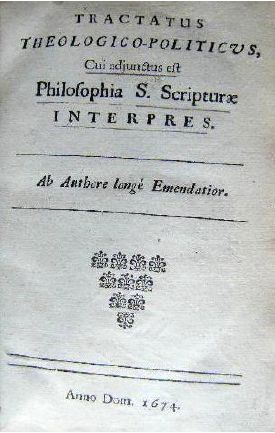
(5) Tractatus theologico-politicus, cui adjunctus est Philosophia S. Scripturae interpres. Ab authore longé emendatior.
[Amsterdam, Jan Rieuwertsz] Anno Dom. 1674.
2 volumes in 1. [XXII],334,[4 blank]; [XVI],182,[20]p. Fine modern calf, gilt back with red label. On first blank recto two names and on verso annotations in two different old hands.
Third edition, one of five issues in octavo. This edition combines Spinoza's Tractatus theologico-politicus and Lodewijk Meyer's Philosophia S. Scripturae interpres. It is a re-issue of the edition that appeared in 1673 with three different deceiving title-pages. Yet the true contents was soon discovered and on July 19, 1674, the printing, distribution and sale of the book was forbidden. Rieuwertsz then decided to find buyers for the remaining stock abroad, mostly in England. Since it was no longer necessary to hide its real contents he removed the old title-pages and made a new title-page revealing the true contents. Type and style were chosen to give it an English appearance. Since the title-page mentions also Lodewijk Meyer's work no title- page had to be made for the second volume.
The names of the former owners ('W.Chaplin / Norwich' and 'M[?] Betham Edwards') and the annotations on the first blank confirm that this copy found its way to England: 'This work made a great noise, and was levelled att overthrowing all religion, and to introduce atheism toleration [?] &c. Spinosa, who was the author, a Jew born, but neither abjured Judaism nor embraced Christianity. This tract has been most fully refuted by Bredenburgius in his Enervatio tractatus theologico-politici ...'
*Bamberger T3.E. Kingma & Offenberg 12. Van der Linde 7. Wolf 364. Bamberger 681. Spinozahuis 203 & 350/164.
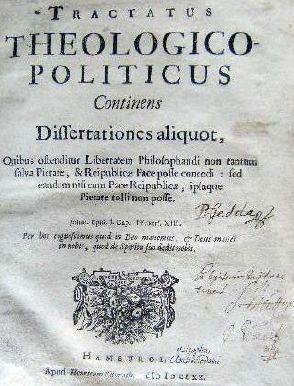
(6) Tractatus theologico-politicus ...
Hamburgi, apud Henricum Künrath [Amsterdam, Jan Rieuwertsz] 1670 [but after 1677].
4to. [XII],233,[1 blank]p. Contemp. vellum, back with ms. title, red edges. Occasionally old ink underlinings. Some old signatures on title, and beside the imprint 'vel potius Amstelodami'. On the first endpaper a long commentary in English dated 1862.
Usually identified as first edition, fifth issue. Identified by Bamberger as fifth edition, the last contemporary edition in Latin. It can be distinguished by the absence of the errata-list - the last page is blank -, more corrected errata, p.192 being misnumbered 92, and the use of another vignette at the end of the preface. Other typographical differences between the quarto editions were already noticed by Land. Printed on thick paper.
*Bamberger T5. Kingma & Offenberg 7. Land D. Van der Linde 3. Wolf 363. Bamberger 684. Spinozahuis (162 & 163 Land A & C only)/202 (without details). SB 102. Knuttel 391.
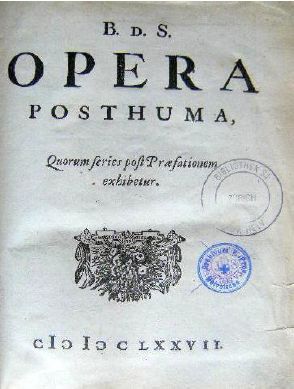
(7) B.D.S. Opera posthuma, quorum series post praefationem exhibetur.
[Amsterdam, Jan Rieuwertsz] 1677.
4to. [XL],614,[32],[2],112,[8]p. With some woodcut figures in the text. Contemp. vellum, back with ms. title, somewhat soiled. Two small (1-2 cms) tears in title, two stamps from a Swiss Jesuit library to title and three to front endpaper, a few leaves with tiny marginal loss of paper far from printed surface, a few folds.
First (only Latin) edition. Spinoza's literary remains, shortly before his death given to his Amsterdam publisher Jan Rieuwertsz and printed soon afterwards. It includes the following pieces, with own half-titles: Ethica ordine geometrico demonstrata (p.XXXIX-264), Tractatus politicus (p.265-354), Tractatus de intellectus emendatione (p.355-392) and Epistolae doctorum quorundam virorum ad B.d.S. Et auctoris responsiones (p.393-614), followed by an Index rerum (31p.). This is followed by a separately paginated Compendium grammatices linguae Hebraeae (2,112p.), an Indiculus capitum grammatices Hebrae (5p.), and errata lists (3p.). All this is preceded by a preface by Jarig Jelles, translated from the Dutch, by either Spinoza's friend Lodewijk Meyer or by J.H.Glazemaker, known as translator into Dutch of several Latin books. A separately published portrait was added to a few copies only.
*Kingma & Offenberg 24. Van der Linde 22. Wolf 378 & 379. Bamberger 695 & 696. Spinozahuis 171/172. SB 8610. Knuttel 377.
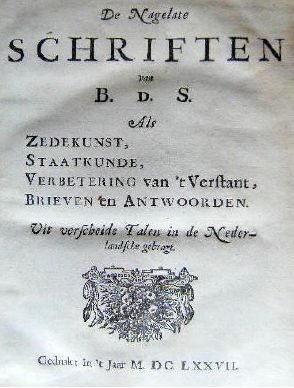
(8) De nagelate schriften van B. D. S. Als zedekunst, staatkunde, verbetering van 't verstant, brieven en antwoorden. Uit verscheide talen in de Nederlandsche gebragt.
[Amsterdam, Jan Rieuwertsz] gedrukt in 't jaar 1677.
4to. [XLVIII],666,[2 errata]p. With some woodcut figures in the text. Contemp. vellum, somewhat soiled, two tiny repairs to covers. Fading vague waterstain in upper right corner.
First (only Dutch) edition, very rare. Published simultaneously with the Latin edition. It contains the same pieces as the Latin edition, with the exception of the Hebrew grammar, with own half-titles: Zedekunst, in vijf delen onderscheiden (p.XLVII-300), Staatkundige verhandeling (p.301-403), Handeling van de verbetering van 't verstant (p.405-446), and Brieven van verscheide geleerde mannen aan B. D. S. Met des zelfs antwoort (p.447-666). This is preceded by Jarig Jelles' original Dutch preface.
Since Spinoza's literary remains were only shortly before his death given to his Amsterdam publisher Jan Rieuwertsz the translations of the various pieces were not made from the printed Latin edition, but at leasted partly made earlier. From Spinoza's correspondence it becomes clear that a translation of the Ethica had already started as early as 1665. Though the translation of the whole work has often been ascribed to J.H.Glazemaker it is likely that some of Spinoza's Amsterdam friends had worked on translations of various parts and that Glazemaker did the final editing only.
A separately published portrait was added to a few copies only.
*Kingma & Offenberg 25. Van der Linde 23. Wolf 380. Bamberger 697. Spinozahuis 172/173. SB 497. Glazemaker 22.
(9) Traitté des ceremonies superstitieuses des juifs tant anciens que modernes.
Amsterdam, Jacob Smith [Amsterdam, Jan Rieuwertsz] 1678.
12mo. [XXXII],531,[29 index, 1 errata, 1 blank],30p. Contemp. vellum. Bookseller's ticket ('Lucien Bodin, Paris') to front free endpaper.
First French edition of the Tractatus theologico-politicus. The translation was done by Gabriel (or Dominique) de Saint-Glain (or Saint-Glen), a French protestant refugee and admirer of Spinoza. It also contains, printed here for the first time, Remarques curieuses, et necessaires pour l'intelligence de ce livre (the last 30 pages of the volume), a translation of the annotations made by Spinoza in his own copy of the Latin edition a few months before his death in 1677.
Kingma & Offenberg have identified two different editions of this. They can be distinguished by a great number of typographical and other differences: types used for the marginal notes and chapter headings, size of the sheets, etc. They also noticed that the watermark of the paper used for one of the editions is similar to that of the paper used for the Latin and Dutch editions of the Opera posthuma and on that (and a few other) observations suggest that this edition has priority.
Both editions were issued with three different title-pages: the title mentioned above, Reflexions curieuses d'un esprit des-interressé sur les matieres les plus importantes au salut, tant public que particulier, and La clef du san(c)tuaire, par un sçavant homme de nôtre siecle; this last title exists in three variants. Several copies are known that have two or three of these title-pages. The title-pages mention three different publishers: 'Amsterdam, Jacob Smith' as above, 'Cologne, Claude Emanuel' and 'Leyde, Pierre Warnaer'. None of the bibliographers disclose the real publisher of this book, but it may be assumed that it was Jan Rieuwertsz.
*Kingma & Offenberg 15. Van der Linde 12. Bamberger 687. Spinozahuis 165/207. SB 360.
(10) Reflexions curieuses d'un esprit des-interressé sur les matieres les plus importantes au salut, tant public que particulier. [Second title-page:] La clef du santuaire par un sçavant homme de nôtre siecle. [Third title- page:] Traitté des ceremonies superstitieuses des juifs tant anciens que modernes.
Cologne, Claude Emanuel, [Second title-page:] Leyde, Pierre Warnaer, [Third title-page:] Amsterdam, Jacob Smith [Amsterdam, Jan Rieuwertsz] 1678.
12mo. [XXXIV including 3 title-pages],531,[29 index, 1 errata, 1 blank],30p. Contemp. calf, back richly gilt with red label, red edges, marbled endpapers.
(10) Reflexions curieuses d'un esprit des-interressé sur les matieres les plus importantes au salut, tant public que particulier. [Second title-page:] La clef du santuaire par un sçavant homme de nôtre siecle. [Third title- page:] Traitté des ceremonies superstitieuses des juifs tant anciens que modernes.
Cologne, Claude Emanuel, [Second title-page:] Leyde, Pierre Warnaer, [Third title-page:] Amsterdam, Jacob Smith [Amsterdam, Jan Rieuwertsz] 1678.
12mo. [XXXIV including 3 title-pages],531,[29 index, 1 errata, 1 blank],30p. Contemp. calf, back richly gilt with red label, red edges, marbled endpapers.
Second French edition of the Tractatus theologico-politicus, rare with all three different title-pages. The second titlepage exists in three variants, this is the first variant as listed by Kingma & Offenberg.
*Kingma & Offenberg 16 & 19. Van der Linde 10-12. Wolf 373. Bamberger 689 (two titles only). Spinozahuis 165/207. SB 360.
*Kingma & Offenberg 16 & 19. Van der Linde 10-12. Wolf 373. Bamberger 689 (two titles only). Spinozahuis 165/207. SB 360.
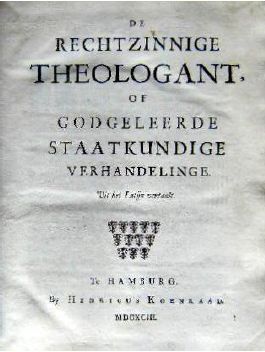
(11) De rechtzinnige theologant, of godgeleerde staatkundige verhandelinge. Uit het Latijn vertaalt. Hamburg, Henricus Koenraad [Amsterdam, Jan Rieuwertsz jr] 1693.
4to. [XXVIII],360p. Contemp. vellum, back with modern ms. title, wanting front free endpaper.
First Dutch edition, very rare, of the Tractatus theologico-politicus. The translation was done by Jan Hendrik Glazemaker already shortly after the appearance of the Latin edition. It was presumably urged by Spinoza's friend Jarig Jelles who did not know Latin. In his letter of 17 February 1671 Spinoza objected against the printing of the translation, but manuscript copies circulated. More than 20 years afterwards the manuscript was brought to the publisher, the son of Spinoza's earlier publisher Jan Rieuwertsz sr, by an unidentified 'doctor of medicine and illustrious philosopher'.
A second, anonymous translation appeared the next year with a slightly different title (Een rechtsinnige theologant, of godgeleerde staatkunde).
*Kingma & Offenberg 22. Van der Linde 17. Wolf 367. Spinozahuis 167/208. Glazemaker 23.
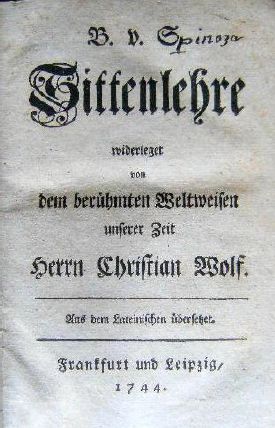
(12) B. D. S. Sittenlehre widerleget von dem berühmten Weltweisen unserer Zeit Herrn Christian Wolf. Aus dem Lateinischen übersetzet.
Frankfurt und Leipzig 1744.
Small 8vo. 56,598,128p. With some woodcut figures in the text, and some head- and tail-pieces and decorated initials. Without the portrait. Contemp. marbled boards, gilt back with label, yellow edges. Spinoza's name, on the title indicated as 'B.v.S.' only, supplied in ink. Signature of a former owner dated 1830 on front free endpaper.
First German edition of the Ethica, translated by Johann Lorenz Schmidt. It was the first work of Spinoza translated into German. It is preceded by a preface to this translation and a translation of Jarig Jelles' preface to the Opera posthuma. It has an own half-title Scharf erwiesene Sittenlehre nach geometrischer Lehrart vorgetragen.
The translator Johann Lorenz Schmidt (1702-1749) was a follower of Christian Wolf and acquired some fame for his rationalistic annotated and highly controversial translation into German of the Pentateuch, known as the Wertheim Bible (1735).
The Ethica is followed by a translation of a part of Christian Wolff's refutation of Spinoza in the second part of his Theologia naturalis of 1737. It also has an own half-title Herrn Christian Wolfs Widerlegung der Sittenlehre B.D.S.. Bamberger suggested that Schmidt added Wolff's refutation 'probably as a safeguard'.
*Kingma & Offenberg 26. Van der Linde 25. Wolf 399. Bamberger 698. SB 757.
(13) Ethik. Neue unveränderte Auflage.
Leipzig, Adam Friedrich Böhme 1796.
2 volumes in 1. [II],LXII,182,[II],299p. Contemp. boards, back with label, red edges. A very nice copy.
A new issue of the second and third volume of Spinoza's Philosophische Schriften published by Bekmann in Gera between 1790 and 1793. The first volume of that edition contains the Tractatus theologico-politicus but was not reissued. Kingma & Offenberg list that edition, but overlooked the present new issue.
This is a new translation of the Ethica by Schack Hermann Ewald (1745-1822), a jurist, man of letters, Kantian, and freemason from Gotha. The first German translation of the Ethica by Johann Lorenz Schmidt was published in 1744, together with a refutation by Christian Wolff. The translator added a long preface and several critical notes. In the preface he refers to Wolf's refutation, but that refutation is not, as Bamberger erroneously notes, included. Ewald had earlier published German translations of the Tractatus de intellectus emendatione and the Tractatus politicus.
*Bamberger 703. SB 1883.
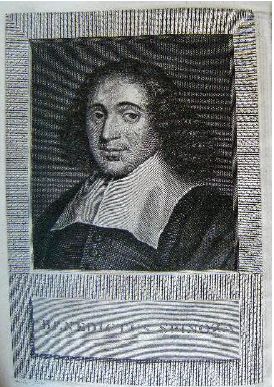
(14) Opera quae supersunt omnia. Iterum edenda curavit, praefationes, vitam auctoris, nec non notitias, quae ad historiam scriptorum pertinent addidit Henr. Eberh. Gottlob Paulus.
Ienae, in Bibliopolio Academico [Jena, Akademische Buchhandlung] 1802-03.
2 volumes. XXIV,XXIV,700; XXXX,680p. With engraved portrait by Johann Heinrich Lips. Contemp. calf, gilt backs with double labels differing in colour, rubbed, marbled endpapers.
First critical edition of Spinoza's works. The first volume contains Renati des Cartes principiorum philosophiae, with the appended Cogitata metaphysica, the Tractatus theologico-politicus, with the Remarques curieuses et necessaires pour l'intelligence de ce livre, and the Epistolae. The second volume contains the Opera posthuma and Collectanea de vita B. de Spinoza, a synopsis of biographical information taken from Colerus, Boulainvilliers, Lucas, Kortholt and Leibniz, mostly in French. Both volumes have a preface by the editor Heinrich Eberhard Gottlob Paulus (1761-1851), professor of philosophy and theology at Jena. Hegel contributed to the preface of the second volume.
*Van der Linde 38. Wolf 338. Bamberger 701. SB 272 & 254.
(15) Ethik nebst den Briefen welche sich auf die Gegenstände der Ethik beziehen aus dem Lateinischen übersetzt von Friedr. Wilh. Valent. Schmidt. Erster Band [all published]. Die Ethik enthaltend.
Berlin und Stettin, Friedrich Nicolai 1812.
VIII,431,[1]p. Contemp. marbled boards, worn. Name on title.
First (only) edition of this translation of the Ethica. A projected second volume with Spinoza's letters never appeared. According to Bamberger this translation by Friedrich Willhelm Schmidt, professor of modern languages in Berlin, was 'excellent'.
*Van der Linde 26. Wolf 400. Bamberger 699. SB 2660.
(16) Theologisch-politische Abhandlungen. Freye Uebersetzung und mit Anmerkungen begleitet von Dr. J.A.Kalb.
München, Joseph A. Finsterlin 1826.
XLVIII,432,[1 errata]p. Contemp. boards, back worn, red edges. Title almost detached.
First (only) edition of this 'free translation' of the Tractatus theologico-politicus. With a preface in which Spinoza is praised as 'one of the greatest and most consistent thinkers, the Plato of all centuries', and with numerous annotations 'which stressed subservience of reason to religion'. It is very rare because the larger part of this edition was confiscated by the Bavarian police.
*Van der Linde 20. Bamberger 693. SB 216.
(17) Opera philosophica omnia. Edidit et praefationem adjecit A. Gfroerer. Stuttgardiae, J.B.Metzleri [Stuttgart, J.B.Metzler] 1830.
III-LXXVIII,664p., wanting half-title. With 2 engraved plates on 1 folding leaf showing the figures of the Renati des Cartes principiorum philosophiae and the Ethica. (Wanting half-title: Corpus philosophorum optimae notae, qui ab restauratione litterarum ad Kantium usque floruerunt III) Contemp. half calf, rubbed, gilt back with red label, red edges. Some spotting in the beginning, stamp on title, former owner's entries on front endpaper.
This edition contains the same works as in Paulus' collected edition of 1802-03, with the exception of the Compendium grammaticae linguae Hebraeae from the Opera posthuma. It includes Paulus' synopsis of biographical information. It has several errors of Paulus' edition of 1802-03 corrected, but new errors introduced. August Friedrich Gfroerer (1803-1861), a librarian from Stuttgart, added a preface.
*Van der Linde 39. Wolf 1297. Bamberger 704. SB 46.
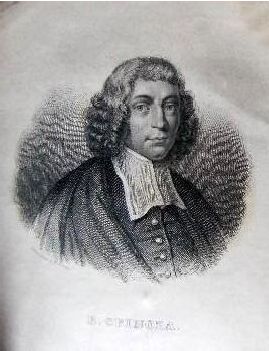
(18) Sämmtliche Werke. Aus dem Lateinischen mit dem Leben Spinoza's von Berthold Auerbach. Stuttgart, J.Scheible 1841.
5 volumes. Small 8vo. CXXV,290; 541; 466; 284; 422p. With steel-engraved portrait and folding facsimile. Uncut in orig. printed wrappers.
First edition of Auerbach's translation of the collected works, preceded by a long biography. A second revised and enlarged appeared 1871.
*Van der Linde 43. Wolf 351. Spinozahuis 185/166. SB 1120.
(19) Oeuvres. Traduites par Emile Saisset. Avec une introduction du traducteur. Première serie: Introduction. Vie de Spinoza. Théologie de Spinoza. Seconde série: Ethique. Réforme de l'entendement. Correspondance.
Paris, Charpentier 1842.
2 volumes in 1. 12mo. [II],CVIII,354; [II],VIII,436p. Contemp. half calf, back richly gilt, little rubbed. Cancelled library stamp on title of first volume.
First collected edition in French. The first volume contains an introduction by the translator with a short bibliography, Colerus' biography, and the Traité théologico-politique. This had appeared in French already in 1678 in a translation by De Saint-Glain, but the present translator in his introduction strongly disapproves of it, saying that it has 'no page without error or without contrary sense'. The second volume contains the first French editions of the Ethica, the Tractatus de intellectus emendatione and the Epistolae.
A second revised and enlarged appeared 1861. Emile Edmond Saisset (1814-1863) was a French philosopher, professor in Caen and at the Collège de France, and member of the Académie des sciences morales et politiques.
*Van der Linde 44.
(20) Renati des Cartes et Benedicti de Spinoza praecipua opera philosophica recognovit notitias historico-philosophicas adjecit Dr. Carolus Riedel.
Lipsiae [Leipzig], sumtibus Hermanni Hartung 1843.
2 volumes in 1. Small 8vo. VIII,290,[1], XX,280p. Contemp. half cloth. Foxing.
This edition combines Descartes' Meditationes de prima philosophia, without the objections and letters, with Spinoza's Tractatus de intellectus emendatione and his Tractatus politicus, the treatise De jure ecclesiasticorum, at that time attributed to Spinoza, now by some to Pieter de la Court, and the Ethica.
*Van der Linde 40. Wolf 339. SB 1322.
(21) Opera quae supersunt omnia. Ex editionibus principibus denuo edidit et praefatus est Carolus Hermannus Bruder. Editio stereotypa.
Leipzig, ex officina Bernhardi Tauchnitz 1843-46.
3 volumes. 12mo. XXVIII,416; XIV,354; XVIII,402p. Orig. cloth, gilt backs.
An esteemed edition based upon the original seventeenth-century editions, It has the errors of Paulus' edition of 1802-03 corrected and some valuable prefaces and annotations. It was, and still is, much used by Spinoza scholars. Karl Hermann Bruder was a Lutheran theologian from Saxony.
*Van der Linde 41. Wolf 340. Spinozahuis /161. SB 1168.
(22) Traité politique. Traduit en français pour la première fois. Annoté, suivi d'un index analytique, et accompagné de trois plans des trois différentes formes de gouvernement par J.G. Prat.
Paris, rue Saint-Lazare, 82 et chez tous les libraires 1860.
[IV],XXXVI,[4],332p. With 4 folding tables: Plan (& Suite d'un plan) d'un gouvernement démocratique applicable a tous les états ... inspiré par le Traité politique de Spinoza et dressé par J.G.Prat (49 x 60 & 49 x 66 cm), Plan du gouvernement monarchique de Spinoza (31 x 27 cm) & Plan du gouvernement aristocratique de Spinoza (31 x 54 cm). Contemp. half morocco, marbled sides and endpapers.
First French edition of the Tractatus politicus, amply annotated by the translator (p.257-308), and with an index of subjects.
*Van der Linde 31.
(23) Oeuvres. Traduites par Emile Saisset. Avec une introduction critique. Nouvelle édition revue et augmentée.
Paris, G. Charpentier [1861].
3 volumes. Small 8vo. [IV],III,368; [IV],LXVIII,471; [IV],462p. Orig. printed wrappers, soiled. Foxed.
Second enlarged edition. It has added the Traité politique not present in the edition of 1842 and, more important, the whole first volume is now taken by Saisset's introduction in which he criticizes Spinoza and refutes pantheism.
*Van der Linde 45. Wolf 1303. Spinozahuis /167.
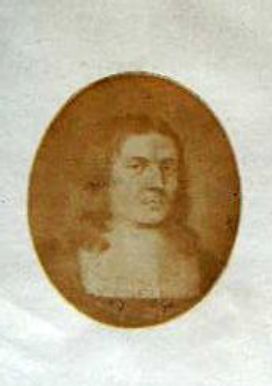
(24) Ad Benedicti de Spinoza opera quae supersunt omnia supplementum. Continens tractatum hucusque ineditum de Deo et homine, tractatum de iride, epistolas nonnullas ineditas, et ad eas vitamque philosophi collectanea.
Amstelodami, Fredericum Muller 1862.
Small 8vo. [II],V,[1],360p. With small oval portrait and folding facsimile of a letter from Spinoza (small tear in inner margin). Contemp. half cloth, gilt back, marbled sides. Stamps on verso of portrait.
First complete edition of Spinoza's Tractatus de Deo et homine, or Korte verhandeling van god. An excerpt of this, attributed to Johannes Monnikhoff, had already been published in 1852 by Eduard Böhmer, together with some unpublished notes of Spinoza to his Tractatus theologico-politicus.
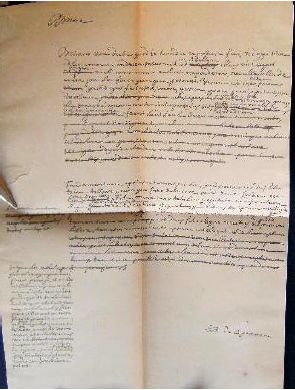
After the appearance of that volume the Amsterdam bookseller Frederik Muller traced a mid-eighteenth century manuscript of the same tract. When Johannes van Vloten was working at the publication of that manuscript another, earlier manuscript of a Dutch translation was discovered. The present critical edition presents these texts in Dutch and Latin.
It is followed by the Stelkonstige reeckening van den regenboog, long attributed to Spinoza but now to Salomon Dierquens, and by Collectanea ad vitam Spinozae ejusque et aliorum epistolae.
The portrait, here executed as a photograph by H.Buttstaedt, has long been believed to be a portrait of Spinoza painted by Van der Spyck, Spinoza's landlord for the last six years of his life and a house-painter, but this has now been rejected.
*Van der Linde 50. Wolf 1301. Spinozahuis 179/. SB 421.
It is followed by the Stelkonstige reeckening van den regenboog, long attributed to Spinoza but now to Salomon Dierquens, and by Collectanea ad vitam Spinozae ejusque et aliorum epistolae.
The portrait, here executed as a photograph by H.Buttstaedt, has long been believed to be a portrait of Spinoza painted by Van der Spyck, Spinoza's landlord for the last six years of his life and a house-painter, but this has now been rejected.
*Van der Linde 50. Wolf 1301. Spinozahuis 179/. SB 421.
(25) Ethik. Uebersetzt, erläutert und mit einer Lebensbeschreibung Spinoza's versehen von J.H. von Kirchmann.
Berlin, L.Heimann 1868.
VIII,258p. Contemp. half cloth, gilt back, marbled boards. (Philosophische Bibliothek 4)
*Van der Linde 27a. SB 349.
(26) A letter expostulatory to a convert from Protestant Christianity to Roman Catholicism. (From the Latin.)
[London], published by Thomas Scott 1869.
[3]-14p. Disbound.
An English translation by Robert Willis of Spinoza's letter to Albert Burg (or Burgh), letter 73 from the Opera posthuma, with a notice by the editor.
*Van der Linde 34. Boucher 47.
(27) Kurzgefasste Abhandlung von Gott, dem Menschen und dessen Glück. Aus dem Holländischen zum ersten Male ins Deutsche übersetzt und mit einem Vorwort begleitet von C.Schaarschmidt.
Berlin, L. Heimann 1869.
XVIII,[3],117p. Recent boards. (Philosophische Bibliothek 18)
*Van der Linde 52. Wolf 424. Spinozahuis /180. SB 1960.
(28) Theologisch-politische Abhandlung, wo in einer Anzahl von Untersuchungen gezeigt wird, dass die Freiheit zu philosophiren nicht allein unbeschadet der Frömmigkeit und des bürgerlichen Friedens eingeräumt, sondern auch nur mit Zerstörung des bürgerlichen Friedens und der Frömmigkeit aufgehoben werden kann. Uebersetzt und erläutert von J.H. v. Kirchmann.
Berlin, L.Heimann 1870.
XII,276p. Contemp. embossed cloth. (Philosophische Bibliothek 35)
*Van der Linde 21. Wolf 374. Spinozahuis /204. SB 3217.
(29) Sämmtliche philosophische Werke. Uebersetzt vpn J.H. von Kirchmann und Prof. Schaarschmidt.
Leipzig & Berlin 1870-74.
6 volumes in 2. Orig. blind tooled cloth, gilt backs. Stamp on first free endpapers.
1. Kurzgefasste Abhandlung von Gott, dem Menschen und dessen Glück. Aus dem Holländischen in's Deutsche übersetzt und mit einem Vorwort begleitet von C. Schaarschmidt. 2. verbesserte Auflage. Berlin, Erich Koschny (L. Heimann's Verlag) 1874. XVI,117,[3]p.
*SB 1960.
2. Ethik. Uebersetzt, erläutert und mit einer Lebensbeschreibung Spinoza's versehen von J.H. v. Kirchmann. Zweite Auflage. Berlin, L. Heimann 1870. VIII,258p.
*Spinozahuis /189. SB 349.
3. René Descartes' Prinzipien der Philosophie. Erster und zweiter Theil. In geometrischer Weise begründet. Mit einem Anhang: Metaphysische Gedanken des Letztern ... Uebersets [sic] und erläutert von J.H. v. Kirchmann. Berlin, L. Heimann 1871. XXVI,170p.
*Wolf 359. SB 90.
4. Theologisch-politische Abhandlung ... Uebersetzt und erläutert von J.H. v. Kirchmann. Berlin, L.Heimann 1870. XII,276p.
*Van der Linde 21. Wolf 374. Spinozahuis /204. SB 3217.
5. Abhandlung über die Verbesserung des Verstandes ... und ... Politische Abhandlung ... Uebersetzt und erläutert von J.H. v. Kirchmann. Berlin, L. Heimann 1871. XX,151,[4]p.
*Wolf 414. SB 193.
6. Die Briefe mehrerer Gelehrten an Benedict von Spinoza und dessen Antworten ... Uebersetzt und erläutert von J.H. v. Kirchmann. Berlin, L. Heimann 1871. XIV,258p.
*Wolf 437. SB 355.
The collection: *SB 1963.
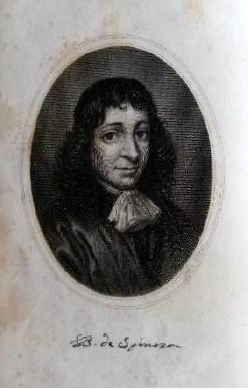
(30) Sämmtliche Werke. Aus dem Lateinischen mit einer Lebensgeschichte Spinoza's von Berthold Auerbach. Zweite, sorgfältig durchgesehene und mit den neu aufgefundenen Schriften vermehrte Auflage.
Stuttgart, J.G. Cotta'schen Buchhandlung 1871.
2 volumes. LXIV,[2],563; [IV],570p. With an engraved portrait by V. Froer. Contemp. half vellum, gilt backs with red label, marbled sides and endpapers.
Second revised edition edited by B. Auerbach. This edition has been enlarged with the Kurzgefasste Abhandlung von Gott, translated from the only recently discovered Dutch text, a contemporary translation from Spinoza's original Latin text. The translations of the Latin texts have been corrected with the help of C. Schaarschmidt and the biographical part has been revised and enlarged with the help of material published since the first edition of 1841.
*Wolf 1306. SB 341.
(31) Trattato teologico-politico. Tradotto dal testo Latino per Carlo Sarchi. Milano, tipografia di Lodovico Bortolotti 1875.
XLII,[2],368,[1]p. Uncut in orig. printed wrappers. Some quires browned.
First Italian edition of the Tractatus theologico-politicus.
Spinoza's life and work, by friends and opponents
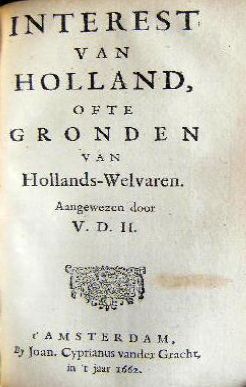
(32) [LA COURT, Pieter de (1618- 1685)] Interest van Holland, ofte gronden van Hollands-welvaren. Aangewezen door V.D.H.
Amsterdam, J.C. vander Gracht 1662.
Small 8vo. [XVI],267,[5]p. Contemp. overlapping vellum, back with ms. title ('Holland').
One of various issues of the original edition, all published by the same printer and to be distinguished by small typographical differences only. Pieter and his brother Johan de la Court (1622-1660) were the major political and economic theorists of the Dutch Republic. Their work, inspired by Machiavelli and Hobbes, has been seen as the ideological basis of the republican government of Johan de Witt.
There is general agreement that the work of the brothers exercised a profound influence on the political philosophy of Spinoza. Spinoza had two of their books in his library: Consideratien van staat, ofte politike weeg-schaal (Servaas van Rooijen 8vo 11) and Politike discoursen (Servaas van Rooijen 4to 11).
The present work is the best known of the brothers, with translations into English, French and German that went through several editions. It emphasizes on the economic aspects of republican government, with a strong plea for free competition. It is assumed that Johan de Witt contributed two chapters to it. A second much enlarged edition appeared 1669 under the title Aanwysing der heilsame politike gronden en maximen van de Republike van Holland en West-Vriesland.
Pieter de la Court has also been named as the author of the pseudonymous 'Spinozistic' treatise De jure ecclesiasticorum, for a long time held for Spinoza's own work, and even in 1843 included in Riedel's edition of the philosophical works of Descartes and Spinoza.
*Wildenberg 1041.
Preceded by: [Pieter de LA COURT] Historie der gravelike regeering in Holland, beschreven door V.H. Waer by is gevoegd de Oorsprong der Nederlandse troublen wel eer beschreven door Viglius ... [No place 1662.] [XVI],264p. With engraved title.
*Wildenberg 1052.
And by: [Johan UYTENHAGE DE MIST (1636- 1684)] De stadthouderlijcke regeeringe in Hollandt ende West-Vrieslandt ... Mitsgaders een korte verhandelinge van de nootsaeckelickheyt ofte den ondienst van des stadthouders hooge ampten ... Amsterdam, J.C. van der Gracht 1662. 110,[1 errata]p.
*Wildenberg 1071 variant.
(33) [BALLING, Pieter (- 1669)] Verdediging van de regering der Doopsgezinde Gemeente, die men de vereenigde Vlamingen, Vriezen, en Hoogduytsche noemt, binnen Amsterdam. Zijnde een wederlegging van het zoo genoemde Nootwendig bericht, &c.
Amsterdam, Jan Rieuwertsz. 1663.
4to. [IV],60p. Unbound. Blind stamp and old name on title.
First (only) edition. Pieter Balling was together with Simon Joosten de Vries and Jarig Jelles among Spinoza's best Amsterdam friends. He is best known for his work Het licht op den kandelaar, anonymously published the previous year and again in 1684 as a supplement to Jarig Jelles' Belydenisse des algemeenen en christelyken geloofs, identified as a Spinozist tract. He is also known as the translator into Dutch of Spinoza's book on Descartes.
Balling was an active member of the Mennonite community in Amsterdam. With the present pamphlet, published by Spinoza's publisher Jan Rieuwertsz he sided with the liberal Lamists, followers of Abraham Galenus in the conflict with the conservative Zonists, followers of Samuel Apostool.
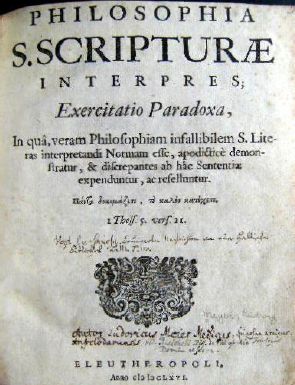
(34) [MEYER, Lodewijk (1629-1681)] Philosophia S. Scripturae interpres; exercitatio paradoxa, in quâ, veram philosophiam infallibilem S. Literas interpretandi Normam esse, apodicticè demonstratur, & discrepantes ab hâc Sententiae expenduntur, ac refelluntur.
Eleutheropoli [Amsterdam, Jan Rieuwertsz] 1666.
4to. [XII],105,[11]p. Later half calf, back rubbed, red edges. Stamp on verso title, modern bookplate to front paste down. Some annotations and underlinings, touched by the binder's knife when rebound. An old hand added on the title: 'Autor Ludovicus Meier Medicus, Spinosae amicus Amstelodamensis', another hand added some bibliographical references.
First edition. A famous treatise by one of Spinoza's closest friends, at the time thought to have been written by Spinoza himself, and in 1673 and 1674 reprinted together with Spinoza's Tractatus. The authorship of Meyer was revealed by his friends shortly after his death.
Meyer was a Cartesian physician, playwriter and lexicographer. He here argues that the Bible should be understood through human reason and interpreted philosophically. Not surprisingly the publication of the book created a scandal and it was forbidden on 19 July 1674, together with Spinoza's Tractatus and Hobbes' Leviathan. A Dutch translation was published in 1667 and a new edition more than a century later.
*Van der Linde 56. Wolf 426. Bamberger 3. Spinozahuis /349. Knuttel 309.
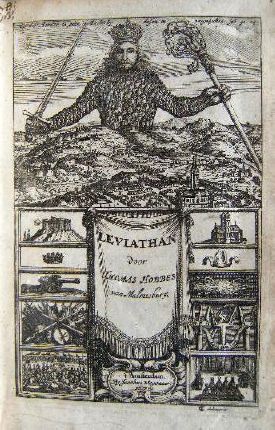
(35) HOBBES, Thomas (1588-1679) Leviathan: of van de stoffe, gedaente, ende magt van de kerckelycke ende wereltlycke regeeringe. Amsterdam, Jacobus Wagenaar 1667 [engraved title] 1672.
Small 8vo. [XVI],744,[64]p. With engraved title, portrait and folding table. Contemp. vellum, back with ms. title. Mild browning throughout; small corner of engraved title torn without loss of printed surface.
First Dutch edition, second issue. The translation has long been attributed to Spinoza's friend Lambert van Velthuysen, yet recently to Abraham van Berckel (or Berkel). Van Berckel was another friend of Spinoza, a theologian and physician, and an ardent republican and freethinker. He was also intimate with Adriaan Koerbagh, for whom he tried to find a printer for his book Een ligt schijnende in duystere plaatsen. The book was forbidden by the States of Holland 19 July 1674, together with Spinoza's Tractatus and Lodewijk Meyer's Philosophia S. Scripturae interpres.
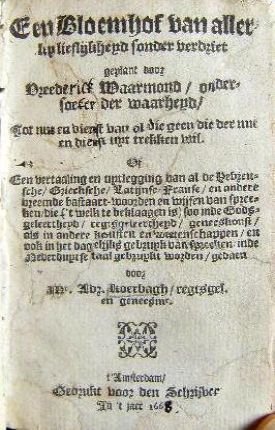
(36) KOERBAGH, Adriaan (c.1632-1669) Een bloemhof van allerley lieflijkheyd sonder verdriet geplant door Vreederijk Waarmond, ondersoeker der waarheyd ... of een vertaaling en uytlegging van al de Hebreusche, Griecksche, Latijnse, Franse, en andere vreemde bastaart-woorden en wijsen van spreeken, die ('t welke te beklaagen is) soo inde godsgeleertheyd, regtsgeleertheyd, geneeskonst, als in andere konsten en weetenschappen, en ook in het dagelijks gebruyk van spreeken, inde Nederduytse taal gebruykt worden.
t'Amsterdam, Gedrukt voor den Schrijver 1668.
Small 8vo. [XVI],672p. Contemp. vellum. Title leaf once torn, now underlaid with loss of a few letters. Some browning and staining. On front endpaper and two blanks early annotations in ink.
Reissue of the extremely rare first edition. A famous dictionary of loan words used in theology, jurisprudence, medicine, etc., with explanations openly rationalistic and anti-Christian. A reckless venture, written in the vernacular, that presented its author, close to Spinoza and Franciscus van den Enden, ten years imprisonment in the Amsterdam rap-house. He died within a year.
An interesting copy with on the front endpaper and two blanks early annotations in ink, including references to a hitherto unrecorded source (Zodiacus Mercurialis, 1668), and a few passages with apparent aproval underlined.
The first issue appeared the same year, with imprint Leiden, gedrukt voor Goedaart onderwijs and without the author's name on the title.
*Wolf 668. Bamberger 5. Spinozahuis 363/341. Knuttel 209.
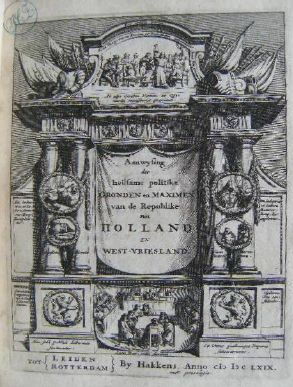
(37) [LA COURT, Pieter de (1618- 1685)] Aanwysing der heilsame politike gronden en maximen van de Republike van Holland en West-Vriesland.
Leiden & Rotterdam, Hakkens 1669.
4to. [XLIV],523,[1 errata]p. With engraved title. Contemp. calf, back richly gilt, red sprinkled edges.
First edition of the revised and considerably enlarged version of the Interest van Holland (1662). A privilege for the printer was granted by the States of Holland on 10 December 1668, in spite of some trouble with the church council of Leiden after the publication of the Interest. Yet only a few months later on 28 May 1669 the privilege was withdrawn and the book was forbidden by the synod of South Holland because its contents was 'offensive and injurious for the Ministers of the Gospel'.
*Wildenberg 1111. Knuttel 4.
(38) WOLZOGEN, Lodewijk (1633-1690) Jugemens de plusieurs professeurs & docteurs en theologie, qui prononcent orthodoxe le livre de Louys de Wolzogue de l'Interprete de l'Ecriture. Advysen van verscheyde professoren en doctoren in de theologie, die het boeck van Lodewyck Wolzogen van de Uytlegger der Schrift orthodox verklaren.
Utrecht, Joannes Ribbius 1669.
4to. [64],77p. Modern half cloth, marbled sides, back lettered gilt.
First (only) edition, printed in double columns French/Dutch. Wolzogen, a protestant theologian from Middelburg and Cartesio-Cocceian professor at the university of Utrecht, had published a refutation of Lodwijk Meyer's Philosophia S. Scripturae interpres, at the time usually attributed to Spinoza, with the title De scripturarum interprete adversus exercitatorem paradoxum libri duo. His refutation however was considered full of dangerous and Socinian views by some orthodox theologians, a work 'worse than Meyer's book'.
Among his opponents were the the chiliastic preacher Jean de Labadie and his follower Pierre Yvon.
In the the first part of this volume Wolzogen defends himself against these accusations, referring to several theologians, who had judged his book orthodox, among which were Maresius, Heidanus and Cocceius. The second part relates De Labadie's conflict with the Walloon synod of Middelburg that resulted in his dismissal.
(39) Appendix van 't catalogus van de boecken van Mr. Jan de Wit, bestaende in een partye curieuse en secrete manuscripten. Welcke verkocht sullen werden op de Zael van 's Gravenhage, maendagh den 5 July 1672 en de volgende dagen.
De Catalogus sijn te bekomen in den Haegh, by de druckers van de Historie van Wicquevoort [1672].
4to. 8p. Browned.
A sequel to the catalogue of the fictitious library of the Grand Pensionary of Holland Johan de Witt, one of many pamphlets in which he and his brother Cornelis were attacked. It lists 38 mostly non existent manuscripts or books. Item 33 is the Tractatus, 'by the apostate Jew, forged with the Devil in Hell, and published with the knowledge of Mr Jan and his accomplices'. One of at least two issues differing only in the date of the forthcoming 'auction'.
*Wolf 745.
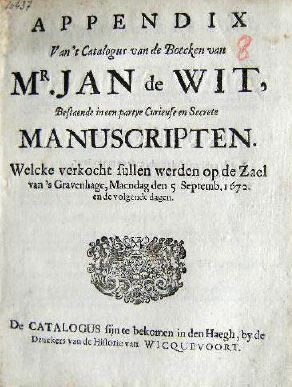
(40) Appendix van 't catalogus van de boecken van Mr. Jan de Wit, bestaende in een partye curieuse en secrete manuscripten. Welcke verkocht sullen werden op de Zael van 's Gravenhage, maendagh den 5 Septemb. 1672 en de volgende dagen.
De Catalogus sijn te bekomen in den Haegh, by de druckers van de Historie van Wicquevoort [1672].
4to. 8p.
A sequel to the catalogue of the fictitious library of the Grand Pensionary of Holland Johan de Witt, one of many pamphlets in which he and his brother Cornelis were attacked. It lists 38 mostly non existent manuscripts or books. Item 33 is the Tractatus, 'by the apostate Jew, forged with the Devil in Hell, and published with the knowledge of Mr Jan and his accomplices'. One of at least two issues differing only in the date of the forthcoming 'auction'.
*Wolf 745. Bamberger 10 or 11.
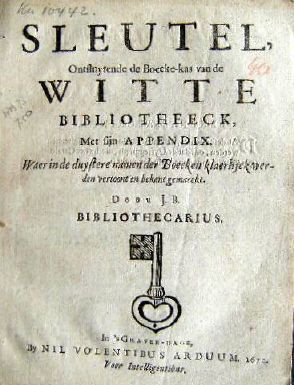
(41) Sleutel, ontsluytende de boecke-kas van de Witte bibliotheeck, met sijn appendix. Waer in de duystere namen der boecken klaerlijck werden vertoont en bekent gemaeckt. Door J.B. Bibliothecarius.
In 's Graven-Hage, by Nil Volentibus Arduum, voor Intelligentibus 1672.
4to. 16p. With a woodcut of a key on the title. Disbound.
A 'key' to the catalogue of the fictitious library of the Grand Pensionary of Holland Johan de Witt, one of many pamphlets in which he and his brother Cornelis were attacked.
The Appendix to that catalogue lists the Tractatus, 'by the apostate Jew, forged with the Devil in Hell, and published with the knowledge of Mr Jan and his accomplices'. The present publication elaborates on the Tractatus: 'By the apostate Jew Spinoza, brought forth out of hell, wherein in an unheard Atheists manner [sic] is proved, that God's word must be interpreted and understood by Philosophy, which has been publicly printed with the knowledge of Mr Jan'.
*Van der Linde 62. Bamberger 13.
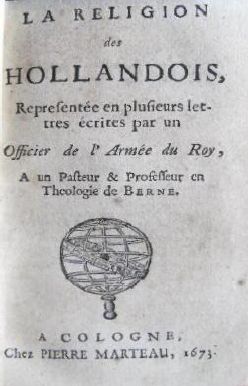
(42) [STOUPPE, Jean Baptiste (c.1620-1700)] La religion des Hollandois, representée en plusieurs lettres écrites par un officier de l'armée du Roy, a un pasteur & professeur en theologie de Berne.
A Cologne, chez Pierre Marteau [Amsterdam or Utrecht] 1673.
12mo. 242 [i.e. 142]p. With sphere on title. Modern calf antique, gilt back with red label.
One of three (?) editions from the same year. Stouppe - also written as Stouppa, Stoppa, Stoppe, Stuppa, Stoupe, Strapo, etc. - was a Swiss general in the service of Louis XIV and commander of the French troops occupying Utrecht in 1673. His book includes various references to Spinoza, valuable since he had met Spinoza various times during the latter's visit to Utrecht in the summer of 1673. This volume was written as an answer to a Swiss protestant who had blamed Stouppe for lending his services to a catholic monarch to suppress a protestant nation. Stouppe here shows that, though Holland was said to be an orthodox protestant nation, in fact a great variety of religious opinions existed, including Catholics, Lutherans, Arminians, Quakers, Libertines, Socinians, Praeadamites, etc. etc. Also published with identical imprint but without sphere on the title. Willems suggests that that is the original edition, but he adds that the present edition, printed at Amsterdam, is nicer and printed on better paper. It was also translated into Dutch, English and German.
*Van der Linde 63. Wolf 335. Bamberger 15. Willems 1878.
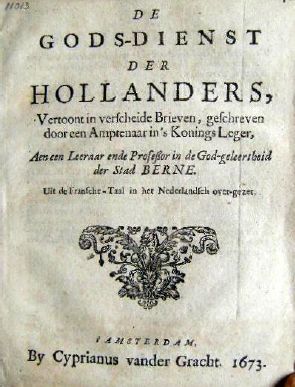
(43) [STOUPPE, Jean Baptiste (c.1620-1700)] De gods-dienst der Hollanders, vertoont in verscheide brieven, geschreven door een amptenaar in 's konings leger, aen een leeraar ende professor in de god-geleertheid der stad Berne. Uit de Fransche-taal in het Nederlandsch over-gezet. Amsterdam, Cyprianus vander Gracht 1673.
4to. 48p. Disbound. Browned.
First Dutch edition of La religion des Hollandois.
*Van der Linde 64. Bamberger 16.
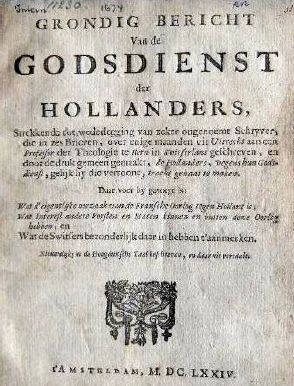
(44) Grondig bericht van de godsdienst der Hollanders, strekkende tot wederlegging van zeker ongenoemt schryver, die in zes brieven, over enige maanden uit Uitrecht aan een professor der theologie te Bern in Switserlant geschreven, en door de druk gemeen gemaakt, de Hollanders, wegens hun godsdienst, gelijk hy die vertoont, tracht gehaat te maken ...
Nieuwelijks in de Hoogduitsche taal beschreven, en daar uit vertaalt.
t'Amsteldam 1674.
4to. [II],38p.
First (only) Dutch edition of the anonymously published Annehmlicher Discurs, von der Holländer Religion of the same year. A refutation of Stouppe's La religion des Hollandois of the previous year. The author among other things rejects Stouppe's view that the Dutch tolerated Spinoza's writings, since 'the States General have publicly forbidden his book [the Tractatus] and several theologians have already before the war started to refute it' (p.36).
*Van der Linde 66. Bamberger 18. Spinozahuis /222. SB 9646 (German edition).
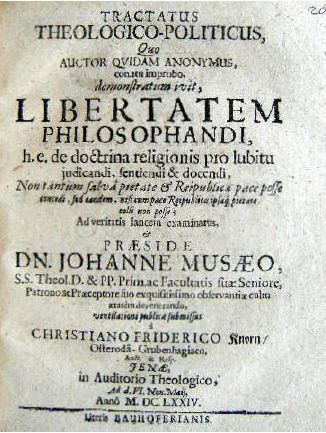
(45) MUSAEUS, Johannes (1613- 1681) & Christian Friedrich KNORN (1646 - 1704) Tractatus theologico-politicus, quo auctor quidam anonymus, conatu improbo, demonstratum ivit, libertatem philosophandi, h.e. de doctrina religionis pro lubitu judicandi, sentiendi & docendi, non tantùm salvâ pietate & reipublicae pace posse concedi, sed eandem, nisi cum pace reipublicae ipsaque pietate tolli non posse; Ad veritatis lancem examinatus, & praeside Dn. Johanne Musaeo ... ventilationi publicae submissus à Christiano Friderico Knorn ... Jena, Literis Bauhoferianis [J.J.Bauhöfer] 1674.
4to. [VIII],96,[8]p. Modern boards.
First edition of one of the earliest refutations of Spinoza's Tractatus. Johannes Musaeus was a Lutheran theologian and professor in Jena, also known for an earlier attack on Herbert of Cherbury. Though not mentioned on the title Spinoza's name appears on the first page of this university disputation.
A new edition with a different title ('Spinosismus, hoc est, tractatus theologico-politicus, quo Benedictus Spinoza, conatu improbo, demonstratu ivit, libertatem philosophandi') appeared 1708. Van der Linde notes that 'this polemic was among Spinoza's books' but it does not appear in Servaas van Rooijen's inventory.
*Van der Linde 362. SB 6540.
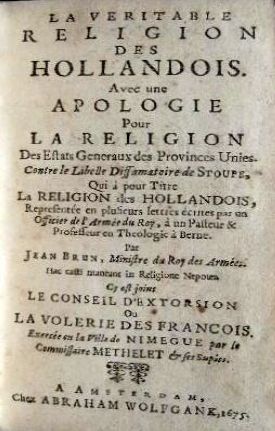
(46) BRUN, Jean (1631-1708) La veritable religion des Hollandois. Avec une apologie pour la religion des Estats Generaux des Provinces Unies. Contre le libelle diffamatoire de Stoupe, qui a pour titre La religion des Hollandois ...
A Amsterdam, chez Abraham Wolfgank 1675.
12mo. [XL],392p. Contemp. overlapping vellum.
First (only) edition. The author, also quoted as Johannes Braun, was a minister in Nijmegen and later professor of theology in Groningen. He here defends Dutch religion against Stouppe's notorious pamphlet published in 1673, with several references to Spinoza. This book is usually found bound with another work, quoted on the title page but here not present, yet without Spinoza interest.
*Van der Linde 67. Bamberger 22. Spinozahuis 187/223.
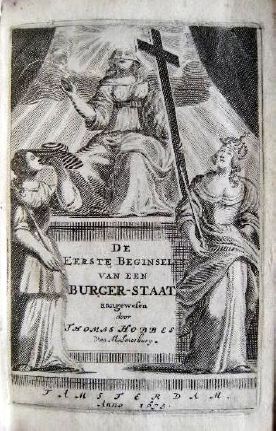
(47) HOBBES, Thomas (1588-1679) De eerste beginselen van een burger-staat, aangewesen door Thomas Hobbes van Malmesbury.
Amsterdam 1675.
Small 8vo. [XVI],536p., p.113-116 omitted in pagination, thus complete. With engraved title and portrait. Contemp. vellum. Few quires browned as usual.
First Dutch edition of De cive (1642), translated by Abraham van Berckel. Neither translator nor publisher are stated on the title, probably to avoid persecution as the Dutch edition of Hobbes' Leviathan was prohibited the previous year. This book indeed escaped that ban. Spinoza had a copy of a Latin edition in his library.
*Not in Macdonald & Hargreaves.
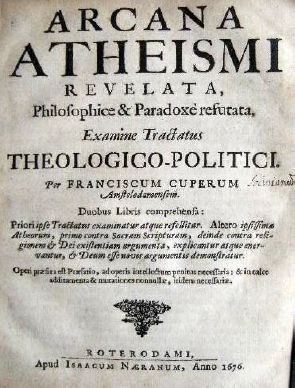
(48) CUPERUS, Franciscus or Frans KUYPER (1629-1691) Arcana atheismi revelata, philosophice & paradoxè refutata, examine Tractatus theologico-politici. Duobus libris comprehensa: Priori ipse Tractatus examinatur atque refellitur. Altero ipsissima atheorum, primo contra Sacram Scripturam, deinde contra religionem & Dei existentiam argumenta, explicantur atque enervantur, & Deum esse novis argumentis demonstratur.
Roterodami, apud Isaacum Naeranum
[Rotterdam, Isaac Naeranus] 1676.
4to. [XVI],304p. New blank wrappers.
First (only) edition. One of the earliest refutations of Spinoza's Tractatus. Cuperus had studied at the Remonstrant Seminary in Amsterdam and was for a short period preacher at Vlaardingen. He then moved to Amsterdam and became printer of Socinian books. He acquired some fame as the publisher of the Bibliotheca Fratrum Polonorum, forbidden by the States of Holland in 1674.
Though highly critical towards Spinoza Cuperus was nevertheless accused of Spinozistic sympathies. He was a member of the Collegiants, but his 'capricious, unreliable and false' character brought him into conflict with many of them, especially with another Spinoza critic Johannes Bredenburg, whom he in turn accused of Spinozism. This debate is now considered as the first public debate about Spinoza's philosophy.
*Van der Linde 365. Wolf 640. Bamberger 24. SB 7103.
(49) STILLINGFLEET, Edward (1635-1699) Defense de la religion chretienne, et de l'ecriture sainte, contre les deistes.
Paris, Estienne Lucas 1681.
Small 8vo. [XX],221,[1]p. Contemp. vellum.
First French edition of Stillingfleet's Letter to a deist, translated and with a preface by J.B. de Rosemond.
*Bamberger 27 (first English edition of 1677).
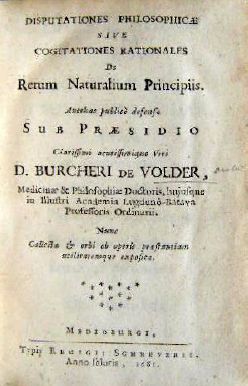
(50) VOLDER, Burchard de (1643- 1709) Disputationes philosophicae sive cogitationes rationales de rerum naturalium principiis. Antehac publicè defensae sub praesidio ... Burcheri de Volder ...
Medioburgi [Middelburg], typis Remigii Schreverii 1681.
Small 8vo. [VIII],168p.
Bound with: Quaestiones academicae de aëris gravitate. Medioburgi, typis viduae Remigii Schreverii 1681. [IV],58p.
And with: Disputationes philosophicae omnes contra atheos. Medioburgi, apud Johannem Lateranum 1685. 55p.
And with: Exercitationes academicae, quibus Ren. Cartesii philosophia defenditur adversus Petri Danielis Huetii ... Censuram philosophiae Cartesianae. Amstelaedami [Amsterdam], apud Arnoldum van Ravestein 1695. [VI],170,120p.
4 volumes in 1. Contemp. vellum. Last part of the third work and greater part of the fourth work browned. Old engraved bookplate to front paste-down.
A very rare volume containing four collections of academic orations and disputations. Burchard de Volder, supporter of Cartesianism, was appointed professor of natural philosophy in Leiden in 1670, a position he had acquired at the recommendation of the famous Johannes Hudde. In 1675 he was charged with the direction of the newly established physics laboratory (Theatrum Physicum), and shortly afterwards he also started teaching mathematics. Though an important figure in the scientific world, corresponding with Leibniz, Newton, Huygens and many others, the only works published with his name, at least partly against his will, are academic orations and disputations.
It has been a source of speculation that he never published a book of his own because his views were to close to Spinoza to be openly exposed. Accusations of Spinozistic feelings circulated, repeated as late as 1719 by Ruardus Andala. De Volder was known to have had personal contact with Spinoza.
*Bamberger 62 (third work).
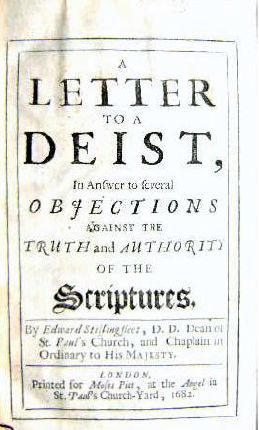
(51) STILLINGFLEET, Edward (1635- 1699) A letter to a deist, in answer to several objections against the truth and authority of the Scriptures. London, printed for Moses Pitt 1682.
Small 8vo. [VI],135,[9 publ. cat.]p. Contemp. calf, rebacked, red edges, somewhat rubbed, hinges strengthened, bookplate to verso of title. Worm hole in inner corner of prelims not affecting text.
Second edition, probably a new issue of the first edition of 1677 (the publisher's catalogue at the end does not list any title after 1677). Edward Stillingfleet, dean of St. Paul's and well- known controversialist, here presents an attack on English deism that includes a refutation of Spinoza's Tractatus. Though he does not mention Spinoza's name and only refers to 'a late author [who] I hear is mightily in vogue among many, who cry up any thing on the atheistical side', a (printed) marginal note unveils the title of the book of this incriminated author: 'Tractat. theol. politic'. The author also refers, self-evidently with repugnance, to a forthcoming translation of this book into English, which hoever did not appear before 1689.
*Bamberger 27 (edition of 1677).
(52) [ABBADIE, Jacques (1654-1727)] Traité de la vérité de la religion chrétienne.
Rotterdam, Reinier Leers 1684.
2 volumes. [XXIV],517; 418,[5]p. Contemp. vellum, backs with ms. title.
First edition. A 'masterwork of Christian apologetics' and the most comprehensive defence of the Protestant religion of his time. Several chapters are dedicated to Spinoza (volume 1, p.284-373: 'Où l'on répond aux objections que Spinosa fait contre les livres de Moïse', etc.). Bamberger calls it 'the first attempt of a massive and systematic refutation of Spinoza's Bible criticism by a Protestant theologian'.
Abbadie studied theology at the Protestant university of Sedan and became minister of the French church at Berlin. He moved to England in 1688 where he served as a chaplain of the French church in London and then moved to Ireland. This is his most important book, many times reprinted and translated into various languages.
*Van der Linde 358 note. Bamberger 49.
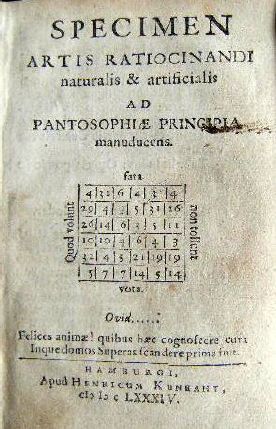
(53) [CUFFELER or KUFFELER, Abraham Johannes (c.1637 -1694?)] Specimen artis ratiocinandi naturalis & artificialis ad pantosophiae principia manuducens. [Followed by:] Principiorum pantosophiae pars secunda. Exhibens vias quas corpus motum describit, & inde ortas proprietates, nulla habita ratione vicinorum corporum, aut medii per quod transfertur corpus motum. [And by:] ... pars tertia. Exhibens effectus quos corpora mota in se invicem producunt. Et primo de depressione corporum versus terrae centrum.
Hamburgi, apud Henricum Kunraht [Amsterdam, Jan Rieuwertsz] 1684.
3 volumes in 1. Small 8vo. [XXVIII],258,[1], [II],229, [X],140p. With 12 folding plates at end. Contemp. vellum. Vaguely waterstained in lower outer corner throughout. Without the portrait added to a few copies only.
First (only) edition. Abraham Cuffeler, a jurist at the Court of Holland, was one of Spinoza's best friends and a dedicated adherent of his philosophy. The present volume is an attempt to develop a whole body of philosophy on the basis of Spinozistic ideas. Though the project remained unfinished, the present volumes includes logic, physics and mathematics only, it is the most comprehensive contribution to the application of Spinozism to science. The impressum, identical to that of the various issues of Spinoza's Tractatus, clearly unveils the author's indebtness to Spinoza. Very rare.
*Van der Linde 151. Bamberger 50. Spinozahuis 192/225.
(54) SALDENUS, Guilielmus (1627-1694) Otia theologica, sive exercitationum subcisivarum, varii argumenti, libri quatuor. Adjecti sunt indices necessarii.
Amstelodami [Amsterdam], apud Henricum et viduam Theodori Boom 1684.
4to. [XLII],822,[56]p. With a fine engraved title showing the author (?) working at his desk in his library. Nineteenth century cloth-backed boards. Two modern bookplates on front endpaper, stamp to lower edge.
First (only) edition. A stout volume of miscellaneous pieces by a Dutch Voetian theologian. The second piece De autore Pentateuchi (p.18-36) includes an early refutation of Spinoza's Tractatus. Bamberger notes that the author 'has carefully studied' that book.
*Van der Linde 358 note. Bamberger 51.
(55) [AUBERT DE VERSE, Noel (c.1645-1714)] L'Impie convaincu, ou dissertation contre Spinosa. Dans laquelle l'on refute les fondemens de son atheisme. L'on trouvera dans cet ouvrage non seulement la refutation des maximes impies de Spinosa, mais aussi celle des principales hypotheses du Cartesianisme, que l'on fait voir être l'origine du Spinosisme.
Amsterdam, Jean Crelle 1685.
Small 8vo. [XII],274,[1 errata]p. Contemp. overlapping vellum. Wormhole in inner margin of last leaf and endpaper, not affecting text; moderately browned throughout.
First (only) edition, second issue (an earlier issue was dated 1684). An early refutation of Spinoza's 'atheism' and Cartesian philosophy, according to the author 'the source of Spinozism', though some authors suspected Aubert of hidden Spinozistic sympathies. A first part constitutes a 'refutation of the fundaments of his atheism', the second part treats 'the idea that we have of God, against Descartes', and the third part is directed against Malebranche. At the end a Latin letter, printed in a smaller type, to an (unnamed) friend on 'the origin of Spinozian unbelief'.
Aubert de Versé had studied medecine and theology in Paris, became protestant, and fled to Holland about 1679. Appointed minister in Amsterdam he was soon accused of Socinian heresy and dismissed by the church council. He established a medical practice in Amsterdam and also started a career as a prolific writer and polemist. He was an ardent advocate of religious tolerance and involved in a vigorous controversy with Pierre Jurieu, known for his orthodox and intolerant opinions. In 1689 he returned to France, revoked his protestant views, reentered the catholic church, and wrote a number of books against his former protestant friends.
*Van der Linde 301 (dated 1684). Wolf 738 (and 737 dated 1684). Bamberger 61. Spinozahuis 193/226.
(56) [MALEBRANCHE, Nicolas (1638-1715)] Trois lettres de l'auteur de la Recherche de la vérité touchant la defense de Mr. Arnauld contre la Réponse au livre des vrayes & fausses idées.
Rotterdam, Reinier Leers 1685.
12mo. 280,[1 errata]p. Contemp. vellum.
First (only) edition. Antoine Arnauld had attacked Malebranche's De la recherche de la vérité (1674) in his Des vrayes et des fausses idées (1683). Malebranche answered the next year in his Réponse au livre de Mr. Arnauld. Arnauld responded the same year in his Défense contre la réponse, in which he accused Malebranche of Spinozism. In the present Trois lettres Malebranche refutes these accusations.
*Bamberger 56.
Second much enlarged edition, expanded with an appendix refuting Spinoza: Fundamenta atheismi eversa, sive specimen absurditatis atheismi Spinoziani, &c (p.719-808). The first edition of this, a volume of 300 pages only, appeared in 1677 and 'closely followed the orthodox line of Cartesian philosophy'. In the present second edition Spinoza's rationalist philosophy is Poiret's main target.
Pierre Poiret was a French Cartesian theologian and philosopher who became a mystic under the influence of Antoinette Bourignon.
*Van der Linde 382. Wolf 900 (third edition of 1715). Bamberger 57. Spinozahuis 194/227.
Pierre Poiret was a French Cartesian theologian and philosopher who became a mystic under the influence of Antoinette Bourignon.
*Van der Linde 382. Wolf 900 (third edition of 1715). Bamberger 57. Spinozahuis 194/227.
(58) DECKHERR, Johann. De scriptis adespotis, pseudepigraphis, et supposititiis conjecturae, cum additionibus variorum. Editio tertia altera parte auctior.
Amstelaedami [Amsterdam], apud Isbrandum Haring 1686.
12mo. [XII],411,[17]p. Contemp. calf, back worn. Old engraved bookplate to front paste-down.
A work on anonymous and pseudonymous literature, a supplement to Placcius De scriptis et scriptoribus anonymis atqve pseudonymis syntagma. Spinoza's Tractatus and Opera posthuma are treated on p.331-334. At the end a letter from Pierre Bayle with corrections to Deckherr's work, including (p.387-388) a correction on the authorship of the preface of the Opera posthuma.
*Van der Linde 148,XVIII. Bamberger 63. SB 996.
Bound with: Christianus LIBERIUS [i.e. Guilielmus SALDENUS] Bibliophilia [in Greek] sive de scribendis, legendis & aestimandis libris exercitatio paraenetica ... Ultrajecti [Utrecht], apud Franciscum Halma 1681. 196p.
(59) [BIDLOO, Govard (1649-1713)] Tweede extract uyt de politijcque conferentien, gehouden op Parnassus.
No place, no publisher [1690].
4to. 15p. Disbound.
A fictious discussion at the occasion of a dispute on the election of magistrates between the city of Amsterdam and stadholder William III. Among the participants of the discussion are De La Court, Machiavelli, Hobbes, and Spinoza.
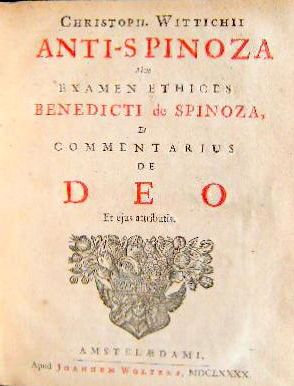
(60) WITTICHIUS, Christophorus (1625- 1687) Anti-Spinoza sive examen ethices Benedicti de Spinoza, et commentarius de Deo et ejus attributis.
Amstelaedami [Amsterdam], apud Joannem Wolters 1690.
4to. XIV,424p. Contemp. overlapping vellum, back with ms. title.
First (only Latin) edition. One of the most important refutations of Spinoza, though the author was (posthumously) accused of having written it as a defence of Spinoza in the guise of a refutation. A Dutch translation appeared 1695. Wittichius was a theologian and mathematician and Cartesio-Cocceian professor in Leiden.
*Van der Linde 384. Wolf 753. Bamberger 83. Spinozahuis 196/230. SB 6548
(61) BEKKER, Balthasar (1634-1698) De betoverde weereld, zynde een grondig ondersoek van 't gemeen gevoelen aangaande de geesten, deselver aart en vermogen, bewind en bedrijf: als ook 't gene de menschen door derselver kraght en gemeenschap doen. In vier boeken ondernomen.
Amsterdam, Daniel van den Dalen 1691-93.
4 parts in 1 volume. 4to. [XVI],138,[6]; [VIII],262,[2]; [VIII],188,[2]; [VI],277,[3]p. With a woodcut of a drinking horn in the fourth part. Each part with the signature of the author. Contemp. blind stamped calf, spine ends slightly damaged.
First authorized edition, enlarged with a third and fourth part. A famous and highly influential book against witchcraft, sorcery and magic, translated into French, German and English. It was considered heretical and severely attacked by orthodox theologians and forbidden by the States of Utrecht in 1692. Bekker, a Cartesian minister from Amsterdam, was repeatedly accused of Spinozistic sympathies.
*Wolf 759. Bamberger 84. Spinozahuis 327/281. Knuttel 53.
(62) [DUIJKERIUS, Johannes (1661/2-1702)] Het leven van Philopater, opgewiegt in Voetiaensche talmeryen, en groot gemaeckt in de verborgentheden der Coccejanen. Een waere historie. [Followed by:] Vervolg van 't leven van Philopater. Geredded uit de verborgentheeden der Coccejanen, en geworden een waaragtig wysgeer. Een waare historie.
Tot Groeningen, voor Siewert van der Brug, in de Waerheyd [Amsterdam, Aart Wolsgrein] 1691-97.
2 volumes in 1. 12mo. [XVI],221p., wanting leaf C3; 12,292p. Contemp. vellum. Fine copy.
First editions. The two famous Philopater-novels. The first novel describes the fight of the author's protagonist (very much similar to the author) against the orthodox calvinism of Voetius and Coccejus, with some references to Spinoza and his followers. In the more important second volume Spinoza's ideas are clearly expressed in a more popular way. 'We find in this book, without any doubt, a rather pure tradition from Spinoza's most intimate circle of friends on the true meaning of difficult points in his teaching' (Dunin- Borkowski quoted by Bamberger). The book was severely prosecuted and forbidden by the Court of Holland in 1698. It brought its publisher - and perhaps co-author - 8 years imprisonment in the rasp-house, a fine of 3000 guilders and 25 years of banishment.
*Van der Linde 72 & 73. Wolf 643. Bamberger 85. Spinozahuis 197/231 & 235.
Preceded by: [DUIJKERIUS, Johannes (1661/2- 1702) or Cornelis BONTEKOE (1647-1685)] Verhael, van een wonderlijck gesicht, dat eenige dagen geleden een fijn-man gehadt heeft, meynende Christus met sijn apostelen en veele engelen en zielen op een olijf-berg gesien te hebben, rakende Cocceanerye, Cartesianerye, en in't besonder d'ontrouw van de classis van Seven-Wouden. Gedruckt na de copye, in Nieuw-Stad, by Neotericus Detertors [c.1684]. 177p.
First (only) edition, one of various (?) issues.
*Van der Linde 74. Spinozahuis 198 & 199 (describing two issues with slight variations in the title, our copy shows other variations)/232 & 233 (id.).
*Van der Linde 72 & 73. Wolf 643. Bamberger 85. Spinozahuis 197/231 & 235.
Preceded by: [DUIJKERIUS, Johannes (1661/2- 1702) or Cornelis BONTEKOE (1647-1685)] Verhael, van een wonderlijck gesicht, dat eenige dagen geleden een fijn-man gehadt heeft, meynende Christus met sijn apostelen en veele engelen en zielen op een olijf-berg gesien te hebben, rakende Cocceanerye, Cartesianerye, en in't besonder d'ontrouw van de classis van Seven-Wouden. Gedruckt na de copye, in Nieuw-Stad, by Neotericus Detertors [c.1684]. 177p.
First (only) edition, one of various (?) issues.
*Van der Linde 74. Spinozahuis 198 & 199 (describing two issues with slight variations in the title, our copy shows other variations)/232 & 233 (id.).
(63) BEKKER, Balthasar (1634-1698) Die bezauberte Welt: oder eine gründliche Untersuchung des allgemeinen Aberglaubens, betreffend die Arth und das Vermögen, Gewalt und Wirckung des Satans und der bösen Geister über den Menschen, und was diese durch derselben Krafft und Gemeinschaft thun ... Aus dem Holländischen nach der letzten vom Authore vermehrten Edition. In die Teutsche Sprache übersetzt.
Amsterdam, Daniel von Dahlen 1693.
4to. 39,[1],136,270,[2],179,[=195],[3],308,[5]p. With woodcut portrait on title, engraved plate of the 'Oldenburg horn' (opposite part 4, page 146), and an added full-page engraved portrait mounted to first free endpaper. Contemp. vellum. Stamp on verso of title. A fine copy.
First German edition of the author's De betoverde weereld. The translation has been attributed to Johann Lange.
*Wolf 760. Bamberger 91.
*Wolf 760. Bamberger 91.
(64) TIL, Salomon van (1643-1713) Het voor-hof der heydenen, voor alle ongeloovigen geopent, voor alle ongeloovigen geopent, om de selve aldaar door een klare beschouwinge van de betoogde goddelykheyd van Mosis wet- boek tot een eerbiediger ingang in 't heyligdom van Gods wet toe te rusten. [Followed by:] Vervolg op 't voor-hof der heydenen, waar in de grond-stellingen van Mosis wet en wet-boek met de reden- leer werden vereffent, en haar vastigheyd tegen de ongodisten nader tot versterkinge des geloofs betoogt.
Dordregt, Dirk Goris 1694-96.
2 volumes in 1. VIII,394; [X],251,[13]p. Contemp. calf, gilt back and gilt double line borders on both sides, front hinge splitting at ends, some light wear.
First edition. The author was a Cartesian and Cocceian minister and professor at the Illustrious School at Dordrecht, since 1702 professor at the University of Leiden. His present book, translated as Court of the gentiles opened up to all unbelievers, is an attack against atheist denial of the Mosaic authorship of the five books of Moses. It accuses Spinoza and his teacher Franciscus van den Enden for having spread the venom of unbelief in Holland. This book is of particular interest because the author here refers to Spinoza's lost (or never existing) Apology of 1656, here quoted (p.6) as Verantwoordiging [sic] voor sijn [Spinoza's] afwijking van 't Jodendom.
*Van der Linde 358 note. Bamberger 106.
(65) STILLINGFLEET, Edward (1635-1699) Epistola ad deistam, qua ad diversas ejusdem adversus S. Scripturam objectiones solide respondetur ... Andreas Adamus Hochstetterus ex Anglicano in Latinum sermonem convertit lucique publicae ad complurium vota exponi curavit.
Ulmae [Ulm], sumtu Georgii Guilielmi Kühnii 1695.
16mo. 136,[18]p. Contemp. calf, back richly gilt with label. Paperspotted.
First Latin edition of A letter to a deist (1677).
*Bamberger 27 (first English edition).
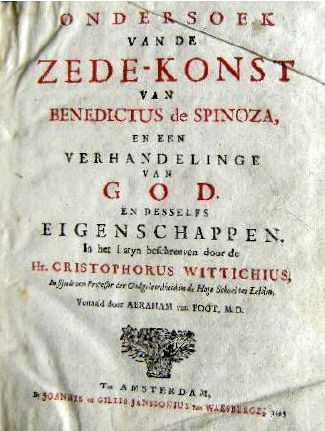
(66) WITTICHIUS, Christophorus (1625-1687) Ondersoek van de zede-konst van Benedictus de Spinoza, en een verhandelinge van God en desselfs eigenschappen. In het Latyn beschreeven ... Vertaald door Abraham van Poot.
Amsterdam, Joannes en Gillis Janssonius van Waesberge 1695.
4to. [XVI],576p., several errors in pagination. Contemp. calf, gilt back.
First (only Dutch) edition, very rare. The original Latin edition (Anti-Spinoza sive examen ethices Benedicti de Spinoza, et commentarius de Deo et ejus attributis) appeared 1690.
*Van der Linde 385. Wolf 754.
(67) [LAMY, François (1636-1711)] Le nouvel atheisme renversé, ou refutation du sistême de Spinosa tirée pour la plûpart, de la conoissance de la nature de l'homme. Par un religieux Benedictin de la Congrégation de Saint Maur.
Paris, chez Louis Roulland, 1696.
Small 8vo. [XXX],540,[10]p. Contemp. calf, gilt back, minor wear to extremities, gilt edges, marbled endpapers. Stamp to title.
First edition. Perhaps the ablest refution of Spinoza in French, 'to blast Spinoza but also, and no less important, to rescue Cartesianism from the suspicion of having given birth to Spinozism' (J. Israel). At the end of the volume an extract from a letter of Fenelon Sur la refutation de Spinosa. An extract was included in the Refutation des erreurs de Benoit de Spinosa of 1731. François Lamy was the main philosopher of the famous Benedictine congregation of Saint-Maur and one of the most important adherents of Cartesianism in France.
*Van der Linde 388. Bamberger 114. Wolf 839.
(68) LE CLERC, Jean (1657-1736) De l'incrédulité, où l'on examine les motifs & les raisons génerales qui portent les incredules à rejetter la religion chrétienne. Avec deux lettres où l'on prouve directement la verité.
Amsterdam, Henri Wetstein 1696.
Small 8vo. VIII,376p. Contemp. vellum. Mild browning.
First edition. Jean le Clerc, or Johannes Clericus, had studied theology and philosophy in Geneva but moved to Amsterdam because of his liberal views. He was an adherent of the Remonstrants and succeeded Van Limborch as professor at their Seminary in Amsterdam, and held relations with a.o. John Locke. In spite of his defense of rational theology he here particularly attacks those who deny the existence of miracles, among whom is mentioned Spinoza (p.358).
*Bamberger 115.
(69) EARBERY, Matthias (1690-1740) Deism examin'd and confuted. In an answer to a book intitled, Tractatus theologico politicus.
London, printed for Charles Brome 1697.
[XVI],189,[3]p. Contemp. blind tooled calf, rebacked with new red label. Browned, worm holes in lower margin not affecting text.
First (only) edition. A refutation of Spinoza as a major source for the English deists. It was written 'for the vindication of reveal'd religion, against those deistical and sceptical notions which are too frequent in this age'. The author admits that other authors have refuted some of Spinoza's ideas, but he concludes that 'the Tractatus theologico-politicus has not as yet the honour, to receive an intire confutation, from any one learned hand, that I know in Europe' [sic!]. Earbery was a schoolmaster from Kent and a prolific controversialist.
*Van der Linde 370. Boucher 714.
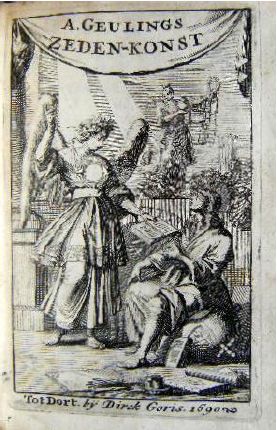
(70) GEULINCX, Arnold (1624-1669) & Cornelis BONTEKOE (1647-1685) Ethica of zeden-konst, zynde een kennisse syns selvs. Na desselvs ontydige dood alle desselvs délen, met sijne aantékeningen in 't ligt gegeven ... door Filaretus. En nu vertaalt ... door Ant. de Reus. [Bound with:] Desselvden makers wysgerig kortbondig vertoog over dese sinspreuk Wie eene, alle deugden heeft ... [And with:] Een zedelyk-lichhaamkundige verhandeling van des ziels en lichhaams lydingen. En derselver sekere geneesmiddelen Door ... Kornelis Bontekoe ...
Dordregt, Dirk Goris 1697-96.
3 volumes in 1. Small 8vo. [LVI],591, [II],34, [II],213,[5 printer's cat.]p. With an engraved frontispiece dated 1690. Contemp. vellum, somewhat soiled.
The first work is the first and only Dutch edition of the most important book by Arnold Geulincx. First published posthumously in Latin (Gnothi seauton, sive ... Ethica) in 1675 by Cornelis Bontekoe, and again in 1696 and 1709. Geulincx was educated in Louvain and there appointed professor of philosophy in 1646, and moved to Leiden in 1658. Geulincx developed an occasionalist philosophy out of Cartesian principles, and many contemporary and modern scholars have pointed out the similarities between his and Spinoza's ethics. Even in one of the laudatory poems in the first edition of Geulincx' Ethica - published two years before Spinoza's Ethica - both authors are compared: 'Frustra hic Spinosae quaeras molimina mentis'.
*Van der Linde 314 note. Bamberger 23 (Latin edition of 1675). Spinozahuis 318/326 (Latin edition of 1709).
(70) GEULINCX, Arnold (1624-1669) & Cornelis BONTEKOE (1647-1685) Ethica of zeden-konst, zynde een kennisse syns selvs. Na desselvs ontydige dood alle desselvs délen, met sijne aantékeningen in 't ligt gegeven ... door Filaretus. En nu vertaalt ... door Ant. de Reus. [Bound with:] Desselvden makers wysgerig kortbondig vertoog over dese sinspreuk Wie eene, alle deugden heeft ... [And with:] Een zedelyk-lichhaamkundige verhandeling van des ziels en lichhaams lydingen. En derselver sekere geneesmiddelen Door ... Kornelis Bontekoe ...
Dordregt, Dirk Goris 1697-96.
3 volumes in 1. Small 8vo. [LVI],591, [II],34, [II],213,[5 printer's cat.]p. With an engraved frontispiece dated 1690. Contemp. vellum, somewhat soiled.
The first work is the first and only Dutch edition of the most important book by Arnold Geulincx. First published posthumously in Latin (Gnothi seauton, sive ... Ethica) in 1675 by Cornelis Bontekoe, and again in 1696 and 1709. Geulincx was educated in Louvain and there appointed professor of philosophy in 1646, and moved to Leiden in 1658. Geulincx developed an occasionalist philosophy out of Cartesian principles, and many contemporary and modern scholars have pointed out the similarities between his and Spinoza's ethics. Even in one of the laudatory poems in the first edition of Geulincx' Ethica - published two years before Spinoza's Ethica - both authors are compared: 'Frustra hic Spinosae quaeras molimina mentis'.
*Van der Linde 314 note. Bamberger 23 (Latin edition of 1675). Spinozahuis 318/326 (Latin edition of 1709).
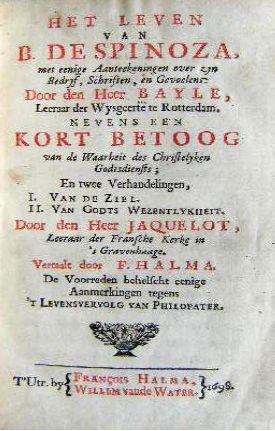
(71) BAYLE, Pierre (1647-1706) & François HALMA (1653-1722) & Isaac JAQUELOT (1647- 1708) Het leven van B. de Spinoza, met eenige aanteekeningen over zyn bedryf, schriften, en gevoelens ... Nevens een kort betoog van de waarheit des Christelyken godtsdienst; en twee verhandelingen, I. Van de ziel. II. Van Godts wezentlykheit. Door den heer Jaquelot, leeraar der Fransche kerke in 's Gravenhaage. Vertaalt door F. Halma. De voorreden behelscht eenige aanmerkingen tegens 't Levensvervolg van Philopater.
Utrecht, François Halma & Willem vande Water 1698.
Small 8vo. [CXCII],464,[15]p. Contemp. vellum, back with ms. title.
First edition. A translation of greater parts of Bayle's article on Spinoza in the first edition of 1697 of his famous Dictionnaire (p.1-116), for a long time the major source for biographical information on Spinoza. It is preceded by a refutation of Johannes Duijkerius' Spinozistic novel Vervolg van 't leven van Philopater by François Halma (CXCIIp.), and followed by Halma's translation of the parts dealing with Spinoza of Isaac Jaquelot's Dissertations sur l'existence de Dieu (p.117-464). A second edition appeared 1711 in Utrecht.
*Van der Linde 70. Wolf 286. Bamberger 120. Spinozahuis 200/236.
(72) BURMANNUS, Franciscus or Frans BURMAN (1671- 1719) Burmannorum pietas, gratissimae beati parentis memoriae communi nomine exhibita, a Francisco Burmanno, F. Adjiciuntur mutuae cl. Limburgii & Fr. Burmanni epistolae.
Trajecti ad Rhenum [Utrecht], Guilielmi vande Water 1700.
Small 8vo. [XXII],570,101,[2]p. Contemp. vellum, somewhat soiled.
First (only) edition. In 1686 Philippus van Limborch had accused the author's father Franciscus Burman (1628-1679), professor of theology in Utrecht and friend of Cocceius, of having used passages from Spinoza's book on Descartes and Spinozistic sentiments in his Synopsis theologiae, published already in 1671. It lead to a lasting controversy and Burman's son, like his father professor in Utrecht, published the present stout volume in defence of his father.
'An important historical source. Overlooked by almost all historians of Spinozism, probably because of its rarity, it contains important information on the early impact of Spinoza's Tractatus theologico-politicus on the Dutch Cartesians.'
*Bamberger 132.
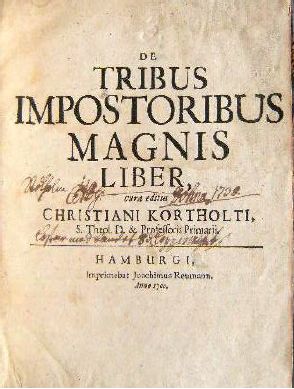
(73) KORTHOLT, Christianus (1633-1694) & Sebastian KORTHOLT (1675 - 1760) De tribus impostoribus magnis. Liber, cura editus Christiani Kortholti, S. Theol. D. & Professoris primarii.
Hamburgi, imprimebat Joachimus Reumann 1700.
4to. [X],3-168p., thus complete. Contemp. calf, back richly gilt with red label, free endpapers gone. Mildly browned, corner of last quires stained, some annotations in a near contemporary hand on the title.
Second edition, enlarged with a preface which is an important source for the life of Spinoza. Christian Kortholt, a German philosopher and orthodox theologian, published in 1680 a severe attack on 'three great impostors', by which he meant Herbert of Cherbury, Hobbes and Spinoza. The present second edition was published posthumously by the author's son Sebastian, who added a Praefatio in which he supplies important information for Spinoza's biography.
Sebastian Kortholt visited Holland 1698/9 and in The Hague came into contact with Van der Spyck, Spinoza's landlord for the last six years of his life. Kortholt included Van der Spyck's first-hand information, of course mostly on Spinoza's last years, in this preface. The biographical details here largely agree with the information given by Colerus in 1705 in his life of Spinoza.
Some copies of this have a slightly different title: the author is there described as (also) 'Pro-Cancellarii Professoris Academiae Kilonensis, dum viveret, Primarii' and it has 'denuo editus cura Sebastiani Kortholti' on the title; this title page also exists dated 1701. Kortholt's treatise was also republished in Kiel the same year counting 120 pages only.
*Van der Linde 82. Bamberger 139. Wolf 304. SB 41.
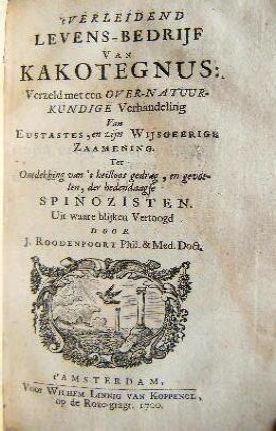
(74) ROODENPOORT, J. 't Verleidend levens-bedrijf van Kakotegnus: verzeld met een over-natuurkundige verhandeling van Eustastes, en zijn wijsgeerige zaamening. Ter ontdekking van 't heilloos gedrag, en gevoelen, der hedendaagse Spinozisten. Uit waare blijken vertoogd.
Amsterdam, Wilhem Linnig van Koppenol 1700.
Small 8vo. [XIV],230p. With engraved frontispiece. Contemp. vellum. Light staining and waving of pages.
First and only edition. A very rare burlesque novel ridiculing Spinozist philosophy. It can been seen as the counterpart of Duijkerius' well-known novel Leven van Philopater. It relates the life of a student named Kakotegnus who ridicules religion. The same subjects as in Duijkerius' novel are discussed here. The student Kakotegnus expresses his Spinozist ideas, much similar to Duijkerius' Philopater, but here to great repugnance of the author. The author, writing under the (unsolved) pseudonymn Roodenpoort, is best known for a blaming 'biography' of Duijkerius Gedragh en naam des schryvers, van Philopater, published ca. 1697.
*Van der Linde 77.
Preceded by: Godvrugtige samenspraak over de Cartesiaanse philosophie waar in haar verborgendheden, als schadelijk in de godsgeleerdheid, worden ontdekt ... tussen Psychicus Cartesianus, en Renatus Pistophilus. Rotterdam, Reinier van Doesburg 1711. 236p. An anonymously published refutation of Descartes, written in the form of a dialogue.
(75) DEURHOFF, Willem (1650-1717) Volslaagen afhankelykheid aller schepzelen van de eeuwige oorzaak: beweerd teegen de uitvluchten van de hoog-geleerde heeren Paulus Buchius, genees- heer, en Salomon van Til ...
Amsterdam, Jan ten Hoorn 1702.
Small 8vo. [VIII],151,[1]p. Recent half calf. Few worm holes in upper inner corner not affecting text.
First (only) edition. Deurhoff was an Amsterdam trunk-maker and discerning self-taught philosopher and theologian. His religious opinions, a somewhat mystic mixture of Cartesianism, Geulincxism and Spinozism, attracted quite a number of followers until the end of the eighteenth century, known as 'Deurhovians'. He repeatedly refuted Spinoza - in the present volume Spinoza's idea of God is called 'to the utmost false and godless' - but nevertheless suspected of propagating Spinozistic ideas and hence vehemently opposed by protestant orthodoxy.
The title page states that the author's defence for the Amsterdam church council of 1695 is added. This is not the case, neither is it present in the copy of the Spinozahuis, where it is listed as a separate publication (330/311) 'bound with'.
*Van der Linde 190 note. Spinozahuis 203/239.
(76) BOETTNER, Gottfried (1680-1740) & Johann Christoph TSCHANTER (1683-1738) De eruditis studiorum intemperie mortem sibi accelerantibus, dissertatio I eaque historica, quam ... praeside M. Gottfrido Boettnero, Frid. Lus. D.XXV. Octobr. A.O.R. [1704] in Academia Lipsiensi publico eruditorum examini submittet auctor & respondens Joh. Christophorus Tschanterus Greiffenb Siles.
Lipsiae [Leipzig], typis Brandenburgerianis [1704].
4to. [28]p.
First (only) edition. A university dissertation on some 40 theologians, jurists, physicians and philosophers who died at an early age because 'their health had suffered under their mental, mostly nightly work'. The last treated is Spinoza, with a quotation from Sebastian Kortholt's preface to the second edition of his father's De tribus impostoribus magnis (1700).
(77) OUTREIN, Johannes d' (1662-1722) Gods betuiging tegen Israel. Psal. LXXXI: 14- 17. Op onse tyden en zeden gepast ... In de voorreden word insonderheid de plaats 2 Cor. VII: 10. verklaard en tegen D. Fr. van Leenhofs Hemel op aarden, aangedrongen.
Amsterdam, Gerardus Borstius 1704.
Small 8vo. [XXXVI],159,[5]p. Modern half vellum. Corner of last leaves stained.
First (only) edition. The preface includes a long refutation of Frederik van Leenhof's Spinozist Heaven on earth published earlier the same year.
*Van der Linde 233. Joode B.37.
(78) TOLAND, John (1670-1722) Letters to Serena: containing, I. The origin and force of prejudices. II. The history of the soul's immortality among the heathens. III. The origin of idolatry, and reasons of heathenism. As also, IV. A letter to a gentleman in Holland, showing Spinosa's system of philosophy to be without any principle or foundation. V. Motion essential to matter; in answer to some remarks by a noble friend on the confutation of Spinosa. To all which is prefix'd, VI. A preface; being a letter to a gentleman in London, sent together with the foregoing dissertations, and declaring the several occasions of writing them.
London, printed for Bernard Lintot 1704.
[LII],239p. Contemp. panelled calf, rebacked with nice label, edges worn, new endpapers. Browned.
First edition. The fourth and fifth letter are a refutation of Spinoza, though as J. Israel has added Toland 'pretends to refute but in reality defends Spinozism, while simultaneously insinuating that he himself was a truer Spinozist than Spinoza'.
This is Toland's second most important book after his Christianity not mysterious of 1696, in which he argued that all Christian dogmas can be understood rationally. Toland has by some named the first 'freethinker' and he has also been credited with the coining of the term 'pantheism' to describe the system of Spinoza.
A French translation appeared as late as 1768.
*Van der Linde 330. Wolf 927. Bamberger 149. SB 6486. Boucher 2383.
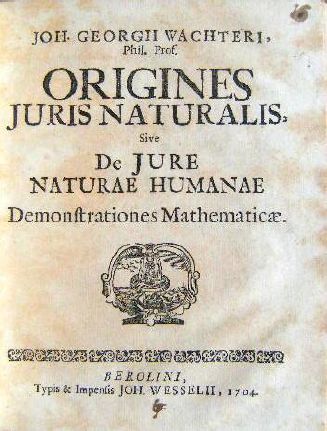
(79) WACHTER, Johann Georg (1673-1757) Origines juris naturalis, sive de jure naturae humanae demonstrationes mathematicae.
Berolini, Joh. Wesselii [Berlin, Joh. Wessel] 1704.
4to. [XVI],42 [i.e. 44]p. Modern boards. Some browning.
First (only) edition. A treatise on the origins of natural law, largely following the principles of Spinoza's Ethics and also using its strict mathematical method. In his first and most comprehensive book on Spinoza (Der Spinozismus im Jüdenthumb, 1699) Wachter, a German philologist and theologian, treated Spinoza as a mystical thinker and showed himself highly critical towards Spinoza's ethics. Both this, and a third volume (Elucidarius cabalisticus, 1706), are much more favourable to Spinoza's thought and brought its author under suspection of heterodoxy.
*SB 443.
(79) WACHTER, Johann Georg (1673-1757) Origines juris naturalis, sive de jure naturae humanae demonstrationes mathematicae.
Berolini, Joh. Wesselii [Berlin, Joh. Wessel] 1704.
4to. [XVI],42 [i.e. 44]p. Modern boards. Some browning.
First (only) edition. A treatise on the origins of natural law, largely following the principles of Spinoza's Ethics and also using its strict mathematical method. In his first and most comprehensive book on Spinoza (Der Spinozismus im Jüdenthumb, 1699) Wachter, a German philologist and theologian, treated Spinoza as a mystical thinker and showed himself highly critical towards Spinoza's ethics. Both this, and a third volume (Elucidarius cabalisticus, 1706), are much more favourable to Spinoza's thought and brought its author under suspection of heterodoxy.
*SB 443.
(80) [FAYDIT, Pierre Valentin (1644-1709)] Remarques sur Virgile et sur Homère, et sur le style poétique de l'Ecriture-sainte; où l'on refute les inductions pernicieuses que Spinosa, Grotius & Mr le Clerc en ont tirées, et quelques opinions particulieres du pere Mallebranche, du sieur l'Elevel, & de monsieur Simon.
Paris, Jean & Pierre Cot 1705.
12mo. [XVI],606,[38]p. Contemp. calf, gilt back with red label.
First (only) edition. The verses of Virgil and Homer are here merely a pretext for the author's 'unmasking' of Socianist and Spinozist influences in the works of the mentioned and other authors. Faydit, an abbé from Riom and controversionalist, wrote quite a number of books of mixed contents, including one (De mente humana) that brought him under suspicion of Cartesianism.
*Bamberger 152.
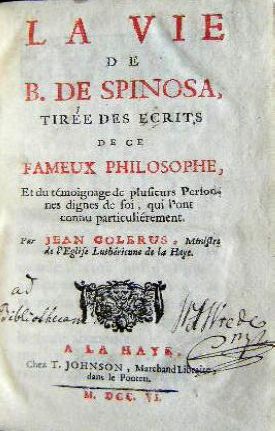
(81) COLERUS, Jean (1647-1707) La vie de B. de Spinosa, tirée des écrits de ce fameux philosophe, et du témoignage de plusieurs personnes dignes de foi, qui l'ont connu particuliérement. [As usual bound with:] La vérité de la résurrection de Jésus Christ, defendue contre B. de Spinosa, et ses sectateurs ...
La Haye, T.Johnson 1706.
2 volumes in 1. Small 8vo. 188, [VIII],80p. Contemp. calf, worn, lacking small pieces of leather. Old ownership's entry on title.
First French edition. A major source for the life of Spinoza, originally published in Dutch in 1705 and translated into French the next year. Colerus' biography precedes the other important contemporary biography, the anonymous Vie de Spinosa (1719). Johannes Colerus was a German Lutheran minister who established in The Hague in 1693 in the same house where Spinoza found his first accomodation. There Colerus came into contact with Van der Spyck, a painter and Spinoza's second landlord in The Hague and from him got ample information about Spinoza's last years. It has been noted that Colerus' work is 'in several places contradictory to the 1719-biography, in others strikingly homonymous'. The title of the second work includes the title of the biography, but in many copies the biography is found bound before the second work.
*Van der Linde 89 & 90. Wolf 297. Bamberger 157. Spinozahuis 209/241. SB 3287.
(82) COLERUS, Jean (1647-1707) The life of Benedict de Spinosa. Written by John Colerus, minister of the Lutheran church, at the Hague. Done out of French.
London, printed by D.L. and sold by Benj. Bragg 1706.
Small 8vo. [II],92p. Finely rebound in half calf and marbled sides, no back title. Browned, marginal fraying to first leaves, two other leaves with small imperfections not affecting text.
First (only) English edition. The translator remains unknown.
*Van der Linde 91. Bamberger 158. Wolf 292. Spinozahuis 211/. Boucher 496.
(83) [DIPPEL, Johann Conrad (1673-1734)] Fatum fatuum, dat is, het dwase noodlot: sijnde een sonneklaar bewijs, dat alle tegensprekers van de vrye wil des menschen, door onfeylbare gevolgen, gedwongen sijn, de vryheidt Gods insgelijx weg te nemen, of de atheistery van Spinosa vast te stellen. By welke gelegentheidt de geheymenissen der Cartesiaansche philosophie klaar ontdekt en wederleyt worden; en getoont, wat al schade daar door veroorsaakt is. Nevens een geschrift van den afval en herstelling der kerke; genaamt een herder en eene kudde ... door Christianus Democritus. [Followed by:] Ontdekte dwaasheit en kwaadaardigheit der zoo genaamde remarques op het fatum fatuum ...
Gedrukt in Utrecht ... En sijn te bekomen by G. en R.Wetstein 1709.
2 volumes in 1. Small 8vo. [XIX],328 (misprinted 128),[1 errata], 51p. Old boards, back covered with old paper with gilt label. Bound with: Verzameling van eenige verhandelingen over de verdraagzaamheid en vryheid van godsdienst. Amsterdam, Jacob ter Beek en Isaak Tirion 1734. [XVI],80,60,83,68p.
First edition. A refutation of the philosophy of Spinoza, Descartes and Hobbes in which the author tries to prove that 'every one in theology and moral philosophy opposing the free will is inevitably forced to repeal also God's freedom and to establish Spinozan atheism'. Dippel studied theology in Giessen and lived a colourful life as a defender of protestant orthodoxy at first, doctor of medicine, alchemist, and radical pietist and freethinker, yet also reckless and sometimes licentious. He came to Holland in 1707 where he wrote the present book and held a medical practice, though he obtained his degree in medicine at the university of Leiden not before 1711. A German translation appeared the same year, again the next year and again in 1730.
*SB 801 The additional work contains the following pieces:
John LOCKE, Een brief aangaande de verdraagzaamheit. *Yolton 18.
Gerard NOODT, De godsdienst vry van heerschappye ...
Jean BARBEYRAC, Aanmerkingen over de verdraagzaamheid.
Benjamin HOADLY, De natuur van het koninkryk of de kerke van Kristus.
Joannes DRIEBERGE, Praedikaetsi over het gedrag van Paulus tegen de Kristenen voor zyne bekeering.
*SB 801 The additional work contains the following pieces:
John LOCKE, Een brief aangaande de verdraagzaamheit. *Yolton 18.
Gerard NOODT, De godsdienst vry van heerschappye ...
Jean BARBEYRAC, Aanmerkingen over de verdraagzaamheid.
Benjamin HOADLY, De natuur van het koninkryk of de kerke van Kristus.
Joannes DRIEBERGE, Praedikaetsi over het gedrag van Paulus tegen de Kristenen voor zyne bekeering.
(84) LA PLACETTE, Jean (1639-1718) Eclaircissemens sur quelques difficultez qui naissent de la considération de la liberté necessaire pour agir moralement. Avec une addition, où l'on prouve contre Spinosa que nous sommes libre. Pour servir de suite à la réponse aux objections de Mr. Bayle.
Amsterdam, Estienne Roger 1709.
12mo. [VIII],388p. Contemp. calf, back richly gilt with red label, spine ends slightly defective, marbled endpapers, red edges.
First (only) edition. Arguments for free will, necessary for a moral society, with a lengthy refutation of Spinoza's denial of free will occupying pages 277-338. The author was a Calvinist theologian and moralist, surnamed 'the protestant Nicole'. He left France shortly before the revocation of the Edict of Nantes to become pastor of the French church at Copenhagen, and spent the last years of his life in Holland.
*Bamberger 176.
(85) SAINT EVREMOND, Charles de (1613-1703) & Pierre DES MAIZEAUX (1666-1745) Oeuvres meslees. Publiées sur les manuscrits de l'auteur. Seconde edition reveüe, corrigée & augmentée de la vie de l'auteur.
Londres, Jacob Tonson 1709.
3 volumes. 4to (31 x 25cm). [XXXII],LXXIV,[2],348,[7]; [VI],456,[12]; [X],464,[11]p. With portrait, 3 repeated title-vignettes and some other vignettes. Contemp. calf, backs and sides richly gilt decorated, marbled edges, lightly rubbed.
Second and best edition. Saint Evremond was a French miltary leader who fell into disgrace of Louis XIV in the early 1660's. He lived in Holland and England for the rest of his long life where he occupied himself as a writer on historical and philosophic subjects. His works were printed only after his death, for the first time in 1705.
During his stay in Holland he visited distinguished diplomats and learned men, like Heinsius and Vossius, and Spinoza, probably around 1666. The present edition is the first to contain his biography by Pierre des Maizeaux, who describes the impression Spinoza made upon Saint Evremond. The biography of Saint Evremond occupies pages I-LXXIV of the first volume, the details about Spinoza are found on page XXIX.
*Van der Linde 95. Wolf 330. Bamberger 175.
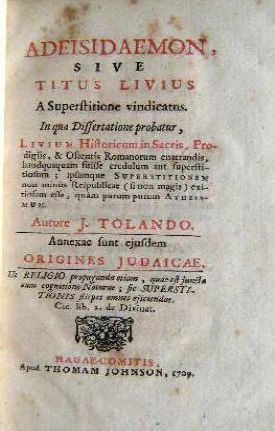
(86) TOLAND, John (1670-1722) Adeisidaemon, sive Titus Livius a superstitione vindicatus. In qua dissertatione probatur, Livium historicum in sacris, prodigiis et ostentis Romanorum enarrandis, haudquaquam fuisse credulum aut superstitiosum; ipsamque superstitionem non minùs reipublicae (si non magis) exitiosam esse, quam purum putum atheismum. Annexa sunt ejusdem Origines Judaicae.
Hagae- Comitis [The Hague], apud Thomam Johnson 1709 [second title-page: 1708].
[XXII],199,[1]p. With 2 title-pages, one printed in red and black, else quasi identical but for the date. Contemp. calf, gilt back, gilt line borders on both sides, marbled endpapers, red edges, little worn. Bookplate to front paste-down.
First (only) edition. In 'the unsuperstitious man' Toland investigates with the help of the pagan Roman historian Livius religious superstition in the Roman empire, 'much more ruinous to the Commonwealth and to human society than atheism'.
In the second part, with half-title Origines judaicae sive, Strabonis, de Moyse et religione judaica historia, breviter illustrata Toland challenged biblical accounts claiming that the Jews were actually Egyptians and Moses pantheist, 'with several interesting references to Spinoza'.
*Wolf 929. Bamberger 178.
(87) [DIPPEL, Johann Conrad (1673-1734)] Christ. Democriti. Fatum fatuum das ist die thörige Nohtwendigkeit, oder augenscheinlicher Beweiss, dass alle, die in der Gotts-Gelehrtheit, und Sitten-Lehre der vernünfftigen Creatur die Freyheit des Willens disputiren, durch offenbahre Folgen gehalten sind, die Freyheit in dem Wesen GOttes selbst aufzuheben, oder des Spinosae Atheismum festzusetzen. Wobey zugleich die Geheimnisse der Cartesianischen Philosophie entdecket und angewisen, wie absurd diese Gauckeley dadurch im gemeinen Wesen gestifftet worden.
Amsterdam, Henich Betkius 1710.
Small 8vo. 222p. Contemp. boards, red sprinkled edges.
Second German edition, first published in Dutch and followed by a first German translation the previous year. A new German edition appeared 1730.
*SB 801.
(88) [TYSSOT DE PATOT, Simon (1655-1738)] Voyages et avantures de Jaques Massé.
A Bourdeaux, chez Jaques l'Aveugle 1710 [The Hague, T.Johnson between 1714 and 1717].
12mo. [VIII],508p. Contemp. calf, gilt back. Pages somewhat waving, first letter of title obscured by old stain. Engraved armorial bookplate of Lord Viscount Lymington.
First edition. A philosophical novel that brought its author, professor of mathematics at the Illustrious School of Deventer, some fame, even though his authorship has not been established with certainty. It tells the story of a voyage to the imaginary kingdom of Butrol situated in Australia. The story is used to express severe rationalist criticism on social, political and religious matters. Rosenberg has made clear that Tyssot de Patot for the formation and development of his ideas was much indebted to the philosophy of Spinoza. The book includes a passage in which the protagonist Jaques Massé meets 'a bold atheist or deist from Gascon'. Rosenberg notes that 'the method and details of the Gascon's attack on the Bible are based almost entirely on Spinoza's Tractatus'.
Tyssot de Patot's rationalist critique has been described as 'as virulent as any to be found in the clandestine manuscripts of the time'. Tyssot de Patot's Lettres choisies, published in 1726-27 but for the greater part written before 1710, more openly showed the influence of Spinoza on his rationalistic and anti-clerical thinking.
There were four editions of this dated 1710, but according to Rosenberg none of these were actually published in 1710 in Bordeaux. He describes the present edition as the true first, published in The Hague between 1714 and 1717.
*Rosenberg A.
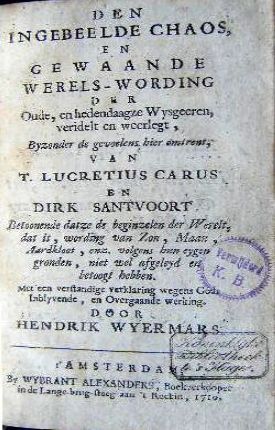
(89) WYERMARS, Hendrik (c.1685-fl. 1749) Den ingebeelde chaos, en gewaande werels-wording der oude, en hedendaagze wysgeeren, veridelt en weerlegt, byzonder de gevoelens hier omtrent, van T. Lucretius Carus en Dirk Santvoort. Betoonende datze de beginzelen der werelt, dat is, wording van zon, maan, aardkloot, enz. volgens hun eygen gronden, niet wel afgeleyd en betoogt hebben. Met een verstandige verklaring wegens Gods inblyvende, en overgaande werking.
Amsterdam, by Wybrant Alexanders 1710.
Small 8vo (9 x 14,5 cm). [XXVIII],187,[1]p. Finely bound in contemp. calf, back richly gilt with red label, marbled endpapers, red edges. Mildly browned throughout. Small stamp from the Royal Library at The Hague and their cancellation stamp on title. Modern bookplate to verso front free endpaper.
First (only) edition, extremely rare. A treatise that has been called a Tractatus de emendatione Spinozae. It includes many Spinozistic elements but is not uncritical towards Spinoza, in fact its author wanted to improve Spinoza, and to continue where Spinoza had stopped.
It was written as a refutation of Dirk Santvoort's De oorsaak van de beweeging der weereld (1699), an example of popular philosophical materialism in the vernacular. Santvoort had argumented that the world had a beginning and would end. Wyermars had written a letter to Santvoort in which he objected against this idea, but neither got any reply nor got his letter returned when he asked for it, and then decided to publish his arguments in a book. Wyermars rejects atomism but also creationism ('de gewaande werels-wording' or the 'feigned world-creation'). He argued that the world was created for eternity by God out of nothing, but God did not create the world really outside himself, but as a modification of himself. Everything happens according to the unalterable laws of nature. The description in the Bible of the Creation is the result of human imagination, the Bible was written in accordance with the perception of the Hebrews and should be understood allegorically. Wyermars's Bible criticism is much alike Spinoza's.
Immediately after its appearance the Amsterdam church council protested and the author was arrested shortly after, and sentenced to 15 years imprisonment in the 'Rasphuys' (whereas Koerbagh got 10 years 'only'!), a fine of 3000 guilders and 25 years banishment from Holland. The remaining stock of the book was seized and most certainly destroyed. Hendrik Wyermars was a self-taught and discerning radical thinker. A clerk without any higher education, he did not know Latin or any other language than Dutch, but he had read widely on theology and philosophy, not only Spinoza but also Descartes, Lucretius, Hobbes, Boyle, Bekker, Santvoort, Van Leenhof, Deurhoff, etc.
Wyermars' book did not exercise any influence in Holland. It was, after the short outcry upon its appearance, not noticed until Van der Linde included it in his Spinoza bibliography of 1871. However, though already rare in the first half of the eighteenth century ('scriptum maxime rarum') and not reprinted or translated, the book was well known in Germany. It was extensively reviewed in 1716 by Christoph August Heumann in the Acta Philosophorum (Nachricht von einem neuen Spinozisten, Henrico Wirmarsio), which much contributed to Wyermars' reputation as a Spinozist. It was again reviewed in 1741 in Michael Lilienthal's Theologische Bibliothec, and in 1750 in Siegmund Jakob Baumgarten's Nachrichten von einer Hallischen Bibliothek. J.F.Reimmann in his Historia universalis atheismi (1725) refers to it as a 'librum pestilentissimum', etc.
There are only two copies in Dutch libraries (KB and UVA) and 3 copies in German libraries (SB Berlin, UB Göttingen and Herzog-August Bibliothek Wolfenbüttel), but no other copy in WorldCat.
*Van der Linde 152.
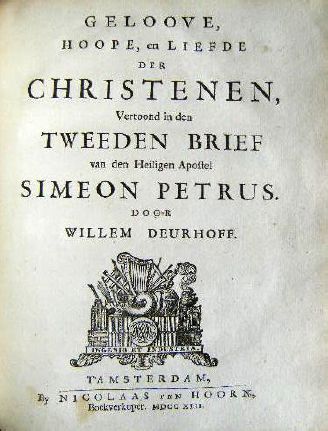
(90) DEURHOFF, Willem (1650-1717) Geloove, hoope, en liefde der Christenen, vertoond in den tweeden Brief van den Heiligen Apostel Simeon Petrus. [Engraved title:] Den tweeden brief van den H. Apostel Petrus. Verklaard.
Amsterdam, Nicolaas ten Hoorn 1713.
4to. [XXX],680,[8]p. With engraved title by J.Goeree and portrait by B.Picart and B.Bernards. Contemp. vellum, hinges weak, outer edges of boards slightly damaged, wanting front free endpaper. Occasionally some staining.
First (only) edition. Deurhoff was an Amsterdam trunk-maker and discerning self-taught philosopher and theologian. His religious opinions, a somewhat mystic mixture of Cartesianism, Geulincxism and Spinozism, attracted quite a number of followers until the end of the eighteenth century, known as 'Deurhovians'. He repeatedly refuted Spinoza, but nevertheless was suspected of propagating Spinozistic ideas and hence vehemently opposed by protestant orthodoxy.
*Van der Linde 195.
(90) DEURHOFF, Willem (1650-1717) Geloove, hoope, en liefde der Christenen, vertoond in den tweeden Brief van den Heiligen Apostel Simeon Petrus. [Engraved title:] Den tweeden brief van den H. Apostel Petrus. Verklaard.
Amsterdam, Nicolaas ten Hoorn 1713.
4to. [XXX],680,[8]p. With engraved title by J.Goeree and portrait by B.Picart and B.Bernards. Contemp. vellum, hinges weak, outer edges of boards slightly damaged, wanting front free endpaper. Occasionally some staining.
First (only) edition. Deurhoff was an Amsterdam trunk-maker and discerning self-taught philosopher and theologian. His religious opinions, a somewhat mystic mixture of Cartesianism, Geulincxism and Spinozism, attracted quite a number of followers until the end of the eighteenth century, known as 'Deurhovians'. He repeatedly refuted Spinoza, but nevertheless was suspected of propagating Spinozistic ideas and hence vehemently opposed by protestant orthodoxy.
*Van der Linde 195.
(91) [PHILIPPS, Jenkin Thomas (?-1755)] & Samuel CLARKE (1675-1729)] Historia atheismi, breviter delineata, à Jenkino Thomasio, cambo-britanno. Cui aceedit Samuelis Clark tractatus eximius de existentia et attributis Dei, contra Spinosam atque Hobbesium, Anglice conscriptus, jam autem Latine redditus. Cum praefatione Christiani Gotlib. Schwarzii ...
Altorfii Noricorum, Jod. Guil. Kohlesium [Altorf, J.W.Kohl] 1713.
2 parts in 1 volume. Small 8vo. [X],286,[5], [XVI],174p., second part with own title page. Contemp. blind-tooled vellum. Fine copy.
Second edition. A history of atheism that 'presents facts and evaluation in relatively objective fashion'. The tenth chapter De Benedicto Spinosa principe atheorum includes Matthias Knutzen and John Toland. The author's account of Spinoza's life and works 'lacks the invective so common in the writings of his contemporaries'.
The second part is a translation of Clarke's A demonstration of the being and attributes of God, more particularly in answer to Mr. Hobbs, Spinoza, and their followers which constituted the Boyle Lecture of 1704. First published in 1709, but then without Clarke's work.
*Bamberger 209. SB 1006.
(92) FENELON, François (1651-1715) Demonstration de l'existence de Dieu, tirée de la connoissance de la nature, & proportionnée à la foible intelligence des plus simples. Quatrième edition.
Amsterdam, l'Honore & Chatelain 1715.
Small 8vo. XL,[8 publ. cat.],291,12p. With portrait and title-vignette. Contemp. calf, gilt back with label. Ownership entries on title, front paste-down and first blank.
Fourth edition, the first to contain the expanded preface (p.V-XL) by Tournemine, editor of the famous Jesuit Journal de Trévoux. In his preface to the earlier editions Tournemine had showed his discontent with Fenelon's - in his eyes - weak refutation of Cartesianism. In the present edition, the first published after Fenelon's death, Tournemine has rewritten his preface. He asserts that Fenelon did not support Cartesian ideas and strongly attacks Spinozism as the result of Cartesian reasoning.
*Bamberger 222.
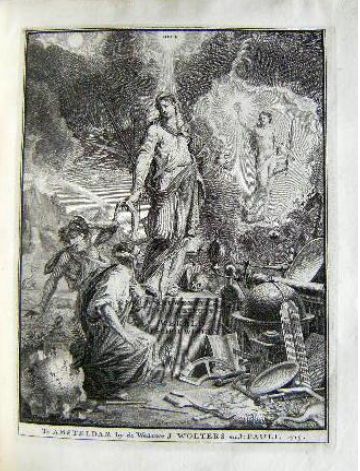
(93) [NIEUWENTYT, Bernard (1654- 1718)] Het regt gebruik der werelt beschouwingen, ter overtuiginge van ongodisten en ongelovigen aangetoont.
Amsterdam, J.Wolters en J.Pauli 1715.
4to. [XII],916,[18]p. & 1 folding leaf. With engraved allegorical frontispiece, engraved portrait of the author and 28 folding engraved plates. Contemp. vellum. Fine copy.
First edition. A highly popular defence of the existence of God based on the perfection of His creation of the physical world. The book is an up to then unsurpassed overview of the ingenious structure of nature, aiming at showing the purposiveness of the Creation to confute unbelievers and atheists, first of all Spinoza and his followers.
Nieuwentyt had studied physics, mathematics and medicine in Leiden and Utrecht and became a physician and burgomaster in Purmerend. He held relations with many scientists and corresponded with a.o. Leibniz. In 1720 appeared posthumously another stout volume of the author, entitled Gronden van zekerheid, completely dedicated to the refutation of Spinoza's system.
In the preface the author refers to the peaceful dying of Spinoza, 'for his followers reason to believe that his feelings were not so wrong'. He also suggests that authors of atheistic books give their works the shape of mathematical disquisitions to pass them off for indisputable truths. Spinoza's Ethica is an example of that, and it has got even more fame among many 'ill-fated' people because they don't understand right the mathematics and believe that what is said is true because seemingly the result of mathematical reasoning.
This book went through seven Dutch editions and several times reprinted translations into French (L'Existence de Dieu, démontrée par les merveilles de la nature), English (The religious philosopher) and German (Die Erkänntnüss [sic] der Weissheit, reprinted as Rechter Gebrauch der Welt-Betrachtung).
*Van der Linde 106 (fourth edition of 1725). Wolf 891. Bamberger 234 (second edition of 1717). Spinozahuis 215/247. SB 804 (German edition).
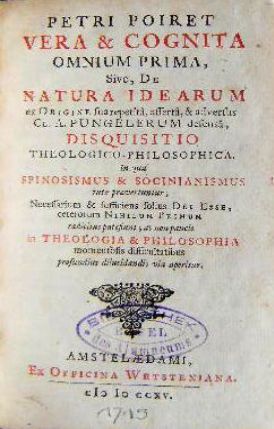
(94) POIRET, Pierre (1646-1719) Vera & cognita omnium prima, sive, de natura idearum ex origine sua repetita, asserta, & adversus Cl. A.Pungelerum defensa, disquisitio theologico-philosophica. In qua Spinosismus & Socianismus tuto praevertuntur ...
Amstelaedami, ex officina Wetsteniana [Amsterdam, Wetstein] 1715.
12mo. 21,15,371,[1]p. Old decorated boards, back and corners worn. Stamp on title.
First (only) edition. A defense against the Herborn theologian Abraham Pungeler, who had attacked Poiret for his theory of the creation by God of the ideas. Poiret is usually mentioned by Spinoza scholars in connection with his book Cogitationum rationalium de deo, anima, et malo, of which the second edition contained an extensive refutation of Spinoza. The present book however also includes several passages warning against the danger of Socianism and Spinozism.
(95) DRIESSEN, Antonius (1684-1748) Philadelphia exprobrat Antonio Driessenio perfidiam.
[No place 1718.]
4to. 20p. New blank wrappers.
First (only) edition. In 1711 Jacobus Wittichius, professor of philosphy in Groningen had published a Philosophical dissertation on the nature of God. Antonius Driessen, professor of theology also in Groningen, accused Wittichius of sharing Spinoza's conception of God. It lead to a sharp controversy between the two men. This is one of many pamphlets regarding this controversy published between 1711 and 1719. Van der Linde lists nearly 20 publications but not the present one, though it includes several references to Spinoza.
(96) Hattem, Pontiaan van. - Extract uyt de Notulen van de Ed. Mog. Heeren Staten van Zeeland. Den 11. Februarii 1718 ... tegen het weeren van de ingekropte gevoelens van Pontiaen van Hattem, Gosewynus van Buytendijck ende andere hare schadelijcke en ziel-verdervende leere adherenten, en derzelver schriften ... [drop-title].
[Middelburg 1718.]
Folio. 6p. Unbound.
First edition. An extract of the resolutions of the States of Zeeland holding the renewal and amplification of the edict of March 19, 1714 against the Spinozist sect of the Hattemists. Signed at end C. van Citters. Pontiaan van Hattem (1641-1706) was a liberal minister from Zeeland, influenced by Spinozist ideas. He denied the difference between moral good and evil and the expiatory sacrifice of Christ, and pleaded for toleration and against ecclesiastical authority. He was expelled from the Church in 1683, but attracted quite a number of followers. Among his followers was the famous explorer Jacob Roggeveen who posthumously published Van Hattem's writings (Den val van 's werelts af-god, 1718-27). Van Hattem's publications and those of his followers like Jacob Bril, Gosewynus van Buytendijck and Marinus Booms, were officially banned since 1714. The sect of the Hattemists existed until the end of the eighteenth century.
*Bamberger 259 (as included in the Kerkelyk plakaatboek of 1722).
(97) ENGELSCHALL, Carl Gottfried (1675-1738) Seculi moderni nonnulla praejudicia de capitibus fidei: das ist: nichtige Vorurtheile der heutigen Welt in Glaubens-Lehren, welche nach der Wage des Heiligthums abgewogen, und zu leicht erfunden, auch bey dieser andern Auflage mit einem Anhang vermehret worden. [Followed by:] Fortgesetzte nichtige Vorurtheile ...
Leipzig, Augustus Martini 1719.
2 volumes in 1. Small 8vo. [XVI],803,[13], [XVI],448,[16]p. Contemp. vellum, soiled. Several passages heavily underlined in black and red.
Second edition, expanded with a second volume. The eighteenth chapter or 'prejudice' in the first volume (p.450-480) is titled Spinosae Lehre ist lange nicht so gottloss und böse, als man sagt.
The author, a Lutheran minister at the court of Saxony, shows himself well acquainted with the contemporary literature on Spinoza. Other 'prejudices' have titles similar to that on Spinoza and are dedicated to Socianism, Arminianism, Quakerism, Cartesianism, Cocceianism, Anna Maria van Schurman, Johann Konrad Dippel, Jean de Labadie, Balthasar Bekker, etc.
First published in 1716, but then without the second volume, and again in 1731.
*SB 452.
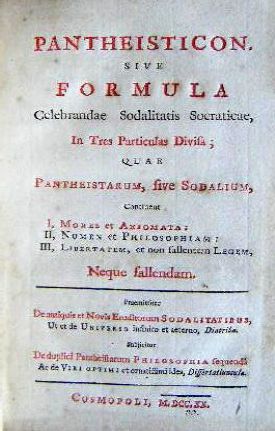
(98) TOLAND, John (1670-1722) Pantheisticon. Sive formula celebrandae sodalitatis Socraticae, in tres particulas divisa; quae pantheistarum, sive sodalium, continent I, Mores et axiomata: II, Numen et philosophiam: III, Libertatem, et non fallentem legem, neque fallendam ... Cosmopoli [London?] 1720.
Small 8vo. [VI],89p. With several vignettes and ornamented initials. Title and p.47-73 printed in red and black. Contemp. calf, gilt back with red label, front hinge weak, extremities little worn. On the first blank several bibliographical references in an old French hand.
First edition, very rare. Toland's last important book, printed in a very limited number of copies (50?) for private circulation only. Wolf notes that the work 'gave great offence as a sort of liturgic service made up of passages from heathen authors, in imitation of the Church of England liturgy'. Toland had already in the early eighteenth century been classified as a Spinozist. While in his earlier Letters to Serena he only reluctantly supported Spinoza's philosophy, in his present Pantheisticon Toland showed himself a whole-hearted adherent of pantheistic philosophy, a term he coined for the philosophy of Spinoza.
*Van der Linde 330 note. Wolf 925. Bamberger 251.
(99) WITTICHIUS, Jacobus (1671-1739) & Gerhard Nicolaus BROUWER & Johann Franz BUDDEUS (1667-1729) Disputatio philosophica de natura Dei quam favente supremo numine praeside Iac. Wittichio ... Publice ventilandam suscipit Gerhardus Nicol. Brouwer ... defendens die iulii MDCCXI ... Accedit ... Ioan. Francisci Buddei ... Iudicium theologicae et philosophicae facultatis Ienensis ...
Hagae Comitum [The Hague] 1720.
[VI],52p. Modern half vellum.
Second edition, first published in 1711 in Duisburg as a university disputation. Wittichius Philosophical dissertation on the nature of God lead to a sharp controversy with orthodox theologians who accused the author, professor of philosphy in Groningen, of sharing Spinoza's conception of God. It is here reprinted, followed (p.43-52) by a refutation of Wittichius' supposed Spinozism by Buddeus (or Budde), professor of philosophy in Halle and a prolific writer against atheism and Spinozism.
*Van der Linde 254. SB 265.
(100) BURGMANN, Johann Christian (1697-1775) & Franz Jakob HELMS & Andreas HOLTERMANN (1698-1775) Exercitatio philosophica de Stoa a Spinozismo et atheismo exculpanda. Quam praeside Dn. Io. Christiano Burgmann ... respondentes Franciscus Jac. Helms ... et Andr. Holtermann ...
Wittenbergae, Gerdesianis [Wittenberg, Christian Gerdes] [1721].
4to. [II],33,[1]p. Browned.
First (only) edition. A university disputation on Spinozist atheism.
*SB 110.
(101) HOUTTEVILLE, Claude François Alexandre (1686 -1742) La religion chrétienne prouvée par les faits: avec un discours historique et critique, sur la méthode des principaux auteurs qui ont écrit pour & contre le Christianisme depuis son origine.
Paris, Gregoire Dupuis 1722.
4to. [VIII],CCIV,476p. Contemp. calf.
First edition. An esteemed apology of Christian religion, preceded by a long historical part in which the author treats the principal writers pro and contra Christianity from St Paul to Leibniz. Spinoza is treated in the historical part p.CLXIII-CLXXVI, and there are scattered references in the main text. Bamberger notes that it is 'brilliantly written and free of the cliches usually found in apologetic works, the book gives a remarkably independent portrait of Spinoza's philosophical character'.
*Wolf 823 (second edition of 1740). Bamberger 257. SB 1000.
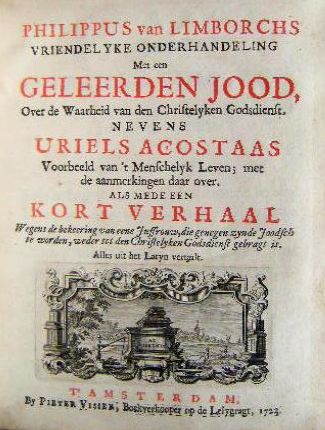
(102) LIMBORCH, Philipp van (1633-1712) Vriendelyke onderhandeling met een geleerden Jood, over de waarheid van den Christelyken godsdienst. Nevens Uriels Acostaas Voorbeeld van 't menschlyk leven; met de aanmerkingen daar over. Als mede een kort verhaal wegens de bekeering van eene juffrouw, die genegen zynde Joodsch te worden, weder tot den Christelyken Godsdienst gebragt is. Alles uit het Latyn vertaalt.
Amsterdam, Pieter Visser 1723.
4to. [XXXVIII],747,[7 publisher's cat.]p. With engraved printer's mark on title. Contemp. vellum. Fine copy from the library of Leo Polak, with his bookplate and name stamp.
First Dutch edition. First published in Latin in 1687 as De veritate religionis christianae. A defence of Christian religion in a dispute with 'an erudite Jew', the well known philosopher and physician Isaac Orobio de Castro (1617-1687), a leading figure in the Spanish-Portuguese community in Amsterdam. Van Limborch, a leading Remonstrant theologian, added to his book Uriel da Costa's famous autobiographical sketch Exemplar humanae vitae, here published in Dutch for the first time. Da Costa, excommunicated by the Amsterdam Jewish community for his heretical views, has been seen by many as a precursor to Spinoza.
A second Dutch edition appeared in 1735.
*Bamberger 67 (first Latin edition).
(103) HOFFMANN, Friedrich (1660-1742) De fato physico et medico eiusque rationali explicatione disquisitio in qua multa subtilioris indaginis argumenta de fato stoicorum, Spinozae, medico et physico, de fortuna, providentia divina, harmonia praestabilita, miraculis nec non de declinatione fati curatius paullo tractantur et excutiuntur.
Halae Magdeburgicae, typis Christiani Henckelii [Halle/Saale, Christian Henckel] [1724].
4to. [II],53p.
First (only separate) edition. Hoffmann was professor of natural philosophy in Halle and one of the greatest German physicians of his time. He here 'in strongest terms rejects Spinoza's opinions on cause, effect and order as philosophically untenable, medically useless and theologically dangerous' (Bamberger).
*Bamberger 362 (as included in the author's Opuscula phisico-medica of 1738). SB 789 (erroneously attributed to Adolf Friedrich Hoffmann).
(104) STOLLE, Gottlieb (1673-1744) Anleitung zur Historie der Gelahrheit, denen zum besten, so den Freyen- Künsten und der Philosophie obliegen, in dreyen Theilen nunmehr zum andernmal, umb vieles vermehret und verbessert, herausgegeben.
Jena, Johann Meyer 1724.
4to. 3 parts in 1 volume, continously paginated. [XXII],778,[78]p. With engraved allegorical frontispiece. Contemp. half calf, rubbed. With occasionally neat underlinings and marginal annotations in a small contemporary hand.
Second expanded edition. An encyclopedia of contemporary writers on literature, history and philosophy, first published in 1718. Stolle was professor of political science in Jena. He visited the Netherland in 1703 and there collected information about Spinoza, interviewing people with whom Spinoza had personal contact. Van der Linde notes that the material he collected is interesting but inaccurate. A part of this information appears in this volume (p.413- 416, 484f., 495-499, 676), more information was published in 1847 by G.W.Guhrauer and in 1899 by Freudenthal.
*Van der Linde 86 (the later publications). Bamberger 295 (edition of 1727 with supplements). SB 841.
(105) FABRICIUS, Johann Albert (1668-1736) Delectus argumentorum et syllabus scriptorum qui veritatem religionis Christianae adversus atheos, Epicureos, deistas seu naturalistas, idololatras, Judaeos et Muhammedanos lucubrationibus suis asseruerunt.
Hamburgi, sumtu Theodori Christophori Felginer 1725.
4to. [XII],755,[29]p. With engraved frontispiece. Contemp. calf, gilt back. Some quires browned.
First (only) edition. A compendium of Christian apologetic literature with ample bibliographic references. The chapter Scriptores adversus atheos includes a section Contra Spinosam (p.357-361) with an important bibliography of works written against Spinoza. Other references are to authors like Bekker, Bredenburg, Locke, Lodewijk Meyer, Toland, etc.
*Van der Linde 267 note. Wolf 273. Bamberger 279. SB 958.
(106) [NIEUWENTYT, Bernard (1654-1718)] L'Existence de Dieu, démontrée par les merveilles de la nature en trois parties; où l'on traite de la structure du corps de l'homme, des elemens, des astres, & de leurs divers effets.
Paris, Jacques Vincent 1725.
4to. XXVII,[1],681,[3]p. With 29 folding plates. Contemp. calf, gilt back with red label, marbled endpapers, red edges. Upper hinge cracked but firmly holding. Some light foxing as may be expected.
First French edition of Het regt gebruik der werelt beschouwingen (1715), a highly popular defence of the existence of God based on the perfection of His creation of the physical world. The book is an up to then unsurpassed overview of the ingenious structure of nature, aiming at showing the purposiveness of the Creation to confute unbelievers and atheists. Nieuwentyt had studied physics, mathematics and medicine in Leiden and Utrecht and became a physician and burgomaster in Purmerend. He held relations with many scientists and corresponded with a.o. Leibniz. In 1720 appeared posthumously another stout volume of the author, entitled Gronden van zekerheid, completely dedicated to the refutation of Spinoza's system. The book went through seven Dutch editions and several editions in French, English (The religious philosopher) and German (Die Erkänntnüss [sic] der Weissheit, reprinted as Rechter Gebrauch der Welt-Betrachtung).
*Van der Linde 106 (fourth Dutch edition). Wolf 896 (second edition of 1727 erroneously identified as the first). Bamberger 292 (edition of 1727). Spinozahuis 215/247 (first Dutch edition). SB 804 (German edition).
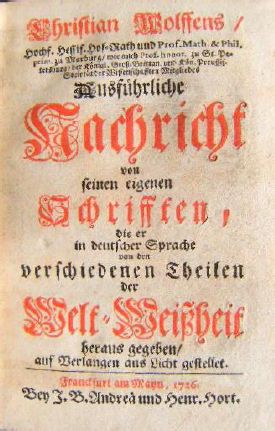
(107) WOLFF, Christian (1679-1754) Ausfuehrliche Nachricht von seinen eigenen Schrifften, die er in deutscher Sprache von den verschiedenen Theilen der Welt-Weissheit heraus gegeben, auf Verlangen ans Licht gestellet.
Franckfurt am Mayn, bey J.B. Andreae und Henr. Horst 1726.
[XIV],672,16p. With engraved frontispiece. Contemp. calf, back richly gilt with label. From the library of Friedrich Graf zu Sayn-Hohenstein und Wittgenstein, with his initials and date 1738 on upper cover. Tiny wormhole in corner of frontispiece just touching the image.
First edition. Christian Wolff's reflections upon his own philosophical writings, with several references to the polemic about his alleged atheistic and Spinozistic metaphysics and ethics. This so-called Wolff-Lange controversy is described by Jonathan Israel as 'one of the most significant cultural confrontations of the eighteenth century and perhaps the most important of the Enlightenment in Central Europe and the Baltic countries before the French Revolution'.
Christian Wolff, the major German philosopher between Leibniz and Kant, was appointed professor of mathematics and natural philosophy in Halle in 1706. Suspicions of atheistic and Spinozistic tendencies in his philosophy soon arised. A lecture delivered in 1721 on the practical philosophy of the Chinese, in which Wolff praised the pagan philosophy of Confucius and at the same time admitted its atheistic tendencies, caused a great outcry among his predominant pietist colleagues in Halle.
In 1723 Joachim Lange, professor of theology in Halle, published a vehement attack on Wolff (Caussa Dei et religionis naturalis adversus atheismum). A decree of king Frederick William I banned the teaching of Wolff's philosophy on all Prussian universities. Wolff was dismissed and forced to leave Prussia 'within 24 hours or be hanged'. Wolff moved to Marburg and answered Lange the next year in his De differentia nexus rerum (an expanded German edition appeared 1739). The academic polemic that followed would last until the end of the 1730's, when Frederick the Great ended the debate and convinced Wolff to return to Halle. Among the supporters of Wolff were G.B.Bilfinger and C.G.Ludovici, among his opponents J.F.Buddeus and J.G.Walch.
*Bamberger 381 (Dutch edition of 1740).
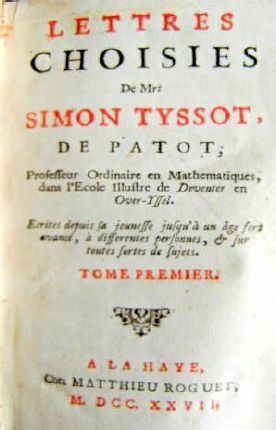
(108) TYSSOT DE PATOT, Simon (1655-1738) Lettres choisies. Ecrites depuis sa jeunesse jusqu'à un âge fort avancé, à differentes personnes, & sur toutes sortes de sujets ... Ecrites depuis sa jeunesse jusqu'à un âge fort avancé, à differentes personnes, & sur toutes sortes de sujets.
La Haye, Matthieu Roguet 1727 [1726].
2 volumes. 12mo. [VI],515,[13]; [XIV],580,[15]p. Contemp. calf, gilt backs with red label, sprinkled edges. Mild browning throughout.
First (only) edition. These letters were for the greater part written before the publication of the author's better known novel Voyages et avantures de Jaques Massé. Whereas in that book the influence of Spinoza's philosophy on the author remained hidden, the present work openly shows that influence on his rationalistic and anti-clerical thinking. Rosenberg has made clear that Tyssot de Patot already at an early age had made aquaintance with Spinoza's ideas.
The publication of these letters caused a great outcry for its 'clear elements of Spinozism, atheism, obscenity and immoralism'. The book was forbidden by the magistrates of Deventer and the author was removed as a professor of mathematics at the Illustrious School and banned.
*Knuttel 396.
(109) CLARKE, Samuel (1675-1729) A discourse concerning the being and attributes of God, the obligations of natural religion, and the truth and certainty of the Christian revelation. In answer to Mr Hobbs, Spinoza ... [Second title page:] A demonstration of the being and attributes of God. More particularly in answer to Mr Hobbs, Spinoza, and their followers ... The seventh edition, corrected ...
London, printed by W.Botham, for James and John Knapton 1728.
[XXIV],506,[2]p. Modern half calf, marbled boards.
The Boyle lecture of 1704, 'the most serious and capable polemic against Spinoza'. Clarke was one of the major philosophers of his time, best known for his physico- theological proof of the existence of God.
First published in 1705 with the second quoted title only and several times reprinted with additional pieces and with either or both titles, and also translated into French, German and Dutch.
*Van der Linde 291 (fourth edition of 1716). Wolf 783. Bamberger 297.
(110) NICERON, Jean Pierre (1685-1738) Mémoires pour servir à l'histoire des hommes illustres dans la République des Lettres. Avec un catalogue raisonné de leurs ouvrages. Tome XIII.
A Paris, chez Briasson 1730.
Small 8vo. [VIII],408,[13]p. Contemp. calf, gilt back with green labels, gilt coat of arms on both sides, red edges.
First (only) edition. The volume of this monumental series of biographies of men of letters including Spinoza (p.30-52). It is also valuable for its bibliographical information on Spinoza and on contemporary critics like Frans Kuyper, Regnerus van Mansvelt and Johannes Bredenburg. This volume includes also Bernard Nieuwentyt (p.356-361).
*Van der Linde 148,II. Bamberger 437 (German edition). SB 6436.
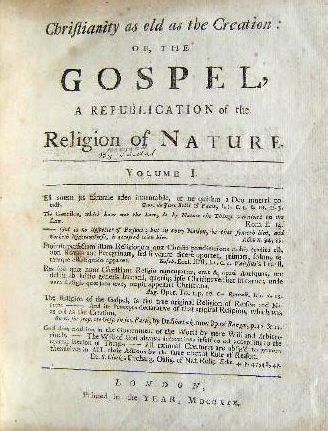
(111) [TINDAL, Matthew (1657- 1733)] Christianity as old as the creation: or, the gospel, a republication of the religion of nature. Volume I [all published].
London, [no printer] 1730.
4to. VIII,432p. Contemp. calf, rubbed, upper joint cracked but firmly holding. Prelims and last gathering browned, else bright and clean.
First (only) edition of the 'bible of English deism'. It exercised a profound influence in England as well as on the Continent. It was translated into German in 1741 by Johann Lorenz Schmidt, also responsible for the translation of Spinoza's Ethica into German in 1744.
*Bamberger 316 (a new edition in 8vo of 1731). Wolf 923.
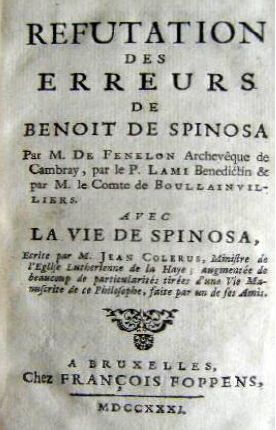
(112) Refutation des erreurs de Benoit de Spinosa. Par M. de Fenelon ... le P. Lami ... & par M. le Comte de Boullainvilliers. Avec la vie de Spinose, ecrite par M. Jean Colerus ... augmentée de beaucoup de particularités tirées d'une vie manuscrite de ce philosophe, faite par un de ses amis. [And:] Certamen philosophicum ... adversus Joh. Bredenburg ... [by] Ishak Orobio.
Bruxelles, François Foppens 1731.
12mo. 2 parts in 1 volume. [VIII],158,483 (erroneously paginated 183),[3]p. Contemp. calf, back richly gilt with label, spine ends little defective, marbled endpapers, marbled edges.
A well-known volume of Spinozana, published by Nicolas Lenglet Dufresnoy. Though the title suggests a refutation of Spinozist 'errors' in fact showing considerable sympathy. The first part (p.1-158) is taken by Jean Colerus' Vie de Spinosa, the first biography of Spinoza, first published in 1706. It is here 'augmented with many particulars taken from a manuscript life of the philosopher, done by one of his friends', probably the abbé Lenglet Dufresnoy who is held reponsible for the compilation of this volume.
The second part is Henri de Boullainvilliers' Refutation de Spinoza (p.1-320), not printed previously, and contrary to the title quite favourable towards Spinoza's philosophy. This is followed by an Extrait du nouvel atheisme renversé, ou refutation du sistême de Spinosa (p.321-375), taken from the well-known volume published in 1696 by François Lamy with the clear intention to save Cartesianism from the suspicion of being the source of Spinozian atheism, and by an Extrait d'une lettre ... sur la réfutation de Spinosa (p.376-386) by Fenelon.
This is followed (not mentioned on the title) by Certamen philosophicum propugnatae veritatis divinae ac naturalis adversus Joh. Bredenburg (p.387-483), a criticism of Spinoza's ethics by Isaac Orobio de Castro, a major figure in the Portuguese Jewish community of Amsterdam in Spinoza's days. This piece has an own title-page with imprint 'Amstelaedami, A. Theodori Ossaan 1703', but continuing signature and pagination.
*Van der Linde 107, 108 & 209. Bamberger 315. Wolf 909. Spinozahuis 210/249 (dated 1726). SB 6501.
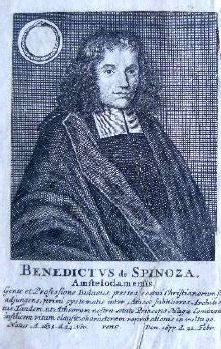
(113) COLERUS, Jean (1647-1707) Das Leben des Bened. von Spinoza, aus denen Schrifften dieses beruffenen Welt- Weisens und aus dem Zeugniss vieler glaubwürdigen Personen, die ihn besonders gekannt haben ... Nunmehro aber aus dem Frantzösischen ins Hoch-Teutsche übersetzet, und mit verschiedenen Anmerckungen vermehret.
Franckfurt und Leipzig 1733.
Small 8vo. 126p. With portrait of Spinoza. Nineteenth-century plain stiff boards.
First German edition, done after the French edition La vie de B. de Spinosa (1706). The translation has been attributed to J. Faccius, who has added a 4-page preface and (sometimes ample) notes in which he does not hide his repugnance to Spinoza's ideas.
*Van der Linde 92. Wolf 294. Bamberger 323. SB 910.
(114) Lettres sur les Hollandois. Lettres sur les Hollandois par M.A.F.C. [Followed by:] [F.BUYT] Reponse aux lettres sur les Hollandois. Précédée d'une lettre à l'auteur de cette reponse.
Londres, [no printer] 1735 & Amsterdam, [no printer] 1735.
2 volumes in 1. 12mo. [II],45,[1]; [VIII],61p. Nineteenth-century cloth-backed boards.
First (only) edition. The 11th letter Sur Spinosa (p.37-39) gives a superficial picture of Spinoza. The anonymous author adds that 'the opinions of this unbeliever are the most dangerous one can imagine'.
The author of the Reponse does not respond to this letter because he is 'not at all interested in Spinoza, nor in his system, and never read the writings of this philosopher, other than the Traité théologique & politique' (!).
*Van der Linde 109. Bamberger 333 (without the Reponse).
(115) Wertheim Bible. Die göttlichen Schriften vor den Zeiten des Messie Jesus. Der erste Theil worinnen die Gesetze der Jisraelen enthalten sind nach einer freyen Ubersetzung welche durch und durch mit Anmerkungen erlaütert und bestätiget wird. [By Johann Lorenz Schmidt].
Wertheim, gedruckt durch Johann Georg Nehr 1735.
4to. 48,[2],1040,[2]p. The preface and the five 'books' all start and end with a fine engraved vignette by Martin Tyroff. Contemp. vellum, red edges. Ex-biblitotheca 'Henrici Christophori ab Ochsenstein', with his bookplate to first paste- down, a corner torn away; old annotation to first free endpaper. One leaf between the preface and the first 'book' and the last (errata-)leaf heavily browned, else a very fine copy.
First (only) edition of the famous 'Spinozistic' Wertheim Bible. A rationalistic translation into modern German of the Pentateuch - only this first part appeared - with often lengthy critical annotations. The book arose great indignation. It was denounced by orthodox theologians and Pietists, like Christian Wolff's great adversary Joachim Lange, as atheistic and full of Spinozistic impostures. The book was forbidden and, as Bamberger notes, the confiscation of the book was 'so successful that it has become alsmost introuvable'. The translator Johann Lorenz Schmidt (1702-1749), a follower of Christian Wolff, was arrested by order of the emperor; only after a year imprisonment he managed to escape to Holland. He is also known as translator of Spinoza's Ethica into German, published in 1744 together with a refutation by Wolff.
Numerous writings pro and contra appeared, collected in Johann Nicolaus Sinnhold's Ausführliche Historie der verruffenen sogenannten Wertheimischen Bibel, and in Schmidt's own Samlung derjenigen Schriften, welche bey Gelegenheit des wertheimischen Bibelwerks für oder gegen dasselbe zum Vorschein gekommen sind.
*Bamberger 332.
Numerous writings pro and contra appeared, collected in Johann Nicolaus Sinnhold's Ausführliche Historie der verruffenen sogenannten Wertheimischen Bibel, and in Schmidt's own Samlung derjenigen Schriften, welche bey Gelegenheit des wertheimischen Bibelwerks für oder gegen dasselbe zum Vorschein gekommen sind.
*Bamberger 332.
(116) HOFFMANN, Adolph Friedrich (1703-1741) & Joachim LANGE (1670 - 1744) Beweisthümer dererjenigen Grund-Wahrheiten aller Religion und Moralität, welche durch die in der Wolfischen Philosophie befindlichen Gegensätze haben geleugnet, und über den Haufen geworfen werden wollen. Bey welcher Gelegenheit zugleich D. Joachim Langens ... Kurtzer Entwurf gedachter Philosophie ... Nebst einem Anhange von der genauen Verwandschaft des auf Einführung des Naturalismi abzielenden Wertheimischen Bibelwercks mit der Wolfischen Philosophie.
Franckfurt und Leipzig 1736. 4to. 16,114p.
Contemp. half vellum, marbled sides.
The major part of this, starting at page 17, is taken by Lange's summary of his arguments against Christian Wolff's philosophy, with caption title Kurtzer Abriss derjenigen Lehr-Sätze, welche in der Wolfianischen Philosophie der natürlichen und geoffenbareten Religion nachtheilig sind ... und ... zur Atheisterey verleiten .... It was written as a final attempt to convince Frederick the Great of the dangers of Wolff's philosophy. It first appeared separately and appears here with a supplement in which Lange claims that the Spinozistic Wertheim Bible, published the previous year, is a direct result of Wolfian philosophy. His attempt failed because the King ordered to end the controversy and allowed Wolff to return to Prussia.
*Bamberger 338 (another issue without the supplement. SB 6640.
(117) LANGE, Joachim (1670- 1744) & Johann Gustave REINBECK (1682 -1741) & Christian WOLFF (1679-1754) I. Mémoire de Monsr. Joachim Lange ... contenant cinq erreurs fondamentales, qu'il attribue a la philosophie de Monsr. Wolf ... II. Reponse preliminaire d'un auteur anonime et impartial, contenant celle, qu'il presume, que Monsr. Wolf fera au memoitre de Mons. Lange. Avec un avis au lecteur contenant l'histoire de ce nouveau differend. [Bound with the second expanded edition of the same work.]
[No place] 1736. 2 works in 1 volume.
Small 8vo. 107,[1], 218p. Contemp. calf, gilt back, red edges, marbled endpapers, top of back damaged. Mildly browned.
French edition of a collection of pieces regarding the Wolff-Lange controversy, also issued with the title Nouvelles pièces sur les erreurs prétendues de la philosophie de Mons. Wolf. The first work consists of three parts with own half-titles. The first part is Court exposé des maximes, de la philosophie de Wolf, prejudiciables a la religion naturelle et revelee ... par Joachim Lange (p.11-44), a final attempt to convince Frederick the Great of the dangers of Wolff's philosophy. This is followed by a reply by Reinbeck, though also attributed to Wolff himself, Reponse qu'on presume, que Monsr. Wolf fera, ou pourra faire au court expose de Monsr. Lange, projettee par un ami de Monsr. Wolf (p.45-80), and by Sommaire de la reponse, que Mons. Wolf a faite, aux imputations du Doct. Lange (p.81-107).
The second work, without title page, is a second revised edition of the first, with added between the second and third part Reponse de Mr. Chretien Wolf aux accusations mal fondées que Mons. Lange a mises ... (p.85-196).
*Bamberger 338 (German edition of the same year including the first two parts only). SB 168, 250, 1049, 6640, 6648 (German editions of certain parts).
(118) ARGENS, Jean Baptiste de Boyer, marquis d' (1704-1771) La philosophie du bon-sens, ou réflexions philosophiques sur l'incertitude des connoissances humaines, à l'usage des cavaliers et du beau-sexe.
Londres, aux dépens de la Compagnie 1737.
12mo. [XII],444,[66]p. With 5 plates after drawings of the author by Chapon. Contemp. blond half calf, gilt back with fleurons, red edges. A very nice copy.
First edition. The author's most important of his numerous works, which clearly shows his enlightened scepticism and anti-clericalism. Boyer d'Argens was among the most radical deists of his time and was deeply influenced by the philosophy of Spinoza. There are several references to Spinoza, including two chapters Réfutation du dogme de l'ame du monde, & du sistême de Spinosa (p.239-246) and Que les principales preuves de Spinosa sont tirées du sistême de Des-Cartes (p.303-305).
*Bamberger 341. Wolf 769 (new edition of 1747).
(118) ARGENS, Jean Baptiste de Boyer, marquis d' (1704-1771) La philosophie du bon-sens, ou réflexions philosophiques sur l'incertitude des connoissances humaines, à l'usage des cavaliers et du beau-sexe.
Londres, aux dépens de la Compagnie 1737.
12mo. [XII],444,[66]p. With 5 plates after drawings of the author by Chapon. Contemp. blond half calf, gilt back with fleurons, red edges. A very nice copy.
First edition. The author's most important of his numerous works, which clearly shows his enlightened scepticism and anti-clericalism. Boyer d'Argens was among the most radical deists of his time and was deeply influenced by the philosophy of Spinoza. There are several references to Spinoza, including two chapters Réfutation du dogme de l'ame du monde, & du sistême de Spinosa (p.239-246) and Que les principales preuves de Spinosa sont tirées du sistême de Des-Cartes (p.303-305).
*Bamberger 341. Wolf 769 (new edition of 1747).
(119) GRAVESANDE, Willem Jacob 's (1688-1742) Introductio ad philosophiam; metaphysicam et logicam continens. Editio altera.
Leidae [Leiden], Joh. et Herm. Verbeek 1737.
12mo. [X],375p. Boards clumsily covered with paper, inner hinges clumsily strengthened.
Second revised edition. Some passages regarding free will in the first edition of this presented accusations of Spinozism against 's Gravesande, Newtonian professor of natural philosophy in Leiden. An anonymously published Lettre à monsieur G.J. s'Gravesande forced him to defend himself against these accusations in the present second edition. *Bamberger 347.
(120) LUDOVICI, Carl Günther (1707-1778) Ausführlicher Entwurf einer vollständigen Historie der Wolffischen Philosophie, zum Gebrauche seiner Zuhörer heraus gegeben. [Volume 1: Dritte weitvermehrtere ... Auflage.]
Leipzig, verlegts Johann Georg Löwe 1737-38.
3 volumes in 2. Small 8vo. [XXXIV],376,[24], [XXII],656,[32]; [XXIV],450,[38]p. With portrait of Wolff, folding table and woodcut to volume 1, frontispiece and folding plate to volume 2. Contemp. calf, backs with gilt labels, sprinkled edges. Bound with: VERAMANDERS PROBIER-STEIN [Pseud.] Das unzeitige und niederträchtige Urtheil, welches Veramander in seiner Schrift, der partheyische und der Wahrheit nachtheilige Historicus ... von des Herrn Carl Günther Ludovici Entwurf einer vollständigen Historie der Wolffischen Philosophie gefället hat, dessen Ungrund so klar und deutlich gezeiget ist, dass wo er noch einiges Nachdencken hat, inskünftige ... zu Hause bleiben wird, von Veramanders Probier-Stein. Wahrheitsburg [Hannover, Förster] 1737. [XX],256p.... 1737.
(120) LUDOVICI, Carl Günther (1707-1778) Ausführlicher Entwurf einer vollständigen Historie der Wolffischen Philosophie, zum Gebrauche seiner Zuhörer heraus gegeben. [Volume 1: Dritte weitvermehrtere ... Auflage.]
Leipzig, verlegts Johann Georg Löwe 1737-38.
3 volumes in 2. Small 8vo. [XXXIV],376,[24], [XXII],656,[32]; [XXIV],450,[38]p. With portrait of Wolff, folding table and woodcut to volume 1, frontispiece and folding plate to volume 2. Contemp. calf, backs with gilt labels, sprinkled edges. Bound with: VERAMANDERS PROBIER-STEIN [Pseud.] Das unzeitige und niederträchtige Urtheil, welches Veramander in seiner Schrift, der partheyische und der Wahrheit nachtheilige Historicus ... von des Herrn Carl Günther Ludovici Entwurf einer vollständigen Historie der Wolffischen Philosophie gefället hat, dessen Ungrund so klar und deutlich gezeiget ist, dass wo er noch einiges Nachdencken hat, inskünftige ... zu Hause bleiben wird, von Veramanders Probier-Stein. Wahrheitsburg [Hannover, Förster] 1737. [XX],256p.... 1737.
First complete edition. A detailed review of the philosophy of Christian Wolff. It includes numerous references to the Wolff-Lange controversy, i.e. Joachim Lange's fight against Wolff's alleged atheism and Spinozism. First published in 1736 as a single volume of 236 pages only entitled Kurtzer Entwurff einer vollständigen Historie der Wolffischen Philosophie'. Ludovici teached Wolffian philosophy in Leipzig and is also known as lexicographer and author of a handbook for merchants.
*Bamberger 350. SB 468.
The additional work: First (only) edition. Ludovici's work was criticized by Samuel Gotthold Lange (1711-1781), son of Wolff's opponent Joachim Lange and minor poet, in his Partheyischer, und der Wahrheit nachtheiliger, Historicus in dem ausführlichen Entwurf einer vollständigen Historie der Wolfischen Philosophie under the pseudonymn Veramander. The present work is a paragraph by paragraph refutation of that work by one hiding himself under the pseudonymn 'Veramanders touchstone'. It includes several references to Spinoza. Cataloguers (SB, Staatsbibliothek Berlin and Herzog-August-Bibliothek) attribute this to Lange, but that seems erroneously.
*SB 946.
*Bamberger 350. SB 468.
The additional work: First (only) edition. Ludovici's work was criticized by Samuel Gotthold Lange (1711-1781), son of Wolff's opponent Joachim Lange and minor poet, in his Partheyischer, und der Wahrheit nachtheiliger, Historicus in dem ausführlichen Entwurf einer vollständigen Historie der Wolfischen Philosophie under the pseudonymn Veramander. The present work is a paragraph by paragraph refutation of that work by one hiding himself under the pseudonymn 'Veramanders touchstone'. It includes several references to Spinoza. Cataloguers (SB, Staatsbibliothek Berlin and Herzog-August-Bibliothek) attribute this to Lange, but that seems erroneously.
*SB 946.
(121) LUDOVICI, Carl Günther (1707-1778) Ausführlicher Entwurff einer vollständigen Historie der Leibnitzischen Philosophie zum Gebrauch seiner Zuhörer.
Leipzig, verlegts Johann Georg Löwe 1737.
2 parts in 1 volume. [X],521,[19]; [XIV],429,[39]p. With portrait of Leibniz by Brühl, 3 plates (1 folding showing the Leibnizian calculating machine) and a folding table. Nineteenth-century calf, back and both sides decoratively blind tooled, back with red label.
First edition. An excellent collection of biographical and bibliographical material, including an annotated bibliography of his printed works (part 1, p.287-521) and of his manuscripts, lost papers, falsely attributed writings, correspondence, etc. It includes a letter to Spinoza with the latter's answer (part 1, p.337-340), and several other references to Spinoza.
*Bamberger 352. SB 969.
*Bamberger 352. SB 969.
(122) Boyle lectures. Defense de la religion tant naturelle que revélée contre les infideles et les incredules: extraite des ecrits publiés pour la Fondation de Mr. Boyle, par les plus habiles gens d'Angleterre; & traduite de l'Anglois de Mr. Gilbert Burnet.
A La Haye, chez Pierre Paupie [volume 6: chez Jean Neaulme] 1738-44. 6 volumes.
Small 8vo. XXIV,508,[3]; [IV],570,[2]; [VIII],534; [VIII],536; [VIII],556; [VIII],376,[120],24p. Contemp. calf, backs richly gilt with red label, red edges, minor imperfections.
First (only) edition thus. The yearly Boyle Lectures were made possible by an endowment of Robert Boyle to defend Christian religion. The first lecture was held by Richard Bentley in 1692, the year after Boyle died. In 1737 the lectures were extracted and published by Gilbert Burnet. They appear here translated into French by Armand Boisbeleau de La Chapelle. Two lectures are of particular Spinoza interest: Samuel Clarke's Démonstration de l'existence et des attributs de Dieu (volume 3, p.1-77) and Brampton Gurdon's L'Incrédulité sans excuse (volume 5, p.369-556). More casual references to Spinoza appear in the index at the end of the last volume.
*Bamberger 344 (English edition). SB 6621 (German edition).
(123) [BAUMEISTER, Friedrich Christian (1709-1785)] Vita, fata et scripta Christiani Wolfii philosophi.
Lipsiae et Vratislaviae, apud Siegmundum Ehrenfriedrum Richterum 1739.
Small 8vo. [II],126p. Somewhat posterior half vellum, red sprinkled edges. Browned.
First (only) edition. The earliest contribution to the life and works of Christian Wolff by one of his most dedicated followers. The fifth chapter De fatis Wolfii (p.69-99) is dedicated to the Wolff-Lange controversy. The last part of the book (p.101-126) lists Wolff's works. Also attributed to Johann Christoph Gottsched.
(124) BILFINGER, Georg Bernhard (1693-1750) & Paul PINTZGER. In Benedicti Spinosae methodum explicandi Scripturas Sacras brevibus notis animadvertit commentationemque istam die XXIII. Sept. a. MDCCXXXII. H.L.Q.C. ad disputandum proposuit Georgius Bernh. Bilfinger SS. Theol. Prof. ord. respondente Paulo Pintzger, Cassovio Hungaro, SS. Theol. cultore.
Recusa Jenae, litteris Buchianis [Jena, Buch] 1739.
4to. 32p. Stamp on title.
New issue of a Tübingen university disputation, first published in 1732. It was presided by Georg Bilfinger, professor of mathematics, theology and philosophy in the Leibnizian-Wolffian tradition.
*Van der Linde 375 (1732 edition). SB 6605.
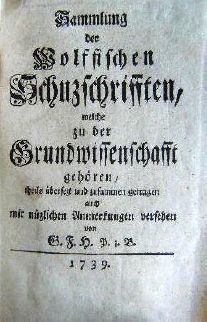
(125) WOLFF, Christian (1679-1754) Sammlung der Wolffischen Schuzschrifften, welche zu der Grundwissenschafft gehören, theils übersetzt und zusammen getragen auch mit nüzlichen Anmerkungen versehen von G[ottlieb] F[riedrich] H[agen].
[No place] 1739.
[XII],456p. Contemp. vellum, red edges. A fine copy.
First (only) edition. A collection of pieces by Christian Wolff, written in defence of accusations of atheism and Spinozism by Joachim Lange, a long academic controversy. They are here printed translated from the original Latin text, or in the original German text. Various pieces were issued separately, and/or included in Ludovici's Sammlung und Auszüge der sämmtlichen Streitschrifften wegen der Wolffischen Philosophie (1737). The volume was published as a supplementary volume to Wolff's Gesammelte kleine philosophische Schrifften. It stands alone, but has been overlooked by the Spinoza bibliographers.
The pieces included are: De differentia nexus rerum (1723, though dated 1724), Monitum ad commentationem (1724), Ausführliche Beantwortung der ungegründeten Beschuldigungen Hrs. Langens, die er auf Ordre Ihro Königl. Majest in Preussen entworffen (first printed in 1737), Kurzer Inhalt der ausführlichen Beantwortung der Langischen Beschuldigungen, Sicheres Mittel wider ungegründete Verleumdungen, wie denselben am besten abzuhelfen, and Nachricht von der neuerlich mit Herrn Joachim Langen entstandenen und geführten Streitigkeit.
(126) STRUVE, Burkhard Gotthelf (1671-1738) Bibliothecae philosophicae Struvianae emendatae emendatae continuatae atque ultra dimidiam partem auctae a Lvd. Mart. Kahlio.
Gottingae, impensis Vandenhoeck et Cunonis 1740.
2 volumes. [XII],476; [VIII],454p. Uncut in old blue boards, worn.
Fifth and last (best) edition, enlarged by Ludwig Martin Kahle. A huge annotated bibliography of philosophical literature. There are some 20 references to Spinoza, and many references to critics like Andala, Fenelon, Huet, Poiret, Van Velthuysen, Vogelsang, Wittichius, Wolff, and many others.
*Bamberger 303 (edition of 1728).
(127) BILFINGER, Georg Bernhard (1693-1750) De origine et permissione mali praecipue moralis commentatio philosophica.
Tubingae, C.H.Berger 1743.
[XVI],496p. Contemp. vellum. Modern bookplate to front free endpaper and tiny ownership inscription of the jurist and historian Gerhard Wilhelm Lodtmann dated 1752 on title. Fine copy.
Second edition, first published in 1724. A treatise on the origin and acceptability of evil, with a discussion on 'the problem of evil in the context of Spinoza's discussion of necessity' (p.307-310).
*Bamberger 396. SB 1010.
(128) Deurhoff, Willem. - NOORDKERK, Hermanus (1702- 1771) Pleydooi over Deurhofs Job, ter wederlegging overgezonden.
[No place 1743.]
4to. [II],74p. New wrappers.
First edition. In 1741 some followers decided to publish Deurhoff's sermons on Job delivered between 1708 and 1717. When the printing of the first volume of the book (Het voorbeeld van verdraagzaamheid onder de goddelyke bezoekingen, vertoond in de uitlegging en verklaaring van het boek Jobs, Knuttel 117) was finished it was confiscated by the Amsterdam authorities. It was sent to some Leiden theologians and judged blasphemous. The printer of the book was sentenced to a fine of 3000 guilders. In appeal the well-known Amsterdam lawyer Herman Noordkerk pleaded successfully against the confiscation, arguing that the prohibitions of Spinoza's Tractatus and the Opera posthuma of the 1670's did not apply to Deurhoff's book.
*Van der Linde 197. Bamberger 411 (a new edition of 1746).
(129) [FISCHER, Christian Gabriel (1686-1751)] Vernünftige Gedanken von der Natur, was sie sey? Dass sie ohne Gott und seine allweise Beschränkung unmächtig sey? Und wie die einige untheilbare göttliche Kraft, in und durch die Mittelursachen, nach dem Maass ihrer verliehenen Würkbarkeit oder Tüchtigkeit, hie in der Welt alles alleine thätig würke? Durch fleissiges Nachsinnen, überlegen und schliessen gefasset und zur Verherrlichung göttlicher Majestät, auch Förderung wichtiger Wahrheiten herausgegeben von einem Christlichen Gottes-Freunde.
[No place, no printer] 1743.
XVI,746,[30]p. Small stamp on title. Contemp. calf, back worn.
First (only) edition. A work on natural philosophy in the Wolffian tradition, yet full of rationalistic reinterpretations. Though it contains several passages in which Spinoza is criticized, the author could not escape from suspicions of Spinozism. Its publication caused great rumour among pietist theologians and the book was immediately confiscated, which explains its rarity.
Fischer was professor of natural philosophy at Königsberg and an outspoken advocate of Wolffian philosophy. When Wolff was banned from Prussia in 1725 Fischer also was forced to give up his position and fled to Danzig. He made travels to France, Italy, Holland and England and with the conclusion of the Wolff-Lange controversy in 1737 he was allowed to return to Königsberg.
*Bamberger 399. SB 6636.
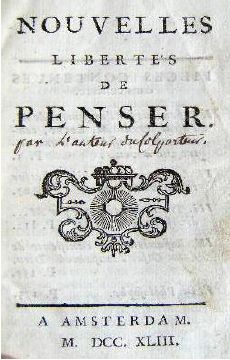
(130) [FONTENELLE, Bernard Le Bovier de (1657- 1757) & Jean Baptiste de MIRABAUD (1675-1760 ) & César Chesneau DUMARSAIS (1676- 1756)] Nouvelles libertés de penser.
Amsterdam [Paris] 1743.
12mo (8 x 13 cm). [II],204,[1 errata]p. Contemp. calf, gilt back, marbled endpapers, all edges gilt. Lower outer corner vaguely waterstained towards the end. On the title added in an old hand 'par L'auteur du Colporteur' (?). Fine copy.
First (only) edition. One of the most important and rarest collections of early anti-religious writings, 'a landmark in the history of the Enlightenment' (J. Israel). These texts had circulated in manuscript and are here published for the first time, preceding Holbach's classic Système de la nature by nearly 30 years.
It includes the following pieces: 1. Réflexions sur l'argument de M. Pascal, & de M. Locke, concernant la possibilité d'une autre vie à venir [by Fontenelle]. 2. Sentimens des philosophes sur la nature de l'ame [by Mirabaud]. 3. Traité de la liberté par M ... divisé en 4 parties [by Fontenelle]. 4. Réflexions sur l'existence de l'ame & sur l'existence de Dieu [by Dumarsais?]. 5. Le philosophe [by Dumarsais].
The third chapter of the second piece, Mirabaud's Sentimens des philosophes sur la nature de l'ame is entitled Sentiment de Spinosa (p.90-97).
(130) [FONTENELLE, Bernard Le Bovier de (1657- 1757) & Jean Baptiste de MIRABAUD (1675-1760 ) & César Chesneau DUMARSAIS (1676- 1756)] Nouvelles libertés de penser.
Amsterdam [Paris] 1743.
12mo (8 x 13 cm). [II],204,[1 errata]p. Contemp. calf, gilt back, marbled endpapers, all edges gilt. Lower outer corner vaguely waterstained towards the end. On the title added in an old hand 'par L'auteur du Colporteur' (?). Fine copy.
First (only) edition. One of the most important and rarest collections of early anti-religious writings, 'a landmark in the history of the Enlightenment' (J. Israel). These texts had circulated in manuscript and are here published for the first time, preceding Holbach's classic Système de la nature by nearly 30 years.
It includes the following pieces: 1. Réflexions sur l'argument de M. Pascal, & de M. Locke, concernant la possibilité d'une autre vie à venir [by Fontenelle]. 2. Sentimens des philosophes sur la nature de l'ame [by Mirabaud]. 3. Traité de la liberté par M ... divisé en 4 parties [by Fontenelle]. 4. Réflexions sur l'existence de l'ame & sur l'existence de Dieu [by Dumarsais?]. 5. Le philosophe [by Dumarsais].
The third chapter of the second piece, Mirabaud's Sentimens des philosophes sur la nature de l'ame is entitled Sentiment de Spinosa (p.90-97).
(131) RUES, Simeon Friedrich (1713-1748) Tegenwoordige staet der doopsgezinden of Mennoniten, in de Vereenigde Nederlanden; waeragter komt een berigt van de Rynsburgers of Collegianten ... Vertaelt en met aentekeningen ... vermeerdert [door Marten Schagen].
Amsterdam, F.Houttuyn, 1745.
XIV,[2],330,[1]p. Contemp. vellum.
First (only) Dutch edition. A sketch of the present state of the Mennonites in the Netherlands, including a sketch of the liberal religious sect of the Rijnsburg Collegiants (p.277-330). Several of the members of the Collegiants, among them Johannes Bredenburg and Franciscus Cuperus, were strongly influenced by Spinozistic ideas. Originally published in German in 1743 as Aufrichtige Nachrichten von dem gegenwärtigen Zustande der Mennoniten oder Taufgesinnten: wie auch der Collegianten oder Reinsburger. The author was a Lutheran theologian. The translator added numerous valuable annotations.
*Bamberger 407.
(132) [LA METTRIE, Julien Offray de (1709-1751)] Histoire naturelle de l'âme, traduite de l'Anglois de M. Charp, par feu M. H*** de l'Académie des Sciences, &c. Nouvelle edition revuë fort exactement, corrigée de quantité de fautes qui s'etoient glissées dans la premiere, & augmentée de la Lettre critique de M. de la Mettrie à Madame la Marquise du Chattelet.
Oxford, aux dépends de l'Auteur 1747.
12mo. [XII],12,343p. Contemp. calf, gilt back with red label, spine and corners worn.
Second revised edition. A few minor references to Spinoza and a longer note on p.216-17.
*Bamberger 406 (first edition of 1745). Stoddard 26.
(133) CANZ, Israel Gottlieb (1690-1753) Philosophiae leibnitianae et wolffianae usus in theologia per praecipua fidei capita. Editio nova emendata et indice rerum et verborum aucta.
Francofurti et Lipsiae, in officina Bergeriana [Frankfurt and Leipzig, Berger] 1749.
2 volumes. [XIV],572; [II],573-1138,[62]p. Contemp. vellum. Stamp to titles.
Second edition, first published 1728. An attempt to strengthen Lutheran theology with the help of philosophy much in the line of the Leibnizian-Wolffian tradition. This is the major book of the author, professor of philosophy and theology in Tübingen. Canz presided several university disputations dealing with Spinoza. The present volumes contain numerous references to Spinoza (e.g. p.3, 42, 219, 224, 351, 393, 403-405, 412, 427).
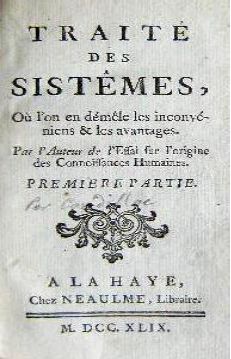
(134) [CONDILLAC, Etienne Bonnot de (1714-1780)] Traité des sistêmes, où l'on en démêle les inconvéniens & les avantages. Par l'auteur de l'Essai sur l'origine des connoissances humaines.
La Haye, chez Neaulme 1749.
2 parts in 2 volumes. 12mo. [VIII],228; [IV],[229]-449,[1 errata]p. Contemp. calf, backs richly gilt, marbled edges and endpapers. Mildly browned.
First edition. 'A vigorous criticism of those modern systems which are based upon abstract principles or upon unsound hypotheses. It is directed against the innate ideas of the Cartesians, Malebranche's faculty-psychology, Leibniz's monadism and pre-established harmony, and, above all, against the conception of substance set forth in the first part of the Ethics of Baruch Spinoza.' The tenth chapter Le Spinosisme réfuté (p.229-353) contains a long refutation of Spinoza's method.
*Van der Linde 333. Bamberger 435. SB 561.
(135) [LA ROCHE, Jacques Fontaine de (1688-1761) Critique de l'esprit des loix. [Followed by:] [MONTESQUIEU, Charles Louis de Secondat de (1689- 1755)] Defense de l'esprit des loix, a laquelle on a joint quelques eclaircissemens.
Geneve, Barrillot 1750.
2 parts in 1 volume. 28,80p. Old marbled boards, faded. Small piece of title of the first part cut away without loss.
This edition combines the attack of the abbé de La Roche against Montesquieu, first published the previous year in the Jansenist Nouvelles ecclésiastiques, with Montesquieu's defence. The anonymous author attacks Montesquieu for his supposed Spinozistic feelings, founding his philosophy on natural religion, thus destroying Christianity, ethics and government. It is mostly attributed to the Jansenist abbé Jacques Fontaine de La Roche, but also to the abbé Jean Baptiste Louis de La Roche and to the abbé Joseph de La Porte.
The original edition of the Défense was published also 1750 by the same publisher, in a 12mo edition counting 207 pages. A publisher's notice on the verso of the title of the first part confirms that the two works, though with own title pages and individual pagination and signatures, indeed were issued together.
*Bamberger 440 (first edition of the Défense), 456 (the Critique dated 1753) and 457 (the Défense dated 1753).
(135) [LA ROCHE, Jacques Fontaine de (1688-1761) Critique de l'esprit des loix. [Followed by:] [MONTESQUIEU, Charles Louis de Secondat de (1689- 1755)] Defense de l'esprit des loix, a laquelle on a joint quelques eclaircissemens.
Geneve, Barrillot 1750.
2 parts in 1 volume. 28,80p. Old marbled boards, faded. Small piece of title of the first part cut away without loss.
This edition combines the attack of the abbé de La Roche against Montesquieu, first published the previous year in the Jansenist Nouvelles ecclésiastiques, with Montesquieu's defence. The anonymous author attacks Montesquieu for his supposed Spinozistic feelings, founding his philosophy on natural religion, thus destroying Christianity, ethics and government. It is mostly attributed to the Jansenist abbé Jacques Fontaine de La Roche, but also to the abbé Jean Baptiste Louis de La Roche and to the abbé Joseph de La Porte.
The original edition of the Défense was published also 1750 by the same publisher, in a 12mo edition counting 207 pages. A publisher's notice on the verso of the title of the first part confirms that the two works, though with own title pages and individual pagination and signatures, indeed were issued together.
*Bamberger 440 (first edition of the Défense), 456 (the Critique dated 1753) and 457 (the Défense dated 1753).
(136) Riforma del carnevale. Riforma del carnevale. Novella Giapponese.
Venezia [Venice], per il Graziosi, nel secolo XVIII [c.1750].
p.III-XLV, wanting first blank but text complete. Printed within decorated borders. Uncut in recent marbled wrappers. Mildly paperspotted.
First (only) edition. An anonymous satire on the philosophy of the Enlightenment. It describes a carnival procession in Japan at the occasion of the introduction of political reforms. The procession is headed by Pierre Bayle who is followed by a great number of other philosophers, atheists, deists, pantheists, materialists, etc., including Vanini, Hobbes, Voltaire, La Mettrie and Spinoza.
(137) [CHARPENTIER, Louis.] Lettres critiques, sur divers écrits de nos jours, contraires à la religion & aux moeurs. Par M.C***.
A Londres 1751.
2 parts in 1 volume. [IV],XV,[1],175; [IV],221p. Titles with fine engraved vignettes. Contemp. calf, gilt back with red label, marbled edges and endpapers.
First (only) edition. A collection of letters on a great variety of subjects: education of children, women, novels, suicide, the blind, etc. The 20th, 21st and 22nd letter (part 2, p.149-221) deal with Spinoza: 'Vie de Spinosa, Idée générale du systême de Spinosa, & de ses principales conséquences, Réfutation abrégée du systême de Spinosa'. Nothing seems known about the author.
*Wolf 779. Bamberger 444.
(138) [FRANCOIS, Laurent (1698-1782)] Preuves de la religion de Jésus-Christ, contre les Spinosistes et les déistes. Par M.L.F. [Continued as:] Défense de la religion contre les difficultés des incredules. Par M. François. [Half-titles:] Suite des preuves de la religion.
Paris, Estienne et Jean Herissant 1754-1755.
8 volumes. 12mo. Contemp. calf, backs richly gilt with red labels, marbled endpapers, red edges, minor imperfections.
A voluminous work in defence of Christian religion, against philosophers, atheists and deists, with Spinoza as the main target.
*Van der Linde 401 (dated 1751 and without the continuation). Bamberger 451 (dated 1752 and without the continuation).
(139) BUDDEUS, Jean François (1667-1729) Traité de l'athéisme et de la superstition. Avec des remarques historiques et philosophiques. Traduit en françois par Louis Philon ... et mis au jour par Jean-Chretien Fischer.
Amsterdam & Leipzig, J.Schreuder & P.Mortier 1756.
[XXX],368,[20]p. With portrait. Contemp. vellum, red sprinkled edges. Browned.
Third (?) French edition. Originally published in 1717 in Latin as Theses theologicae de atheismo et superstitione. Buddeus (or Johannes Franz Budde) was professor of philosophy in Halle, one of the most esteemed Lutheran theologians of his time, and a prolific writer against atheism. Spinoza is his main target, among the other authors refuted are Bayle, Bruno, Collins, Cuffeler, Hobbes, Knutzen, Van Leenhof and Toland.
*Wolf 774 (Latin edition of 1737) and 775 (German edition of 1723), Bamberger 375 (French edition of 1740). SB 980 (Latin edition of 1717) and 6442 (German edition of 1723).
(140) PLUQUET, François André Adrien (1716- 1790) Examen du fatalisme, ou exposition & refutation des différens systêmes de fatalisme qui ont partagé les philosophes sur l'origine du monde, sur la nature de l'ame, & sur le principe des actions humaines.
Paris, Didot & Barrois 1757.
3 volumes. 12mo. [IV],XX,464; [II],X,532; [IV],461,[3]p. Contemp. polished calf, backs richly gilt with red label, marbled endpapers, red edges.
First edition. The first work of the author, philosopher, historian and economist, befriended with a.o. Montesquieu and Helvetius. In this his best (P. Larousse) book Pluquet investigates what has been written in ancient and modern times about the origins of the world and the springs of human actions. He analyses the arguments brought up by theologians and philosophers for and against the principles of determinism, fatalism and free will.
The second and third sections of the fifth 'époque' (chapter) of the first volume (p.349-371) are titled: Des principes de Spinosa sur l'origine & sur la nature du monde and Du progrès du Spinosisme: de Bredenbourg, de Leenhof, de Hattem, de Wachter. Pluquet rejects Spinoza's monistic philosophy as the source of modern atheism. In the introduction to the second volume he writes that 'all systems that suppose only one substance in the world derive from the Spinozism'.
*Bamberger 482. Wolf 899.
(141) MONTESQUIEU, Charles Louis de Secondat de (1689-1755) Miscellaneous pieces. Translated from the new edition of his works in quarto printed at Paris.
London, printed for D.Wilson and T.Durham 1759.
VI,[2],334p. Contemp. calf, front hinge cracked but holding, rubbed and somewhat worn. Title nicely ruled in red, margins of endpapers strongly, of a few pages in beginning and end slightly browned.
First English edition. Among these pieces is the Defence of the Spirit of Laws (p.235-334), originally published in French in 1750. It was written as a defence against accusations of Spinozism made by the abbé Fontaine de la Roche in the Jansenist journal Nouvelles ecclésiastiques of 1749.
*Bamberger 488.
(142) Traité des trois imposteurs. Le livre des trois imposteurs M[oïse] J[esus] M[ahomet]. De tribus famosissimis nationum deceptoribus.
[c.1760.]
Manuscript in ink in a legible hand on paper. Small 4to (20,1 x 15,6 cm). 132p., approx. 21 lines a page within a single line frame. Modern half vellum, back with red label. Inner margin of a few leaves strengthened.
An eighteenth century manuscript of the famous Treatise of the three impostors, an atheistic tract in which the three major figures of world religion Muhammad, Jesus and Moses are unmasked as impostor. 'No single French language text of the century caused more alarm; even Voltaire was horrified by its contents.'
The tract was printed in 1719 in Holland with the title Esprit de Monsieur Benoit de Spinosa, and then issued together with a Vie de Monsieur Benoit de Spinosa, known as the earliest biography of Spinoza. Not surprisingly the book was severely prosecuted and printed copies were so difficult to get that manuscript copies kept circulating during the whole eighteenth century. The book was printed again not before 1768 when it became available for a broad public.
The title of the treatise suggests that it is a French translation of a mysterious atheistic treatise of which was talked during the whole sixteenth century. Though no one had ever seen this tract known as De tribus impostoribus about all scholars under suspicion of heterodox beliefs, from Averroes to Vanini, were named as its author. In 1712 Bernard de La Monnoye, poet and philologist, published an article in which he doubted that the treatise had ever existed. This was contradicted in a Réponse in which the (anonymous) author tells a story that he had seen the manuscript when he visited a Frankfurt bookseller in April 1706 and, since he could not afford buying, had made a French translation. The manuscript included a 'letter' from the Holy Roman Emperor Frederick II and he therefore concluded that it was written in the thirteenth century. It has been suggested that the whole story was made up by the publisher in the hope to profit from the popularity of that mysterious title.
About the authorship of the Traité nothing seems decided. It has been attributed to Jean Maximilien Lucas, 'friend and disciple of Spinoza', the probable author of the Vie, to Jan Vroes (also Vroese, or Vroesen), to Henri de Boulainvilliers (by Bamberger), who would have written it with the intention to give 'nothing more than a brief summary of Spinozistic ideas', to Jean Rousset de Missy, most likely responsible for the Réponse, and to others.
Our manuscript includes the Réponse, though with the title Dissertation, and erroneously attributed (by another hand) to La Monnoye. It is constituted as follows: Dissertation ... sur le livre des trois imposteurs (p.3-20), Frederic Empereur au tres illustre Othon mon tres fidel ami (p.21-22), [Traité des trois imposteurs] (p.25-132). The Traité is divided into chapters as follows: De Dieu (p.25- 33), Des raisons qui ont porté les homes [sic] a se figurer un Etre invisible ou ce qu'on nomme communement Dieu (p.34-52), Ce que signifie le mot religion, comment et pour quoi il s'en est glissé un si grand nombre dans le monde (p.53-81), De la politique de Jesus christ (p.83-89), De la morale de Jesus christ (p.90-107), Verités sensibles (p.109-113), De l'ame (p.115-121), Des esprits qu'on nomme demons (p.123-131), Table (p.132).
*Van der Linde 99-103 (printed editions). Wolf 306-313 (printed editions and manuscripts). Bamberger 578, 539, 542, 605 and 615 (printed editions) and 665-669 (manuscripts).
The tract was printed in 1719 in Holland with the title Esprit de Monsieur Benoit de Spinosa, and then issued together with a Vie de Monsieur Benoit de Spinosa, known as the earliest biography of Spinoza. Not surprisingly the book was severely prosecuted and printed copies were so difficult to get that manuscript copies kept circulating during the whole eighteenth century. The book was printed again not before 1768 when it became available for a broad public.
The title of the treatise suggests that it is a French translation of a mysterious atheistic treatise of which was talked during the whole sixteenth century. Though no one had ever seen this tract known as De tribus impostoribus about all scholars under suspicion of heterodox beliefs, from Averroes to Vanini, were named as its author. In 1712 Bernard de La Monnoye, poet and philologist, published an article in which he doubted that the treatise had ever existed. This was contradicted in a Réponse in which the (anonymous) author tells a story that he had seen the manuscript when he visited a Frankfurt bookseller in April 1706 and, since he could not afford buying, had made a French translation. The manuscript included a 'letter' from the Holy Roman Emperor Frederick II and he therefore concluded that it was written in the thirteenth century. It has been suggested that the whole story was made up by the publisher in the hope to profit from the popularity of that mysterious title.
About the authorship of the Traité nothing seems decided. It has been attributed to Jean Maximilien Lucas, 'friend and disciple of Spinoza', the probable author of the Vie, to Jan Vroes (also Vroese, or Vroesen), to Henri de Boulainvilliers (by Bamberger), who would have written it with the intention to give 'nothing more than a brief summary of Spinozistic ideas', to Jean Rousset de Missy, most likely responsible for the Réponse, and to others.
Our manuscript includes the Réponse, though with the title Dissertation, and erroneously attributed (by another hand) to La Monnoye. It is constituted as follows: Dissertation ... sur le livre des trois imposteurs (p.3-20), Frederic Empereur au tres illustre Othon mon tres fidel ami (p.21-22), [Traité des trois imposteurs] (p.25-132). The Traité is divided into chapters as follows: De Dieu (p.25- 33), Des raisons qui ont porté les homes [sic] a se figurer un Etre invisible ou ce qu'on nomme communement Dieu (p.34-52), Ce que signifie le mot religion, comment et pour quoi il s'en est glissé un si grand nombre dans le monde (p.53-81), De la politique de Jesus christ (p.83-89), De la morale de Jesus christ (p.90-107), Verités sensibles (p.109-113), De l'ame (p.115-121), Des esprits qu'on nomme demons (p.123-131), Table (p.132).
*Van der Linde 99-103 (printed editions). Wolf 306-313 (printed editions and manuscripts). Bamberger 578, 539, 542, 605 and 615 (printed editions) and 665-669 (manuscripts).
(143) FÖRSTER, Johann Christian (1735-1798) Philosophische Abhandlung über die Wunderwerke.
Halle im Magdeburgischen, Johann Jacob Curts 1761.
Small 8vo. [XX],284p. With engraved vignette on title. Modern calf-backed boards, gilt back.
First (only) edition. A critical discussion on miracles, with references to the opinions of Spinoza, Clarke, Locke, Malebranche, Bayle, Leibniz a.o. The author was professor of philosophy in Halle, and author of a history of the University of Halle and a biography of Johann Peter Süssmilch.
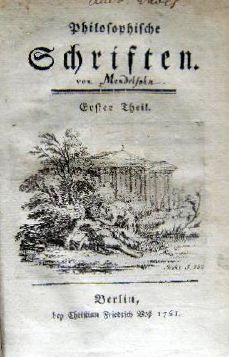
(144) MENDELSSOHN, Moses (1729-1786) Philosophische Schriften.
Berlin, Christian Friedrich Voss 1761.
2 volumes in 1. Small 8vo. [XVI],256; 228p. With engraved frontispiece and vignette on both titles. Nineteenth-century half cloth, gilt back, marbled sides. Only mildly browned. Bound with: An die Freunde Lessings. Ein Anhang zu Herrn Jacobi Briefwechsel über die Lehre des Spinoza. Berlin, Christian Friedrich Voss 1786. XXIV,87p.
First edition. A revised version of Mendelssohn's Philosophische Gespräche (p.181-256), published in 1755 without his consent by his friend Lessing, with whom Mendelssohn had discussed Spinoza's philosophy. Mendelssohn was an orthodox Jew and a philosopher in the Leibnizian-Wolffian tradition. However, he also wanted to rehabilitate Spinoza as a vital link between Descartes and Leibniz. Spinoza, he argued, had always been encountered as a stubborn atheist, simplified and demonized, but it was Spinoza who was the true originator of the Leibnizian concept of pre-established harmony.
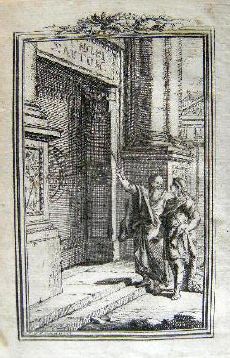
Spinoza, he wrote, 'was a sacrifice for the human intellect, but one that deserves to be decorated with flowers; without him, philosophy would never have been able to extend its borders so far' (translation by Daniel O. Dahlstrom).
*Wolf 861 and 862 (editions of 1777). Bamberger 492. SB 963.
Second work: First edition, second issue. A defence of his friend Lessing against Friedrich Heinrich Jacobi's portrayal of Lessing as a Spinozist, i.e. an atheist, in Jacobi's Ueber die Lehre des Spinoza in Briefen an den Herrn Moses Mendelssohn. It was Mendelssohn's last book, finished a few days before his death.
*Van der Linde 335. Wolf 868. Bamberger 573. SB 1955.
*Wolf 861 and 862 (editions of 1777). Bamberger 492. SB 963.
Second work: First edition, second issue. A defence of his friend Lessing against Friedrich Heinrich Jacobi's portrayal of Lessing as a Spinozist, i.e. an atheist, in Jacobi's Ueber die Lehre des Spinoza in Briefen an den Herrn Moses Mendelssohn. It was Mendelssohn's last book, finished a few days before his death.
*Van der Linde 335. Wolf 868. Bamberger 573. SB 1955.
(145) [LA METTRIE, Julien Offray de (1709-1751)] Oeuvres philosophiques.
Amsterdam, [no printer] 1764.
3 volumes in 1. 12mo. 62,[10],230,[4]; 326; 108p. Contemp. half calf, gilt back.
One of various collected editions, printed in a very small type. It is apparently rare, with a few library holdings in the U.S. only. Constituted as follows: 1. Discours préliminaire. Dédicace à M. Haller. L'Homme machine. Traité de l'âme. 2. Abrégé des systemes. Les animaux plus que machines. L'Homme plante. Systeme d'Epicure. Anti-Séneque. L'Art de jouir. 3. L'Homme plus que machine.
Throughout La Mettrie's philosophical writings there are scattered references to Spinoza. However, as Jonathan Israel notes, 'it is far from clear that he ever studied Spinoza seriously ... and all his references to him are very general or exceedingly vague'. In a short chapter of his Abrégé des systemes dedicated to Spinoza (volume 2, chapter 7, p.33-36) La Mettrie draws a parallel between Spinoza's determinism and his own materialism: 'Suivant Spinosa encore, l'homme est un véritable automate, une machine assujettie à la plus constante nécessité, entraînée par un impétueux fatalisme, comme un vaisseau par le courant des eaux. L'Auteur de L'Homme-machine semble avoir fait son livre exprès pour défendre cette triste vérité'.
Other chapters of the Abrégé des systemes treat Descartes, Malebranche, Leibniz, Wolf, Locke and his teacher in Leiden Boerhaave.
*Bamberger 537 (edition of 1774). Stoddard 65.
(146) [FRERET, Nicolas (1688-1749)] Lettre de Thrasibule à Leucippe. Ouvrage posthume de M.F.....
Londres [1766].
12mo. 312,[1 errata]p. Contemp. calf, hinges cracked but holding, red edges.
First edition. A study in comparative religion from an atheist and materialist point of view. Bamberger notes that the Spinozistic character has been asserted by authors like Wade, Vernière and Mauthner. Probably written around 1720 it had circulated as a manuscript for decades, disguised as a translation from the English. It has for a long time been attributed to Holbach, Boulainvilliers and others, but is now usually attributed to Freret, classical and Chinese scholar and industrious historian.
*Bamberger 516 (edition of 1768). Vercruysse p.38.
(148) BOULAINVILLIERS, Henri de (1658-1722) Doutes sur la religion. Suivies de l'analyse du traité, theologi-politique de Spinosa.
Londres 1767.
Small 8vo. [IV],103p. Contemp. calf, marbled endpapers, red edges, rubbed and heavily worn. Bound with another work.
First (only) edition. Two radical philosophical treatises that had circulated as clandestine manuscripts for decades. The Doutes sur la religion (p.1-54) is a sharp attack on revealed religion. It has also been attributed to Guéroult de Pival.
The Analyse (p.55-103) shows clear sympathy with Spinoza, above all with his bible criticism, but Wade denounces it as an analysis 'strangely truncated, misinterpreted, and misrepresented'. It is usually, though without certainty, attributed to Boulainvilliers. Boulainvillers, a French nobleman, industrious historian and philosopher, occupied himself thoroughly with Spinoza. A French translation of the Ethics and several anti-religious and/or Spinozistic clandestine manuscripts are attributed to him. Though initially very critical he developed, as Jonathan Israel writes, 'into a fully-fledged Spinozist who rejected not just revealed religion but all notion of a providential God and an absolute morality'.
*Van der Linde 376. Wolf 768 ('extra-ordinary scarce'). Bamberger 509.
(149) TOLAND, John (1670- 1722) Lettres philosophiques sur l'orgine des préjugés, du dogme de l'immortalité de l'ame de l'idolâtrie & de la superstition; sur le systême de Spinosa & sur l'origine du mouvement dans la matiere. Traduites de l'Anglois.
Londres, [no printer] 1768.
Small 8vo. [II],II,267p. Contemp. half calf, rubbed and somewhat worn. Cancelled bookplate to front paste-down.
First French edition of Letters to Serena (1704), translated by the baron d'Holbach. The fourth and fifth letter dealing with Spinoza occupy here pages 154-267.
*Van der Linde 330 (English edition). Bamberger 518. Wolf 928. SB 6486 (English edition). Spinozahuis /263. Vercruysse 1768 D3.
(150) Traité des trois imposteurs. Traité des trois imposteurs.
Yverdon, de l'imprimerie du Professeur de Felice 1768.
Small 8vo. 143,[1]p. Uncut in trivial wrappers, ample margins. Bookplate to inside front cover.
The famous Treatise of the three impostors was first printed in 1719 together with the earliest biography of Spinoza under the title La vie et l'esprit de Mr. Benoit de Spinosa, and again the next year in Frankfurt, but very few copies survived. Manuscript copies kept circulating during the whole eighteenth century, but it was not printed again before 1768, when two editions were published: the present edition, and one without imprint, attributed to the famous Amsterdam printer M.M. Rey. The next years several new editions followed. The Traité is here followed by Sentimens sur le traité des trois imposteurs, Reponse a la dissertation de M. de la Monnoye, sur le traité des trois imposteurs, and Copie de l'article IX du tome Ier, seconde partie des Mémoires de littérature, imprimés à la Haye, chez Henri du Sauzet, en 1716.
The second piece is a letter in which the origins of the manuscript are explained, probably made-up to profit from the popularity of the title of the secret manuscript. It is signed at end 'J.L.R.L.' and followed by a printed note that the author of this letter was Pierre Frédéric Arpe 'de Kiel, dans le Holstein ... auteur de l'apologie de Vanini', but it is usually attributed to Jean Rousset de Missy, often quoted as author of also the Traité.
*Van der Linde 99-103 (other editions). Wolf 309 (the other edition of 1768).
(151) [VOLTAIRE (1694-1778)] Recueil nécessaire. Avec l'évangile de la raison.
Londres [Amsterdam, Rey?] 1768.
2 volumes. [II],VI,276; [2],300p. Contemp. calf, backs richly gilt with double red labels, all sides with gilt triple line borders, marbled edges and endpapers. A very fine set. Table of contents erroneously bound at the beginning of the first volume.
These volumes, first published in 1765, include a collection of anti- religious and anti-clerical pieces, partly written by Voltaire and partly by others, yet put together by him. The pieces by Voltaire in which, according to Bamberger, the influence of Spinoza becomes clear are Sermon des cinquante (volume 1, p.136-172), Catéchisme de l'honnête homme (volume 1, p.99-135), and Examen important, par Milord Bolingbroke (volume 2, p.1-177).
Among the pieces written by others are Analyse de la religion chrétienne (volume 1, p.1-70) by César Chesneau Dumarsais, for which Spinoza's Tractatus has been pointed out as a main source. The final part is Jean Meslier's Testament (volume 2, p.204-300), preceded by a short biography by Voltaire.
*Bamberger 504 (first edition of 1765).
(152) VALSECCHI, Antonino (1708-1791) Dei fondamenti della religione e de' fonti dell' empieta libri tre.
Torino, appresso Michel' Angelo Morano 1769-1770.
3 volumes. XXIV,320; XX,420; XXIV,470,[2]p. Contemp. calf, gilt backs with labels, red edges.
Much enlarged edition, first published in 1765. A defence of revealed religion against the English deists and the French rationalist philosophers and their atheistic forerunners, including Spinoza. The author was a Dominican and professor of theology at the University of Padua.
*Bamberger 503, 511 and 520 (other editions).
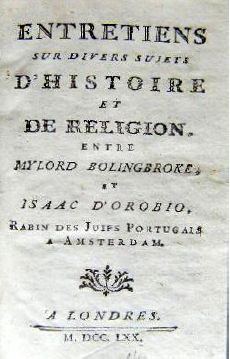
(153) [LA CROZE, Mathurin Veyssiere de (1661- 1739)] Entretiens sur divers sujets d'histoire et de religion entre Mylord Bolingbroke, et Isaac d'Orobio, rabin des Juifs Portgais a Amsterdam.
A Londres, [no printer] 1770.
Small 8vo. [IV],450p. Contemp. calf, gilt back with green label, red edges. Stamp to p.1 and a few minor imperfections.
Fictious discussions between the enlightened political philosopher Henry St John, viscount Bolingbroke, and the physician, philosopher and eminent member of the Amsterdam Jewish community - but not a rabbi as the title says - and opponent of Spinoza, Isaac Orobio de Castro on religious tolerance and atheism.
These dicussions occupy about the first half of the volume and are followed by a Dissertation sur l'athéisme et sur les athées modernes. In it, La Croze first treats the ideas of Giordano Bruno. He includes the Lettre de Gaspar Scioppius, sur la mort de Jordanus Brunus (p.285-300), and discusses the conformity between the principles of Bruno and Spinoza. He then discusses the origin of the Traité des trois imposteurs, the ideas of Lucilio Vanini and Matthias Knutzen, including a reproduction of the latter's famous letter Amicus Amicis Amica (p.397-409), in Latin and in French translation, and the miserable fate of the Polish atheist Casimir Liszynski (Lyszczynski).
The author was a Benedictine historian and orientalist. He converted to protestantism and became librarian of Frederick the Great and professor of philosophy. This book first appeared in Cologne in 1711, and was reprinted in 1733 and 1740.
*Bamberger 526.
(153) [LA CROZE, Mathurin Veyssiere de (1661- 1739)] Entretiens sur divers sujets d'histoire et de religion entre Mylord Bolingbroke, et Isaac d'Orobio, rabin des Juifs Portgais a Amsterdam.
A Londres, [no printer] 1770.
Small 8vo. [IV],450p. Contemp. calf, gilt back with green label, red edges. Stamp to p.1 and a few minor imperfections.
Fictious discussions between the enlightened political philosopher Henry St John, viscount Bolingbroke, and the physician, philosopher and eminent member of the Amsterdam Jewish community - but not a rabbi as the title says - and opponent of Spinoza, Isaac Orobio de Castro on religious tolerance and atheism.
These dicussions occupy about the first half of the volume and are followed by a Dissertation sur l'athéisme et sur les athées modernes. In it, La Croze first treats the ideas of Giordano Bruno. He includes the Lettre de Gaspar Scioppius, sur la mort de Jordanus Brunus (p.285-300), and discusses the conformity between the principles of Bruno and Spinoza. He then discusses the origin of the Traité des trois imposteurs, the ideas of Lucilio Vanini and Matthias Knutzen, including a reproduction of the latter's famous letter Amicus Amicis Amica (p.397-409), in Latin and in French translation, and the miserable fate of the Polish atheist Casimir Liszynski (Lyszczynski).
The author was a Benedictine historian and orientalist. He converted to protestantism and became librarian of Frederick the Great and professor of philosophy. This book first appeared in Cologne in 1711, and was reprinted in 1733 and 1740.
*Bamberger 526.
(154) GENOVESI, Antonio (1712-1769) Universae christianae theologiae elementa dogmatica, historica, critica. Editio prima.
Venetiis [Venice], Jo. Baptistae Pasquali 1771.
2 volumes. 4to. VIII,264; [IV],242p. Contemp. vellum, darkened and worn.
First edition. Genovesi was a moderately enlightened Italian philosopher. He investigated in two books (Elementa Metaphysicae, 1743 and Elementorum artis logico-criticae, 1745) Cartesian, Leibnizian-Wolffian, and Newtonian and Lockian philosophy. He approved of them partly but found none of them sufficiently adequate to reconcile reason and faith. He considered the radical deists, inspired by Spinoza's bible criticism, as a danger for a moral society. Nevertheless he experienced much opposition from the church and the scholastic theologians.
Genovesi decided to more precisely set out his ideas in a new book, the present Elements of universal Christian theology. In it, he treated recent developments in theology and defended the freedom to discuss them. When the manuscript became known accusations of heterodoxy and even Socinianism were repeated and Genovesi decided to not publish it. It was printed for the first time in 1771, only shortly after his death.
Genovesi turned away from philosophy as a 'seductive but hopeless quest' and started to occupy himself with administrative and economic issues. In 1754 he was appointed the first professor of economics at the University of Naples. The present volume was refuted by Antonio Vetrani in his Animadversiones theologico-criticae in universam Antonii Genuensis theologiam, 1775.
First Dutch edition of Montesquieu's De l'esprit des loix (1748), followed by the first Dutch edition of his Défense de l'esprit des loix (1750) (volume 4, p.211-276), never published separately in Dutch.
The first volume includes translations of Montesquieu's preface and foreword, his speech of 24 January 1726, d'Alembert's eulogy from the fifth volume of the Encyclopedie and his Analyse de l'Esprit des loix, and a list of subscribers (continued in the second volume). The last volume includes a translation of the Defence of the spirit of laws (p.211-276), originally published in French in 1750. It was written as a defence against accusations of Spinozism made by the abbé Fontaine de la Roche in the Jansenist journal Nouvelles ecclésiastiques of 1749.
This edition also includes annotations from an 'anonymous author', most likely the (also anonymous) translator. A new Dutch translation, by Dirk Hoola van Nooten, appeared 1783-87.
*Bamberger 440 (French edition of 1750).
The first volume includes translations of Montesquieu's preface and foreword, his speech of 24 January 1726, d'Alembert's eulogy from the fifth volume of the Encyclopedie and his Analyse de l'Esprit des loix, and a list of subscribers (continued in the second volume). The last volume includes a translation of the Defence of the spirit of laws (p.211-276), originally published in French in 1750. It was written as a defence against accusations of Spinozism made by the abbé Fontaine de la Roche in the Jansenist journal Nouvelles ecclésiastiques of 1749.
This edition also includes annotations from an 'anonymous author', most likely the (also anonymous) translator. A new Dutch translation, by Dirk Hoola van Nooten, appeared 1783-87.
*Bamberger 440 (French edition of 1750).
(156) BULLET, Jean Baptiste (1699-1775) Réponses critiques a plusieurs difficultés proposées par les nouveaux incrédules sur divers endroits des livres saints.
Paris, Charles Pierre Berton 1773-75.
3 volumes. 12mo. [VIII],568; [IV],533,[3]; [IV],520,[4]p. Contemp. calf, backs richly gilt with double label, marbled edges and endpapers.
First edition. A refutation of modern bible criticism, against authors like Voltaire, Bayle, Jean le Clerc, Dom Calmet and Bolingbroke. There are a few references to Spinoza, most extensively in the chapter on miracles (vol.2, p.492-504). The author was a French historian and professor of theology in Besançon. A German edition was published in 1784.
(157) [VETRANI, Antonio.] Animadversiones theologico-criticae in universam Antonii Genuensis theologiam.
Neapoli [Naples], ex typographia Paciana 1775.
[VI],333,[1]p., wanting a1 (half-title?). Contemp. vellum, part of vellum of front cover gone.
First (only) edition. An apology of scholastic theology and a refutation of Antonio Genovesi's Universae christianae theologiae elementa dogmatica, historica, critica (1771). A large part (p.69-201) is dedicated to Spinoza and Spinozistic ideas in the history of philosophy.
(158) JERUSALEM, Karl Wilhelm (1747-1772) Philosophische Aufsätze. Herausgegeben von Gotthold Ephraim Lessing. Braunschweig, in der Buchhandlung des Fürstl.
Waisenhaus 1776.
Small 8vo. [XII],116p. Old boards, back worn. Somewhat browned.
First edition, one of two issues. The third essay Ueber die Freyheit (p.19-56) reports a discussion between Lessing and the author on the freedom of will. Jerusalem wins Lessing over to his side by citing, without mentioning him by name, Spinoza's views. Bamberger adds that Lessing's notes to this essay (p.111-113) are in a way a confessio Spinozistica, many years before he declared himself a Spinozist in his discussion with Jacobi.
*Bamberger 544. SB 186.
(159) VALSECCHI, Antonino (1708-1791) La religion vincitrice. Opera ... relativa ai libri De' fondamenti della religione e dei fonti dell' empietà .
Padova, nella stamperia del Seminario, appresso Giovanni Manfrè 1776.
2 volumes in 1. 4to. XVIII,[2],224; XII,299p. With 2 title vignettes and numerous head- and tail-pieces. Contemp. vellum.
First edition. A defence of revealed religion, particularly directed against Holbach's Systême de la nature of 1770 (here attributed to Mirabaud, Holbach's name remains unmentioned), Fréret's Examen critique des apologistes de la religion chrétienne (1766), and other works of these writers and of other enlightened philosophers. According to Valsecchi, Spinoza is 'at the root of their thought or forms its logical culmination' (Bamberger). This is a supplement to the author's Dei fondamenti della religione of 1765.
*Bamberger 547.
(160) DU VOISIN, Jean Baptiste (1744-1813) L'Autorité des livres de Moyse, établie et défendue contre les incrédules.
Paris, Charles Pierre Berton 1778.
Small 8vo. XII,512p. Contemp. calf, gilt back with red label.
First (only) edition. A defence of the authenticity of the Books of Moses against the bible criticism of Richard Simon, Voltaire and others, with several references to Spinoza as one of their prime sources. The abbé Du Voisin was professor at the Sorbonne, royal censor and bishop of Nantes.
*Bamberger 552.
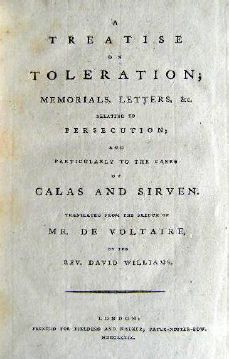
(161) VOLTAIRE (1694-1778) A treatise on toleration; The ignorant philosopher; and A commentary on the Marquis of Becaria's Treatise on crimes and punishments. Translated from the last Geneva edition ... by the Rev. David Williams.
London, printed for Fielding and Walker 1779.
3 parts in 1 volume. [IV],IV,224 [i.e.234],[II],III,[1],86,[II],II,50p. Contemp. calf, gilt back with label, upper joint cracked but holding.
First edition of this collection of Williams' translations of Voltaire's Traité sur la tolérance (1763), Le philosophe ignorant (1766) and Commentaire sur le livre des délits et des peines (1766), with a general title page and three separate title pages. Voltaire's highly critical opinion on Spinoza becomes clear in chapter XXIV (p.25-31) of The ignorant philosopher. He praises Spinoza's character, but rejects his philosophy. 'I would observe of Spinosa, that he very sincerely deceived himself. It appears to me, that he never discarded from his system those ideas which might incommode him, meerly because he was too full of his own ... he over-turned all the principles of morality, while he himself was rigidly virtuous ...'
*Wolf 938. Bamberger 556.
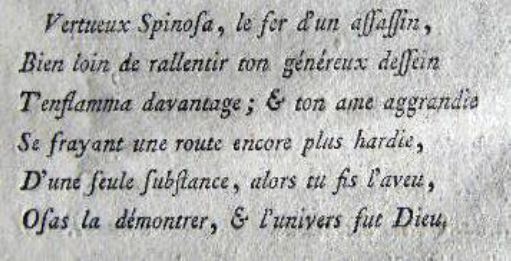
(162) [MARECHAL, Pierre Sylvain (1750- 1803)] Ad majorem gloriam virtutis. Fragmens d'un poeme moral sur Dieu.
A Atheopolis [Neuchatel, Société typographique], l'an premier du regne de la Raison 1781.
91p. With numerous woodcut vignettes. Uncut in contemp. marbled wrappers. Title somewhat dust soiled.
First edition. In the prologue to his 'moral poem on God' Maréchal, utopian anarchist and 'man without God', shows his indebtedness to Spinoza: 'Vertueux Spinosa, le fer d'un assassin,/ Bien loin de rallentir ton généreux dessein/ T'enflamma davantage; & ton ame aggrandie/ Se frayant une route encore plus hardie,/ D'une seule substance, alors tu fis l'aveu,/ Osas la démontrer, & l'univers fut Dieu'. It appeared anonymously and without the name of the publisher, and at least part of the edition was seized by the French police.
*Bamberger 559. Dommanget p.75 & 447.
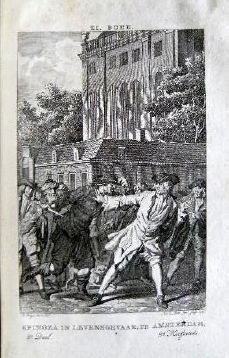
(163) [BASNAGE DE BEAUVAL, Jacques (1653- 1723)] De historie der Jooden van den tyd van Jesus Christus tot op den tegenwoordigen tyd. Om te dienen tot een vervolg of derde deel op de werken van Flavius Josephus. Uit het Fransch vertaald.
Amsterdam, J. van Gulik 1784.
VIII,696p. With 11 engraved plates. Contemp. half calf, gilt back with labels identifying it as a third volume of the work of Flavius Josephus, top of back damaged.
First edition thus. An abridged Dutch translation of Basnage's famous history of the Jews. The ninth and last chapter treats the history of the Jews in Holland, Spinoza is treated on p.665-669. One plate (by J.Buys, del. and N.v.d.Meer, sculp.) depicts the attack on Spinoza in Amsterdam in 1656.
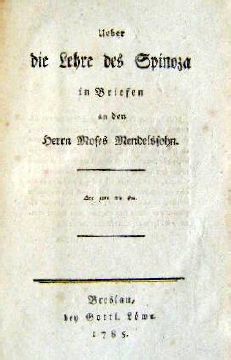
(164) JACOBI, Friedrich Heinrich (1745-1819) Ueber die Lehre des Spinoza in Briefen an den Herrn Moses Mendelssohn.
Breslau, Gottl. Löwe 1785.
Small 8vo. [XII],215,[1 errata]p. Contemp. marbled boards, back with (chipped) label, red edges. Bookplate of Friedrich Lessing to front paste-down, three old former owner's names to front free endpaper. A nice copy.
First edition, first issue. This copy is complete with Goethe's famous 4-page misotheist poem Prometheus. This poem is here printed for the first time, without Goethe's name and clearly without his permission. It is printed on a separate leaf to enable the bookseller to remove it without giving the buyer the idea that the book is incomplete. It is usually found after page 48, but here bound between the title-page and another poem by Goethe Edel sey der Mensch. A note on page 11 reads 'S. das Gedicht am Ende des Briefes'. In the second issue for obvious reasons this note was replaced by 'Dieses in sehr hartem Ausdruck gegen alle Vorsicht gerichtete Gedicht kann aus guten Ursachen hier nicht mitgeteilt werden'. When Jacobi visited Lessing in Wolfenbüttel in July 1780 he showed him a manuscript copy of this poem. Jacobi was shocked when Lessing told him that he liked the poem, and that 'there is no other philosophy than the philosophy of Spinoza'.
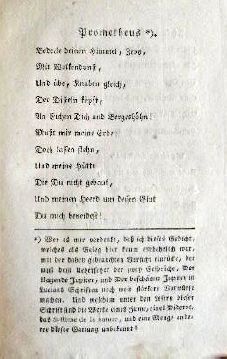
When Jacobi in 1783 heard that Lessing's friend Mendelssohn was planning a biography of Lessing, who died in 1781, he decided that Mendelssohn should know about this. Mendelssohn however was reluctant to include a refutation of Spinoza in a book about Lessing. A long correspondence between Jacobi, Mendelssohn and their mutual friends Elise and Johann Reimarus followed. Mendelssohn decided to publish a book about his own philosophical opinions and his own understanding of Spinoza, however without involving Lessing's opinions (Morgenstunden, oder Vorlesungen über das Daseyn Gottes).
Jacobi, angry about Mendelssohn's refusal to discuss Lessing's Spinozism publicly, decided to publish his letters to Mendelssohn in the the present volume. This was the beginning of the Pantheismusstreit, the great intellectual debate on the relation between Spinozism, pantheism, rationalism and atheism, joined by Claudius, Fichte, Hamann, Hegel, Herder, Heydenreich, Kant, Schelling, Wizenmann, and others.
*Van der Linde 334. Wolf 828. Bamberger 564. SB 1654.
Jacobi, angry about Mendelssohn's refusal to discuss Lessing's Spinozism publicly, decided to publish his letters to Mendelssohn in the the present volume. This was the beginning of the Pantheismusstreit, the great intellectual debate on the relation between Spinozism, pantheism, rationalism and atheism, joined by Claudius, Fichte, Hamann, Hegel, Herder, Heydenreich, Kant, Schelling, Wizenmann, and others.
*Van der Linde 334. Wolf 828. Bamberger 564. SB 1654.
(165) WEISSENBACH, Joseph Anton (1734-1801) Nova forma theologiae biblicae, his temporibus accomodatae, sive examen locorum eorum ...
Augustae [Augsburg], in officina Libraria Joseph-Wolffiana 1785.
3 volumes in 2, volume 1 and 2 bound in 1. Small 8vo. [X],254,[2]; 304; 348p. Contemp. gray boards, red edges, backs with gilt label, backs little worn..
First (only) edition. The author was a Swiss Jesuit and professor of theology. He published over 70 books, many of which were directed against enlightened theologians and philosophers. In the present volumes Voltaire is one of his major targets, but there are several references to Spinoza: volume I, Book 1 (Questio 1) and Book 2 (Questio 10 and 28), in volume II, Book 3 (Questio 4 and 39) and Book 4 (Questio 14), and in volume III, Book 6 (Questio 15).
(166) JACOBI, Friedrich Heinrich (1745-1819) Wider Mendelssohns Beschuldigungen betreffend die Briefe über die Lehre des Spinoza.
Leipzig, Georg Joachim Goeschen 1786.
Small 8vo. [II],VII,[1],127p. With allegorical frontispiece and large vignette on last page. Contemp. boards.
First (only) edition. A reply to Mendelssohn's An die Freund Lessings, published earlier the same year to defend his friend Lessing against Jacobi's portrayal of Lessing as a Spinozist, i.e. an atheist, in his Ueber die Lehre des Spinoza. Jacobi here repeats and elucidates his repugnance to enlightenment rationalism, inevitably leading to fatalism and atheism.
*Van der Linde 337. Wolf 830. Bamberger 570. SB 1234.
First (only) edition. A discussion of the arguments for the existence of God as presented by Mendelssohn in his Morgenstunden. Though in his preface Jakob writes that he is not explicitly concerned with the Pantheismusstreit he yet discusses the various forms of rationalism and idealism in the ninth lecture Ueber Idealismus, Epikureismus und Spinozismus (p.178-193). Jakob became professor in Halle in 1791 and there lectured Kantian philosophy and political economy.
Kant's Einige Bemerkungen express his position in the pantheism controversy. They were written on request of Jakob and are here printed for the first time, occupying pages XLIX-LX.
*Van der Linde 347 note (Kant's work). Wolf 878. Bamberger 571. SB 2267. Warda 110.
Kant's Einige Bemerkungen express his position in the pantheism controversy. They were written on request of Jakob and are here printed for the first time, occupying pages XLIX-LX.
*Van der Linde 347 note (Kant's work). Wolf 878. Bamberger 571. SB 2267. Warda 110.
(168) [WIZENMANN, Thomas (1759-1787)] Die Resultate der Jacobischen und Mendelssohnschen Philosophie; kritisch untersucht von einem Freywilligen.
Leipzig, G.J.Göschen 1786.
16mo. [II],255p. Contemp. marbled boards, back with ms. label, red edges. Stamp to title, verso and p.3., corners of most leaves with unobtrusive fold.
First (only) edition. A truely original and highly important contribution to the pantheism controversy. It was highly appreciated by Kant and the starting point for Kant's reflections on the controversy.
Wizenmann was a close friend of Friedrich Heinrich Jacobi, and largely shared the latter's belief that a purely rational demonstration of natural religion was impossible and that 'all philosophy ends in Spinozism'. Wizenmann argued that there is no essential difference between Jacobi's and Mendelssohn's views on the authority of reason. But he criticizes the latter's unclear position concerning the relationship between common sense and reason. Bamberger valued it as 'a skillful presentation of Christian positivism against Mendelssohn's rationalism and Spinoza's atheism'.
Wizenmann had been suffering from tuberculosis for years and it has been said that the working at the present volume had weakened him so much that he died shortly after he had finished it. If so, he was after Mendelssohn the second victim of the pantheism controversy.
*Van der Linde 340. Bamberger 577. SB 1669.
(169) EICHHORN, Johann Gottfried (1752-1827) Benedict von Spinoza über heilige Schrift, Judenthum, Recht der höchsten Gewalt in geistlichen Dingen und Freyheit zu philosophiren. Aus dem Lateinischen. [In:] Allgemeine Bibliothek der biblischen Litteratur. Erster Band. p.149-151.
Leipzig, Weidmanns Erben und Reich 1787.
[3]p. Old wrappers.
A short review of the first volume of Spinoza's Philosophische Schriften published earlier the same year.
*SB 7032.
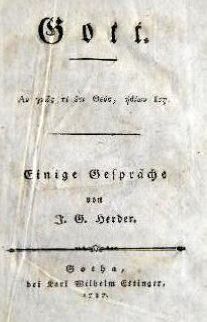
(170) HERDER, Johann Gottfried (1744-1803) Gott. Einige Gespräche.
Gotha, Karl Wilhelm Ettinger 1787.
Small 8vo. VIII,252p. Uncut in contemp. thick boards. Unobtrusive fold in and small stamp to verso of title. Usual mild browning.
First edition. A volume that was seminal for the interpretation of Spinoza in Germany, of great influence on, among others, Goethe, Schelling and Hegel. Herder developped a version of Spinozism ('neo-Spinozism') in which Spinoza's thought was no longer essentially atheistic. He rejected both Jacobi's reflections on Lessing's atheism and Mendelssohn's enlightened rationalistic perception, and thus freed the pantheism controvery from its personal aspects. Herder's interest in Spinoza arose already in the 1760's and, as he writes in his preface, since 'ten or twelve years he had a book about him in his mind'. It was the outbreak of the pantheism controversy that prompted him to publish his reflections on Spinoza, written in the form of a dialogue between Theophron ('Wisdom of God') and Philolaus ('Love of the people'). A second 'abridged and enlarged' edition appeared 1800 with the subtitle Einige Gespräche über Spinoza's System; nebst Shaftesburi's Naturhymnus.
*Van der Linde 342 (second edition). Wolf 818. Bamberger 581. SB 1932.
(171) REIMARUS, Johann Albert Heinrich (1729-1814) Ueber die Gründe der menschlichen Erkentniss und der natürlichen Religion.
Hamburg, Carl Ernst Bohn 1787.
Small 8vo. [XVI],172p. Contemp. boards. Stamp on verso title. Faint water stain in upper and lower margins, deteriorating towards the end.
First (only) edition. The author's literary contribution to the pantheism controversy, supporting the position of his friend Mendelssohn. Several paragraphs explicitly treat Spinoza, p.143-158: Von Spinoza's Lehrgebäude - wie es in verschiedener Hinsicht Beifall gefunden [sic] and Seine Vorstellung des Alleinwesens ist doch nur Abstraction, oder Zusammenfassung im Begriffe.
Reimarus and his sister, Lessing's friend the learned Elise, played an important role in the genesis of the controversy as a liaison between Jacobi and Mendelssohn. During the years before the publication of Jacobi's book that started the controversy many letters were exchanged between Jacobi, Mendelssohn, Johann and Elise Reimarus, and others. Johann was the son of the deist philosopher Hermann Samuel Reimarus and a physician, natural philosopher and economist, now mostly remembered for his valuable contributions to the knowledge of the stroke of lightning.
*Wolf 912. SB 1179.
(172) [BUONAFEDE, Appiano (1716-1793)] Ritratti poetici, storici, e critici di varj moderni uomini di lettere di Appio Anneo de Faba Cromaziano. Quinta edizione Napolitana. Accresciuta di nuovi ritratti ...
Napoli, presso i fratelli Terres 1789.
2 volumes. XVI,371; 422,[2]p. With portrait of the author. Contemp. vellum, backs with double gilt labels, sprinkled edges.
A collection of poems about some 100 philosophers and scientists, each poem followed by biographical and critical notes on the treated writer. Spinoza is treated in the second volume pages 87-92. Bamberger notes that 'the poem and the notes on Spinoza ... disclose nowhere even a trifle of understanding'. Among the other writers treated are Bayle, Bekker, Boerhaave, Boyle, Descartes, Toland, Tschirnhaus and Wolff. The author was professor of theology in Naples, general of the order of the Celestines, and a popular historian of philosophy.
*Bamberger 403 (edition of 1745).
(173) JACOBI, Friedrich Heinrich (1745-1819) Ueber die Lehre des Spinoza in Briefen an den Herrn Moses Mendelssohn. Neue vermehrte Ausgabe.
Breslau, Gottl. Löwe 1789.
Small 8vo. LI,[1],440p. With portrait of Spinoza as frontispiece, double portrait of Lessing und Mendelssohn on title, and portrait of Jacobi on last page, all by Ernst Carl Gottlieb Thelott. Contemp. half calf, gilt back with label, marbled sides, little worn. The illustrated half title to the appendices, according to the remaining bookbinder's instruction to be placed after p.258, here placed after p.60.
Second enlarged edition, first published in 1785, of the work that started the Pantheismusstreit. This edition has been enlarged with several appendices, i.a. the first translation into any language of a part of Giordano Bruno's De uno et causa (Von der Ursache, dem Prinzip und dem Einen), commentaries on Herder's Gott, a German translation of Hemsterhuis' Lettre de Diocles à Diotime sur l'athéisme, and a comparison between the systems of Spinoza and Leibniz.
*Van der Linde 344. Bamberger 591. Wolf 829. SB 1654.
*Van der Linde 344. Bamberger 591. Wolf 829. SB 1654.
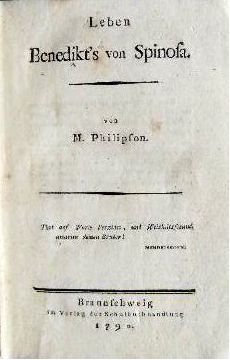
(174) PHILIPSON, Moses (1761-1850) Leben Benedikt's von Spinosa.
Braunschweig, im Verlag der Schulbuchhandlung 1790.
Small 8vo. 120p. On p.117 a picture of Spinoza's seal. Contemp. boards, worn. Nineteenth-century bibliographical notes on the endpapers.
First (only) edition. The first Haskalah biography of Spinoza, written on the occasion of the pantheism controversy. Philipson, born as Moses Alexander David and better known as Johann Jacob Martin Philippi, was an enlightened Jewish philosopher and writer and a friend of Moses Mendelssohn. He was a bookkeeper and bank manager in Hannover, employed in the Prussian finance office in Berlin and became Royal Prussian councillor. He wrote a a great number of books on a great variety of subjects, including a work Ueber die Verbesserung des Judeneids. He converted to Christianity in 1801.
*Van der Linde 114. Wolf 329. Bamberger 595. SB 1582.
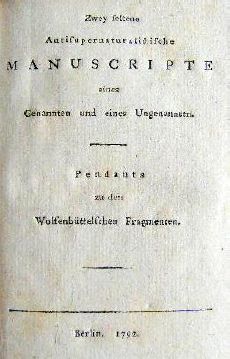
(175) [MÜLLER, Johannes Joachim (1661- 1733) & Theodor Ludwig LAU (1670- 1740)] Zwey seltene antisupernaturalistische Manuscripte eines Genannten und eines Ungenannten. Pendants zu den Wolfenbüttelschen Fragmenten.
Berlin [Giessen] 1792.
Small 8vo (9 x 13 cm). [II],94p. Thick grey boards, back with red calf label.
A very rare volume that combines two heretic texts. The first is the second edition of a manuscript De imposturis religionum, first printed in 1753 with a false date 1598. The manuscript was sold in 1716 to Eugene of Savoy at the auction of the library of the German theologian Johann Friedrich Mayer. It was printed by a Viennese bookseller dated 1598, suggesting that it was the long lost notorious book known as De tribus impostoribus, but in fact a text written by the Hamburg jurist, orientalist and freethinker Johannes Joachim Müller. It is here printed with the title De tribus mundi impostoribus breve compendium. De Moyse, Christo et Mahumete (p.1-34). It should not be confused with the French Traité des trois imposteurs, also known as De tribus impostoribus.
This is followed by Theodor Ludwig Lau's Spinozistic Meditationes philosophicae de Deo, mundo, homine. Anno MDCCXVII (p.35-94), first published in 1717. The volume was published by Carl Christian Erhard Schmid. The edition was confiscated and only a few copies survived.
*Bamberger 602. SB 1546. Presser p.122.
(175) [MÜLLER, Johannes Joachim (1661- 1733) & Theodor Ludwig LAU (1670- 1740)] Zwey seltene antisupernaturalistische Manuscripte eines Genannten und eines Ungenannten. Pendants zu den Wolfenbüttelschen Fragmenten.
Berlin [Giessen] 1792.
Small 8vo (9 x 13 cm). [II],94p. Thick grey boards, back with red calf label.
A very rare volume that combines two heretic texts. The first is the second edition of a manuscript De imposturis religionum, first printed in 1753 with a false date 1598. The manuscript was sold in 1716 to Eugene of Savoy at the auction of the library of the German theologian Johann Friedrich Mayer. It was printed by a Viennese bookseller dated 1598, suggesting that it was the long lost notorious book known as De tribus impostoribus, but in fact a text written by the Hamburg jurist, orientalist and freethinker Johannes Joachim Müller. It is here printed with the title De tribus mundi impostoribus breve compendium. De Moyse, Christo et Mahumete (p.1-34). It should not be confused with the French Traité des trois imposteurs, also known as De tribus impostoribus.
This is followed by Theodor Ludwig Lau's Spinozistic Meditationes philosophicae de Deo, mundo, homine. Anno MDCCXVII (p.35-94), first published in 1717. The volume was published by Carl Christian Erhard Schmid. The edition was confiscated and only a few copies survived.
*Bamberger 602. SB 1546. Presser p.122.
(176) CREUZER, Christoph Andreas Leonhard (1768-1844) Skeptische Betrachtungen über die Freyheit des Willens mit Hinsicht auf die neuesten Theorien über dieselbe.
Giessen, Georg Friedrich Heyer 1793.
XVI,[IV],252,[2]p. Contemp. boards, red edges. Library entries.
First (only) edition. A contribution to the pantheism controvery, with several quotations from Spinoza's Ethica. The author studied theology and philosophy in Marburg and Jena and in 1803 was appointed professor of philosophy in Marburg. This appears to be his only published book. It is preceded by a preface by Carl Christian Erhard Schmid, who had published the previous year the volume Zwey seltene antisupernaturalistische Manuscripte, including De tribus impostoribus and Theodor Ludwig Lau's Meditationes philosophicae de Deo.
*SB 1110.
(177) FARNOCCHIA, Andrea Aloysio (1747-1803) Institutiones theologiae naturalis et ethicae.
Lucae [Lucca], typis Francisci Bonsignori 1794.
12mo. [VIII],238,[1 errata]p. Old boards, recased.
First edition. The fourth chapter of the first book (p.56-62) is entitled De falsitate Spinozismi. The author was professor of philosophy in Lucca. A new edition appeared 1802.
(178) Traité des trois imposteurs. Traite des trois imposteurs, des religions dominantes et du culte, d'apres l'analyse conforme à l'histoire: contenant nombre d'observations morales, analogues à celles mises à l'ordre du jour pour l'affermissement de la République, sa gloire, et l'édification des peuples de tous les pays. A Philadelphie, sous les auspices du général Washington. Et se trouve à Paris, chez le citoyen Mercier ...
London, at M.Miller ... 1796.
[IV],80p. With engraved portraits of Moses and pope Pius VI by F.Poucharaux and an engraved portrait of Mohammed (!) by Devisme and C.Holte. Old pink interim wrappers, back gone. Evenly yellowed.
A late, revolutionary edition. This rare edition was published by the revolutionary journalist Claude François Xavier Mercier de Compiègne (1763-1800). He added some revolutionary poetry, including Hommage à l'être suprême.
*Bamberger 615. Van der Linde 99-103 (other editions). Wolf 306-313 (other editions).
(179) SCHOTT, Andreas Heinrich (1758-1831) Dissertatio historico-philosophica de Spinozismo. Quam praeside Andrea Henrico Schott ... pro obtinendis magisterii philosophici honoribus ... publice defendent Fridericus Gustavus Schoder, Lauffensis, Ernestus Fridericus Hochstetter, Tubingensis, Gottlob Eberhardus Hafner, Eichelbergensis, [and 5 others].
Tubingae [Tübingen], litteris Reis- et Schmidianis [1804].
4to. 48p.
A collective university disputation on Spinoza and the pantheism controversy, 'pro obtinendis magisterii philosophici honoribus'.
*Wolf 1143. Bamberger 635. SB 1592.
(180) SCHOTT, Andreas Heinrich (1758-1831) Dissertatio historico-philosophica de variis pantheismi formis. Quam praeside Andrea Henrico Schott ... pro obtinendis magisterii philosophici honoribus ... publice defendent Christianus Ludovicus Liesching, Althengstadiensis, Maxim. Theoph. Guil. Bilhuber, Vaihingensis ad Entium, Christian. Ferdinand. Frider. Zeller, Nellingensis, [and 4 others].
Tubingae [Tübingen], literis Schrammianis [1805].
4to. 40p.
A collective university disputation on the various forms of pantheism, including Spinozism, 'pro obtinendis magisterii philosophici honoribus'.
*SB 1595.
(181) SCHELLING, Friedrich Wilhelm Joseph (1775-1854) Denkmal der Schrift von den göttlichen Dingen [etc.] des Herrn Friedrich Heinrich Jacobi und der ihm in derselben gemachten Beschuldigung eines absichtlich täuschenden, Lüge redenden Atheismus.
Tübingen, J.F.Cotta 1812.
VI,[2],215,[1]p. Contemp. half calf, marbled sides. Foxing.
First (only) edition. A refutation of Jacobi's Von den göttlichen Dingen und ihrer Offenbarung (1811) in which Jacobi denounced Schelling as an atheist and Spinozist. On the title-page a quotation from Spinoza's Tractatus theologico-politicus: 'Eh, pro dolor! res eo jam pervenit, ut, qui aperte fatentur, se Dei ideam non habere, et Deum nullo mode cognoscere, non erubescant, Philosophos Atheismi accusare' ('Yes, it has come to this! Men who openly confess that they can form no idea of God, and only know Him through created things, of which they know not the causes, can unblushingly, accuse philosophers of atheism!')
*Van der Linde 347 note. Bamberger 643. SB 24.
(182) SIGWART, Heinrich Christoph Wilhelm (1789-1844) Die Leibniz'sche Lehre von der prästabilirten Harmonie in ihrem Zusammenhange mit früheren Philosophemen betrachtet.
Tübingen, Christian Friedrich Osiander 1822.
Small 8vo. VI,170p. Uncut in old wrappers. Mild foxing.
First (only) edition. Investigations on the influence of Descartes, Spinoza, and others on Leibniz' theory of pre-established harmony. Sigwart was professor of philosophy at Tübingen and author of a number of works on the history of philosophy and particularly on Spinoza, 'excellent work for the history of Spinoza's philosophical ideas' (Frederick Pollock). He should not be confused with his son, the philosopher and logician Christoph von Sigwart (1830-1904), publisher of Spinoza's Tractat von Gott, dem Menschen und dessen Glückseligkeit in 1869.
*Van der Linde 318. SB 1947.
(183) [ANGELIS, Pedro de (1784-1859)] Spinosa (Benoit de). In: Biographie universelle, ancienne et moderne ... Ouvrage entièrement neuf, rédigé par une Société de gens de lettres et de savants. Tome quarante-troisième, p.319-329.
Paris, L.G.Michaud 1825.
Contemp. half calf.
*Van der Linde 148,XII (with a portrait not present in this copy).
(184) HEMSTERHUIS, François (1721-1790) Oeuvres philosophiques. Nouvelle édition, revue, augmentée, et accompagnée d'une notice sur Hemsterhuys, et d'un coup-d'oeil sur sa philosophie, par Sylvain Van de Weyer.
Louvain, Fr. Michel 1825-26.
2 volumes. 12mo. XXIV,381,[3]; [VI],LXXXII,318,[2]p. With 3 engraved plates to volume 1 (erroneously bound after p.192) and 3 (2 folding) plates to volume 2. Uncut in orig. printed wrappers, back of volume 2 broken and upper wrapper slightly stained and damaged.
First edition thus. Hemsterhuis was befriended with Jacobi and these volumes includes a letter relating to the Jacobi-Mendelssohn debate: Lettre de M. F.H.Jacobi, a M. Hemsterhuis (volume 2, p.115-139) which according to the preface of the editor of the present edition, 'gives an idea of Spinoza's system and a kind of analysis of that of Hemsterhuis ' (volume 1, p.XI).
*Bamberger 653.
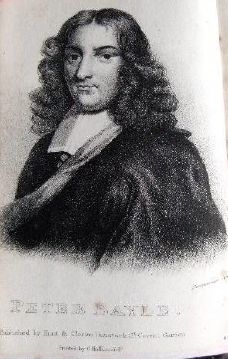
(185) BAYLE, Pierre (1647-1706) An historical and critical dictionary, selected and abridged from the great work. With a life of Bayle.
London, printed for Hunt and Clarke 1826.
4 volumes 2. 12mo. VI,404,IV,438; IV,392IV,356,[34]p. With portrait of Bayle. Contemp. half calf, gilt backs, marbled sides, endpapers and edges.
First edition thus. A selection of articles from Bayle's famous dictionary by an anonymous translator, with a biographical sketch of Bayle. The famous article on Spinoza occupies p.271-341 of the third volume.
*Boucher 228c.
(185) BAYLE, Pierre (1647-1706) An historical and critical dictionary, selected and abridged from the great work. With a life of Bayle.
London, printed for Hunt and Clarke 1826.
4 volumes 2. 12mo. VI,404,IV,438; IV,392IV,356,[34]p. With portrait of Bayle. Contemp. half calf, gilt backs, marbled sides, endpapers and edges.
First edition thus. A selection of articles from Bayle's famous dictionary by an anonymous translator, with a biographical sketch of Bayle. The famous article on Spinoza occupies p.271-341 of the third volume.
*Boucher 228c.
(186) JÄSCHE, Gottlob Benjamin (1762-1842) Der Pantheismus nach seinen verschiedenen Hauptformen, seinem Ursprung und Fortgange, seinem speculativen und praktischen Werth und Gehalt. Ein Beitrag zur Geschichte und Kritik dieser Lehre in alter und neuer Philosophie.
Berlin, G.Reimer 1826-28.
2 volumes. VIII,240; LVIII,325,[3]p. Contemp. blue boards, rubbed.
First (only) edition. An extensive history of pantheism of which an important part is dedicated to Spinoza's pantheism (Der Pantheismus der neuern realistisch- dogmatischen Metaphysik, als Spinozismus, volume 2, p.221-325). Jäsche was a student of Kant and professor of philosophy at the University of Tartu, Estonia, best remembered for his edition of Immanuel Kant's Logik. A third volume appeared in 1832.
*Van der Linde 415. Bamberger 656. SB 1946.
(187) MATTHIAS, Conradus. Benedicti Spinosae doctrina ex ethica eius recensita. Dissertatio inauguralis ...
Marburg, Krieger 1829.
48p. Cloth-backed boards.
*Van der Linde 418. SB 1080.
(188) FEUERBACH, Ludwig Andreas (1804-1872) Geschichte der neuern Philosophie von Bacon von Verulam bis Benedict Spinoza.
Ansbach, C.Brügel 1833.
IV,434,LXIV,[2]p. Contemp. boards, gilt back with red label, red edges, rubbed, corners worn. Mild foxing. Modern bookplate to front paste-down.
First edition. Spinoza is treated in the eigth chapter (p.341-434).
*Van der Linde 124. SB 5113.
(189) GENTHE, Friedrich Wilhelm (1805-1866) De impostura religionum breve compendium seu liber de tribus impostoribus. Nach zwei Mss. und mit historisch-litterarischer Einleitung.
Leipzig, Friedrich Fleischer 1833.
IV,62p. Contemp. half cloth, gilt back, marbled boards. Foxing.
First (only) edition. The historical introduction is followed by the Reponse à la dissertation de Mr. de la Monnoye sur le Traité: De tribus impostoribus. A la Haye chez Henry Scheurleer, 1716 and by De imposturis religionum breve compendium.
*Van der Linde 103 note. SB 1709.
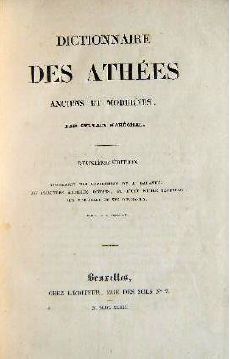
(190) MARECHAL, Pierre Sylvain (1750-1803) Dictionnaire des athées anciens et modernes. Deuxième édition, augmentée des supplémens de J. Lalande; de plusieurs articles inédits, et d'une notice nouvelle sur Maréchal et ses ouvrages, par J.B.L. Germond.
Bruxelles, chez l'éditeur 1833.
23,XXXIX,328,85p. Contemp. half calf, marbled sides and endpapers.
Second enlarged (best) edition, first published in Paris in 1800 and then forbidden by Napoleon. An alphabetically arranged dictionary of atheism, including several hundred entries with citations from other authors. Spinoza is treated on p.279- 281: 'Athée de système, et d'une méthode toute nouvelle ... le premier qui ait réduit en système l'athéisme ...'
Among other authors treated are Bayle, Knutzen, La Mettrie, Lau, Leenhof, Toland, etc.
*Bamberger 627 (first edition). Dommanget p.463.
(191) THOMAS, Carolus [Karl] (?-1873) Spinozae systema philosophicum adumbratum. Dissertatio inauguralis ...
Regimontii Borussorum [Königsberg], Conradus Paschke [1835].
79,[2]p. Contemp. boards, a.e.g., worn.
First (only) edition. The first of several books on Spinoza, the thesis of the author, of whom little seems known other than that he was a follower of Herbart.
*Van der Linde 420. SB 1500.
(192) HERBART, Johann Friedrich (1776-1841) Zur Lehre von der Freyheit des menschlichen Willens. Briefe an Herrn Professor Griepenkerl.
Göttingen, Dieterich 1836.
Small 8vo. XXIV,255p. Contemp. half cloth. Mild foxing.
First (only) edition. Though Herbart, philosopher and pioneer in educational psychology, had heavily criticized Spinoza in his earlier works, he was nevertheless accused of Spinozistic determinism by Johann P. Romang in his Ueber Willensfreiheit und Determinismus (1835). This is his defence, in letters to Friedrich Konrad Griepenker, a German musician and educational thinker who had studied under Herbart.
*SB 1547.
(193) [RIST, Johann Georg (1775-1847)] Schönborn und seine Zeitgenossen. Drei Briefe an ihn nebst einigen Zugaben aus seinem Nachlass und einer biographischen Skizze als Einleitung, herausgegeben von J.R.
Hamburg, Friedrich Perthes 1836.
[VI],120,[2]p. With 5 facsimiles. Uncut in orig. printed wrappers. Mild foxing.
First (only) edition. The last part of this volume is taken by a Abriss einer Geschichte des Spinozismus nach seinem Verhältniss zu den Hauptsystemen der neueren Philosophie (p.87-120). Rist's attribution of this piece to Schönborn is rejected by SB, though without evidence.
Gottlob Friedrich Ernst Schönborn (1737-1817) was a diplomat and poet, freemason, and friend of Matthias Claudius, Goethe and Klopstock. This volume includes a short biography and some letters by and to him. It was edited by Rist, a Danish diplomat from Holstein and friend of a.o. Goethe and Herder.
*SB 1811.
(194) AUERBACH, Berthold (1812-1882) Spinoza. Ein historischer Roman.
Stuttgart, J.Scheible 1837.
2 parts in 1 volume. 12mo. X,278,315p. Contemp. half calf, gilt back. Foxing.
First edition. The most popular book on Spinoza published during the nineteenth century, a romantic life between a biography and a novel. It was many times reprinted, since the revised second edition of 1854 under the title Spinoza. Ein Denkerleben, and translated into various languages, including Dutch, English, Russian, Spanish, Hebrew and Yiddish. The author was a liberal Jewish-German poet and novelist. He also translated Spinoza's works into German, published in 5 volumes in 1841.
*Van der Linde 126. SB 1961.
(195) VOLKMUTH, Peter (1805-) Der dreieinige Pantheismus von Thales bis Hegel.
Köln, J.Lumscher 1837.
XVI,306p. Orig. printed wrappers, stitching defective. Stamp on verso title.
First (only) edition. An attempt to give a complete and systematic history of pantheism. On the analogy of the Trinity the author attempts to create a modern pantheism out of Stoicism and the philosophy of Schelling and Spinoza: the 'Stoischer Gott-Vater, Schellingscher Gott-Sohn, Spinozistischer Gott h. Geist'.
*Van der Linde 285. SB 3815.
(196) SIGWART, Heinrich Christoph Wilhelm (1789-1844) Historische und philosophische Beiträge zur Erläuterung des Spinozismus.
Tübingen, Ernst Traugott Eifert 1838.
4to. 76p. Blank covers. Title browned.
First (only) edition.
*Van der Linde 309. Wolf 1152. SB 1641.
(197) TELS, Hartog Hyman (1810-1885) Dissertatio historico-literaria inauguralis, De jure publico usque ad Ulricum Huberum ... [Followed by:] Dissertatio philosophico-juridica inauguralis, De meritis Ulrici Huberi in jus publicum universale ...
Lugduni Batavorum [Leiden], H.W.Hazenberg 1838.
2 volumes in 1. [X],222, [VIII],100p. Uncut in orig. printed boards.
First (only) editions of two doctoral dissertations for the University of Leiden on the famous Dutch lawyer Ulricus Huber (1636-1694). The first, historical dissertation treats the development of public law before Huber. The third part of that treats 10 authors, including Machiavelli, Thomas More, Jean Bodin, Thomas Hobbes, and Spinoza (p.211-216).
(198) SCHLEIERMACHER, Friedrich (1768-1834) Geschichte der Philosophie. Aus Schleiermachers handschriftlichem Nachlasse herausgegeben von H. Ritter.
Berlin, G. Reimer 1839.
311p. Contemp. boards, gilt back with label, red edges, worn. (Friedrich Schleiermacher's sämmtliche Werke. Dritte Abtheilung. Zur Philosophie. Vierten Bandes erster Theil.)
First edition. Schleiermacher's fragmentary history of philosophy, posthumously published from papers and notes for lectures. It contains a separate treatise on Spinoza (Kurze Darstellung des spinozistischen Systems, p.283-311). Accordingto the publisher's introduction this paper most likely dates from before 1802.
Schleiermacher, 'father of modern liberal theology', had shown considerable sympathy for Spinozist monism in an essay on Spinoza und Jacobi, written about 1793-94 but published not before 1923 in the Chronicon Spinozanum. In later years however he distanced himself from Spinoza and explicitly denied having been a follower.
*Van der Linde 348. SB 1182 & 1454.
(199) SIGWART, Heinrich Christoph Wilhelm (1789-1844) Der Spinozismus historisch und philosophisch erläutert mit Beziehung auf ältere und neuere Ansichten.
Tübingen, C.F. Osiander 1839.
IV,265,[3]p. Contemp. blue boards.
First (only) edition.
*Van der Linde 310. Wolf 1153. SB 2797.
(200) BOUILLIER, Francisque (1813-1899) Histoire et critique de la révolution cartésienne.
Lyon, L. Boitel 1842.
VIII,448p. Contemp. half morocco, back richly gilt, marbled sides and endpapers.
First edition. Bouillier was professor of philosophy at the University of Lyons, member of the Académie des sciences morales et politiques. He is best known for his historical studies on Cartesianism. Spinoza is treated on p.201-235.
*Wolf 48 (second edition of 1854). SB 13116.
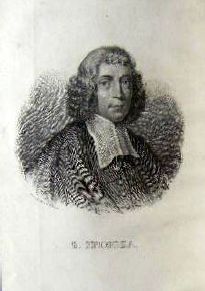
(201) SAINTES, Amand (1801-1878) Histoire de la vie et des ouvrages de B. de Spinosa, fondateur de l'exégèse et de la philosophie modernes.
Paris, Jules Renouard 1842.
[II],XX,390p. With an engraved portrait by Wenzel Pobuda. Contemp. boards, red edges, worn. Bookplate and stamp to front paste-down, few further imperfections.
First (only) edition. A biographical sketch of Spinoza, followed by analysises of the Tractatus and the Ethica and a chapters on the historical development of Spinozism in France, Holland, England and particularly in Germany: Leibniz, Wolff, Mendelssohn, Jacobi, Lessing, Herder, Kant, Fichte, Schelling, Hegel, etc.
*Van der Linde 128. SB 11338.
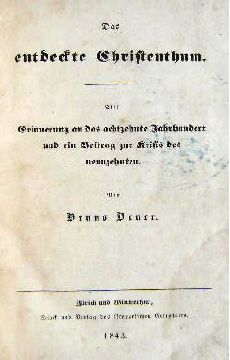
(202) BAUER, Bruno (1809-1882) Das entdeckte Christenthum. Eine Erinnerung an das achtzehnte Jahrhundert und ein Beitrag zur Krisis des neunzehnten.
Zürich und Winterthur, Druck und Verlag des literarischen Comptoirs 1843.
VIII,119p. Contemp. cloth, gilt back. Some ink offsetting to title, lower outer corner of first leaves and lower margin of last leaves stained, mild browning throughout.
First (only) edition. It has been suggested that this book served as a model for Nietzsche's Antichrist, but also as a nineteenth century interpretation of the works of the Spinozist Johann Christian Edelmann, to whom (as well as to Spinoza) the book indeed refers several times. In the preface the author explains the atheistic enlightenment of the eighteenth century as a result of the fusion of the humanized deistic enlightenment of the English philosophers, encouraged by Voltaire, and Spinozism, that freed deism of its religious constraint.
Extremely rare, since the book was banned and destroyed upon publication. Only 3 copies in public libraries seem to have survived. It was ignored until it was rediscovered by Ernst Barnikol in 1927.
Bruno Bauer was a radical rationalist philosopher and Bible critic and a major figure among the Young Hegelian movement. He was a close friend of Karl Marx, but their friendship ended in 1841 because Bauer did not agree with Marx's political opinions. This is his last book of critical theology.
*SB 1797 ('noch vor dem Druck in Preussen konfisziert' [?]).
(203) BERTEREAU, Adolphe. Leibnitz considéré comme historien de la philosophie. Thèse pour le doctorat.
Paris, Joubert 1843.
140p. Contemp. marbled boards. First and last leaves paperspotted.
First (only) edition. At the end an index of the passages in Leibniz' works dedicated to the history of philosophy (p.123-140). For Spinoza 23 references are given.
(204) KOENEN, Hendrik Jakob (1809-1874) Geschiedenis der Joden in Nederland. Uitgegeven door het Provinciaal Utrechtsche Genootschap van Kunsten en Wetenschappen.
Utrecht, C. van der Post 1843.
XVII,[1],519,[1]p. Plain cloth-backed boards.
First (only) edition. A history of the Jews in the Netherlands. Spinoza is treated on page 349-356 and in appendix XX (p.482-486): Spinoza's feelings on revealed religion in general and Christianity in particular, with Spinoza's letter to Oldenburg of 21 November 1675.
(205) ORELLI, Conrad von (1788-1854) Spinoza's Leben and Lehre. Nebst einem Abrisse der Schelling'schen und Hegel'schen Philosophie.
Aarau, H.R. Sauerländer 1843.
XII,384p. Contemp. cloth-backed marbled boards, gilt back, green edges. With an added folding engraved map of Palestine. Fine copy.
First edition. One of the most comprehensive studies on Spinoza from the first half of the nineteenth century, written with clear sympathy for Spinoza. More than half of the volume is taken by a treatise on the Spinoza criticisms of Schelling and Hegel. The author was a grammar-school professor of French and philosophy in Zürich. A second enlarged edition appeared 1850.
*Van der Linde 129. Wolf 1096. SB 1507.
(206) DAMIRON, Jean Philibert (1794-1862) Essai sur l'histoire de la philosophie en France, au XVIIe siècle.
Paris, L. Hachette 1846.
2 volumes. [IV],LXXIV,[2],520,[1]; [IV],840p. Contemp. half calf. Prize bindings of the College de Chatellerault.
First (only) edition. The first volume is dedicated to Descartes, Hobbes and Gassendi. The second volume is dedicated to followers of Descartes (Rohault, De La Forge, Regis, Antoine Le Grand, Clauberg, Geulincx), Spinoza ('Livre V', p.177-351), Malebranche, and some others. Damiron was professor of philosophy in Paris and member of the Académie des sciences morales et politiques.
*Wolf 72. SB 6586.
(207) HELFFERICH, Adolph (1813-1894) Spinoza und Leibniz oder das Wesen des Idealismus und des Realismus.
Hamburg und Gotha, Friedrich und Andreas Perthes 1846.
IV,108p. Recent cloth-backed boards. Underlinings.
First (only) edition.
*Van der Linde 319. Wolf 1035. SB 1370.
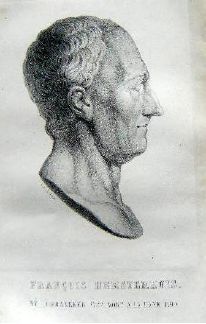
(208) HEMSTERHUIS, François (1721- 1790) Oeuvres philosophiques. Nouvelle édition, augmentée de plusieurs pièces inédites, de notes et d'une étude sur l'auteur et sa philosophie, par L.S.P. Meyboom.
Leeuwarden, W. Eekhoff 1846-50.
3 volumes in 1. Small 8vo. 224; [4],236; VIII,227,[1],8p. With lithograph portrait and 2 folding lithograph plates and a few pasted vignettes. Contemp. plain half cloth, marbled sides. Some stamps.
First edition thus. These volumes include two letters relating to the Jacobi-Mendelssohn debate: Lettre de M. F.H. Jacobi à M. Hemsterhuis (volume 2, p.221-236) and Lettre de F. Hemsterhuis à F.H. Jacobi (volume 3, p.108-109).
*Van der Linde 347 note. Bamberger 653 (De Weyer's edition of Hemsterhuis' works 1825).
(208) HEMSTERHUIS, François (1721- 1790) Oeuvres philosophiques. Nouvelle édition, augmentée de plusieurs pièces inédites, de notes et d'une étude sur l'auteur et sa philosophie, par L.S.P. Meyboom.
Leeuwarden, W. Eekhoff 1846-50.
3 volumes in 1. Small 8vo. 224; [4],236; VIII,227,[1],8p. With lithograph portrait and 2 folding lithograph plates and a few pasted vignettes. Contemp. plain half cloth, marbled sides. Some stamps.
First edition thus. These volumes include two letters relating to the Jacobi-Mendelssohn debate: Lettre de M. F.H. Jacobi à M. Hemsterhuis (volume 2, p.221-236) and Lettre de F. Hemsterhuis à F.H. Jacobi (volume 3, p.108-109).
*Van der Linde 347 note. Bamberger 653 (De Weyer's edition of Hemsterhuis' works 1825).
(209) LEROUX, Pierre (1797-1871) D'Une religion nationale, ou du culte. Nouvelle édition.
Boussac, imprimerie de Pierre Leroux 1846.
12mo. [2 cat.],[IV],XVIII,144p. Orig. printed wrappers. Mild foxing.
First book edition. A reprint of the article Culte, published in the Encyclopédie nouvelle, and also in the Revue sociale of June 1846, printed at the author's own printing press at Boussac. The author, an influential French utopian socialist, here develops a concept for a 'national religion', for an important part inspired by Spinoza and Rousseau. His Conclusion (p.131-142) includes several references to Spinoza.
*Evans 247.
(210) [ANONYMOUS] Spinoza: his life and writings. In: The British Quarterly Review, volume VIII, no 16, p.395-432.
London 1848.
A disbound article.
An unsigned article, based upon Bruder's edition of Spinoza's works of 1843-46.
*Boucher 69.
(211) SCHADEN, Emil August von (1814-1852) Ueber den Gegensatz des theistischen und pantheistischen Standpunktes. Ein Sendschreiben an Herrn Doktor Ludwig Feuerbach.
Erlangen, Theodor Bläsing 1848.
[II],240,[1]p. Orig. blind-tooled cloth, gilt back.
First (only) edition. An attempt to provide a scientific basis for the theistic principle, in answer to Feuerbach's Grundsätze der Philosophie der Zukunft (1843), with several references to Spinoza. The author was professor of philosophy in Erlangen.
*SB 1146.
(212) THOMAS, Karl. Spinoza's Individualismus und Pantheismus.
Königsberg, Adolph Samter 1848.
39p. Orig. printed wrappers.
First (only) edition.
*Van der Linde 426. SB 1215.
(213) BARTHOLMESS, Christian (1815-1856) Huet évêque d'Avranches ou le scepticisme théologique.
Paris, Marc Ducloux 1850.
X,[2],230,[1]p. Orig. printed wrappers.
First edition. A study of the sceptical theology of the learned bishop of Avranches Pierre Daniel Huet (1630-1721), author of three books against Descartes and, with even greater repugnance, Spinoza. The author was a professor of theology at the Protestant Seminary in Paris. A German edition appeared the next year.
(214) ORELLI, Conrad von (1788-1854) Spinoza's Leben und Lehre. Nebst einem Abrisse der Schelling'schen und Hegel'schen Philosophie. Zweite durch einen Nachtrag vermehrte Ausgabe.
Aarau, H.R.Sauerländer 1850.
X,[2],412p. Contemp. cloth, gilt back.
Second enlarged edition. This edition is enlarged with a Nachtrag, worin unter andern auch der Jung-Hegelianismus berücksichtigt ist.
*Van der Linde 130. Wolf 1097. SB 1507.
(215) RITTER, Heinrich (1791-1869) Geschichte der neuern Philosophie. Dritter Theil.
Hamburg, Friedrich Perthes 1852.
XV,588,[1]p. Contemp. half calf, gilt back, marbled boards, little worn. Stamp on half-title and verso. (Geschichte der Philosophie, elfter Theil. Geschichte der christlichen Philosophie, siebenter Theil.)
First edition. The third chapter of this volume of a comprehensive history of philosophy is dedicated to Spinoza (p.169-291). The author was professor of philosophy in Berlin, Kiel and Göttingen.
*Van der Linde 148,XXVIII. SB 1645.
(216) SCHWARZ, Carl (1812-1885) Gotthold Ephraim Lessing als Theologe. Ein Beitrag zur Geschichte der Theologie im 18ten Jahrhundert.
Halle, C.E.M.Pfeffer 1854.
X,232p. Contemp. cloth, gilt back.
First (only) edition. The third chapter (p.68-98) is entitled Der philosophische Hintergrund der Lessing'schen Theologie. Der Spinozismus Lessing's.
*Van der Linde 347 note. SB 1383.
(217) FOUCHER DE CAREIL, Louis Alexandre (1826-1891) A refutation recently discovered of Spinoza by Leibnitz. With prefatory remarks and introduction. Translated at his request by the Rev. Octavius Freire Owen.
Edinburgh, Thomas Constable 1855.
XIX,155p. Orig. cloth, spine ends trifle worn.
First (only) English edition, first published in French the previous year. It reproduces a hitherto unpublished manuscript of Leibniz discovered in the Royal Library at Hanover (p.117-155). The manuscript has been dated between 1706 and 1710 and clearly shows Leibniz's critical opinion towards Spinoza's works. It is preceded by a long introduction by Foucher, a French writer, diplomat and politician, and publisher of a new edition of the works of Leibniz.
*Van der Linde 322 (French edition). Wolf 673. SB 1410 (French edition). Boucher 798.
(218) [FROUDE, James Anthony (1818-1894)] Spinoza.
[London] 1855.
37p. Disbound. (The Westminster and Foreign Quarterly Review, Vol. LXIV, no. CXXV, New series Vol. VIII, no 1, July 1, 1855)
An article extracted from the quoted journal, reviewing Eduard Böhmer's edition of Spinoza's Tractatus de Deo (1852).
*Van der Linde 49 note. Boucher 838 (dating it 1854 and counting 20 pages only).
(219) DRBAL, Mathias Amos (1829-1885) Ueber den gegenwärtigen Stand der Frage nach Lessing's Spinozismus. Mit Beziehung auf Prof. Dr. R. Zimmermanns Leibnitz und Lessing. (Aus dem Maihefte der Sitzungsberichte der historisch-philosophischen Klasse der k.k. Akademie der Wissenschaften, XVI. Band, S. 326.) Besonders abgedruckt aus den Oesterreichischen Blättern für Literatur und Kunst vom 8. März 1856.
Wien, Ghelen 1856.
Small 8vo. 24p. Contemp. blank wrappers.
*SB 1202.
(220) [BERLIN, Hartog Itzig (1791-1872)] Het pantheïsmus, wijsgeerig stelsel onzer dagen, naar de groote wijsgeeren Jezus van Nazareth en Baruch van Spinosa. Geschetst en voorgedragen door een lid der vereeniging De Dageraad gedurende het eerste jaar harer bijeenkomsten.
Amsterdam, R.C.Meijer 1857.
[IV],VIII,206,134p. Modern cloth. Title page inscribed by the author and/or printer.
First (only) edition. The author was a Dutch Jewish freethinker, pantheist and socialist and admirer of Spinoza.
(221) BRÖCHNER, Hans (1820-1875) Benedict Spinoza. En monographie.
Kjöbenhavn, P.G.Philipsens Forlag 1857.
[IV],188p. Blank wrappers detached.
*Van der Linde 132. SB 238.
(222) [HITCHCOCK, Ethan Allen (1798-1870)] Swedenborg, a hermetic philosopher. Being a sequel to Remarks on alchemy and the alchemists. Showing that Emanuel Swedenborg was a hermetic philosopher and that his writings may be interpreted from the point of view of hermetic philosophy. With a chapter comparing Swedenborg and Spinoza. New York, D. Appleton 1858.
Small 8vo. 352,[6]p. Orig. embossed cloth, top of back slightly damaged.
First edition. The author was an officer in the United States Army and during the American Civil War served as a major general. He was also interested in the history of alchemy and held an important library in that field. He argued that 'alchemists were actually religious philosophers writing in symbolism'.
This volume on the hermetic philosophy of Swedenborg includes a chapter (p.263-331) in which the author compares Swedenborg with Spinoza. He considers Spinoza as 'one of the most extraordinary men of modern times, whose name the whole world at one period seemed anxious to load with obloquy, but whose reputation for purity of life is now universally acknowledged, while his philosophy is beginning to be recognized as worthy the careful study of all those who desire to know the power of human intellect'.
*SB 12377. Boucher 1097.
(223) SAISSET, Emile (1814-1863) Essai de philosophie religieuse.
Paris, Charpentier 1859.
XXVII,488,[1]p. Contemp. half calf, gilt back, marbled sides and endpapers.
First edition. The 'third study' of the 'first part' is dedicated to Spinoza: Le panthéisme de Spinoza (p.67-134). The author was a French philosopher, professor in Caen and at the Collège de France, and member of the Académie des sciences morales et politiques, and publisher of the first collected edition of Spinoza's works in French in 1842.
*Wolf 158. SB 12330.
(224) STAHR, Adolf (1805-1876) G.E. Lessing. Sein Leben und seine Werke.
Berlin, J. Guttentag 1859.
2 volumes in 1. [VI],357; [IV],358p. Contemp. half calf, gilt back, marbled sides and endpapers.
First edition.
*SB 1957.
(225) BÖHMER, Eduard (1827-1906) Spinozana. In: Zeitschrift für Philosophie und philosophische Kritik, im Vereine mit mehreren Gelehrten herausgegeben von J.H. Fichte, H. Ulrici und J.U. Wirth. Neue Folge, 36. Bandes, erstes Heft, p.121-166.
Halle, Pfeffer 1860.
Orig. printed wrappers, damaged.
Bio- and bibliographical details discovered by the author when he did research for the publication of Spinoza's hitherto unknown Tractatus de Deo, printed in 1852 together with the Adnotationes ad tractatum theologico politicum.
*Van der Linde 49 note. SB 1118.
(226) DITTES, Friedrich (1829- 1896) Ueber die sittliche Freiheit, mit besonderer Berücksichtigung der Systeme von Spinoza, Leibnitz, Kant. Gekrönte Preisschrift. Nebst einer Abhandlung über den Eudämonismus.
Leipzig, Julius Klinkhardt 1860.
IV,[2],128p. Contemp. half cloth, gilt back, marbled sides. Foxed. Stamps.
First edition. One chapter (p.46-67) is completely dedicated to Spinoza, a fatalist 'in whose philosophy is no, and can not be, ethical freedom because there is no ethics'. There are numerous references to Spinoza in the rest of the volume.
*Van der Linde 325. Wolf 993 (second edition of 1892). SB 7017.
(227) BAUER, Guilelmus [Wilhelm]. De atomis quas philosophia et de rerum natura disciplinae statuunt. Dissertatio inauguralis philosophica ... in Academia Fridericiana Halensi cum Vitebergensi ...
Halis Saxonum [Halle], Ploetzianis [1861].
[II],50,[1]p. Orig. self-wrappers.
The first thesis (last page) reads: 'Spinozae argumenta de substantiae existentia falsa sunt'.
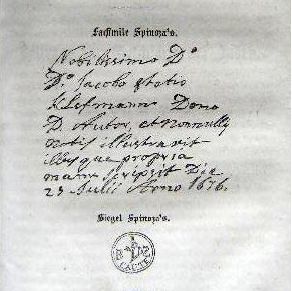
(228) PHILIPPSON, Ludwig (1811- 1889) Baruch Spinoza. In: Jahrbuch für die Geschichte der Juden und des Judenthums, Zweiter Band, p.189-257.
Leipzig, Oskar Leiner 1861.
Small 8vo. XXIV,407p. With facsimile of Spinoza's handwriting and seal. Contemp. boards. worn. (Schriften herausgegeben vom Institute zur Förderung der israelitischen Literatur, Sechstes Jahr 1860-1861)
A revised version of a separate publication of 1832 entitled Benedictus Spinoza. Zweier Gaben erste. Benedictus Spinoza als Mensch, in seinem Leben und Charakter dargestellt, als Rechtfertigung des Verkannten, als Aufforderung zur Feier, des 24sten November 1832, seines zweihundertsten Geburtstages, für gebildete Leser jeden Standes.
*Van der Linde 123 note. SB 1488.
(229) TAILLANDIER, Saint René (1817-1879) La philosophie spiritualiste depuis Descartes. In: Revue des deux mondes, XXXIe année, seconde période, tome XXXV, 1er septembre 1861, p.62-95.
Paris 1861.
Orig. printed wrappers.
(230) ZIRNGIEBL, Eberhard. Der Jacobi-Mendelssohn'sche Streit über Lessing's Spinozismus. Ein Bruckstück aus der von der philosophischen Fakultät der Ludwig-Maximilians-Universität München gekrönten Preisschrift Quellenmässige Darstellung und Charakteristik der Philosophie von Friedr. Heinr. Jacobi.
München, G.Stahl 1861.
31p. Old wrappers. Reading copy only.
A revised version of this is included in the author's Friedrich Heinrich Jacobi's Leben, Dichten und Denken of 1867.
*SB 1719
(231) HEBLER, Carl (1821- 1898) Lessing-Studien.
Bern, Huber 1862.
[IV],195p. Contemp. half calf extra, back richly gilt.
First (only) edition. The fifth chapter Lessing's Philosophie (p.116-143) amply treats Lessing's Spinozism.
*Van der Linde 347 note. SB 1233.
(232) [HITCHCOCK, Ethan Allen (1798-1870)] Emanuel Swedenborg skildrad sasom hermetisk filosof, samt en kort jemförelse mellan Swedenborgs och Spinozas läror. Anmärkningar af en Amerikanare. Svensk öfversättning redigerad af Carl Wingstedt.
Stockholm, Huldberg 1862.
202,[1]p. Contemp. half calf.
First (only) Swedish edition of the author's Swedenborg, a hermetic philosopher, originally published in English in 1858.
(233) LINDE, Antonius van der (1833-1897) Spinoza. Seine Lehre und deren erste Nachwirkungen in Holland. Eine philosophisch-historische Monographie.
Göttingen, Van den Hoeck und Ruprecht 1862.
XXXI,[1],214p. With folding table. Contemp. full grained calf, sumptuously gilt tooled, a.e.g., orig. printed wrappers preserved.
Original edition of the author's thesis, still of great value for every research on Spinoza and his circle. The fundaments of the author's well-known Spinoza bibliography of 1871 are found on p.171-214.
*Van der Linde 133. Wolf 1069. Spinozahuis /266. SB 1927.
(234) LINDE, Antonius van der (1833-1897) Spinoza. Seine Lehre und deren erste Nachwirkungen in Holland. Eine philosophisch-historische Monographie.
Göttingen, Van den Hoeck und Ruprecht 1862.
XXXI,[1],214p. With folding table. Contemp. half cloth.
Trade edition of the author's thesis.
*Van der Linde 133. Wolf 1069. Spinozahuis /266. SB 1927.
(235) LOEWE, Johann Heinrich (1808-1892) Die Philosophie Fichte's nach dem Gesammtergebnisse ihrer Entwickelung und in ihrem Verhältnisse zu Kant und Spinoza. Mit einem Anhange: Ueber den Gottesbegriff Spinoza's und dessen Schicksale.
Stuttgart, Wilhelm Nitzschke 1862.
[IV],321,[2]p. Contemp. marbled boards. Stamps.
First (only) edition. The appendix on Spinoza's conception of God occupies p.271-321. The author was professor of philosophy at the University of Prague and member of the Royal Bohemian Academy of Sciences.
*Van der Linde 351. SB 3001.
(236) SAISSET, Emile (1814-1863) La philosophie des juifs. Maimonide et Spinoza. In: Revue des deux mondes, XXXII année, seconde période, tome 37, 15 Janvier 1862, p.296-334.
Paris 1862.
Orig. printed wrappers.
*Van der Linde 279 note. SB 10220.
(237) SAISSET, Emile (1814- 1863) Précurseurs et disciples de Descartes. Roger Bacon. La réforme de Ramus. La vie et l'oeuvre de Descartes. Spinoza et la philosophie des Juifs. La personne de Malebranche. Leibnitz et la dernière philosophie allemande.
Paris, Didier 1862.
[IV],XV,466,[1]p. Contemp. half morocco, gilt back, orig. wrappers preserved. Mild foxing, corner of half title torn away.
First edition. The fourth chapter (p.185-352): Les origines du panthéisme de Spinoza.
*Wolf 161. SB 1268.
(238) [VLOTEN, Johannes van (1818-1883)] Baruch d'Espinoza; zijn leven en schriften, in verband met zijnen en onzen tijd.
Amsterdam, Frederik Muller 1862.
Small 8vo. [IV],X,[2],483,[1]p. Recent cloth-backed boards.
First edition. The author was a Dutch man of letters, freethinker and one of the founders of modern humanism in the Netherlands. He wrote a great number of articles on Spinoza and was, together with J.P.N. Land, responsible for the publication of Spinoza's works in 1882-83.
*Van der Linde 134. Wolf 1185. SB 11341.
(239) FRANCHI, Ausonio [pseud. of Cristoforo Bonavino] (1821 -1895) Letture su la storia della filosofia moderna. Bacone, Descartes, Spinoza, Malebranche.
Milano, Fratelli Ferrario 1863.
2 volumes. Small 8vo. VIII,415; 456p. Uncut in orig. printed wrappers.
First (only) edition. The 15th-18th lectures (volume 2, p.114-266) are dedicated to Spinoza: Spinoza. Il metodo, Critica del metodo di Spinoza. Analisi dell'Etica, Spinoza. Seguito dell'Etica. Trattato teologica politico, and Spinoza. La politica. Conclusione.
Bonavino had taken holy orders but abandoned the Church under the influence of French positivist philosophy and the political events of the 1840's. He changed his name into Ausonio Franchi (i.e. free Italian) and devoted himself to the cause of political and philosophical freedom. He was appointed professor of philosophy in Pavia and Milan, and at the end of his life returned to the Catholic Church.
(240) [FRASER, Alexander Campbell (1819-1914)] M. Saisset and Spinoza. In: The North British Review, volume 38, February-May 1863, p.454-489.
Edinburgh 1863.
A disbound article.
*Boucher 815.
(241) HORN, Ignaz E[inhorn] (1825-1875) Spinoza's Staatslehre. Zum ersten Male dargestellt. Zweite Ausgabe
Dresden, Louis Ehlermann 1863.
XII,201p. Contemp. boards.
*Van der Linde 432 (first edition of 1851). Wolf 1041. SB 8046.
(242) JACOBY, Johann (1805- 1877) G. E. Lessing der Philosoph.
Berlin, J. Guttentag 1863.
Small 8vo. 65p. Old boards.
First edition, also included in the author's Gesammelte Schriften und Reden (1872). Two chapters deal with Spinoza: Lessing und Spinoza (1760-1770) (p.13-29) and Spinoza und Leibnitz (p.30-46).
*SB 1780.
(243) ASSARSSON, Pehr (1838-1894) Om Spinozas statslära och dess förhallande till Hobbes' och Rousseaus. Akademisk afhandling, som med Vidtberömda Filosofiska Fakultetens i Lund ...
Lund, tryckt uti Berlingska Boktryckeriet 1864.
[II],48p. Blank wrappers.
First (only) edition.
(244) FORSBERG, Nicolaus August. Jemförande betraktelse af Spinozas och Malebranches metafysiska principer. Akademisk afhandling, som med Vidtberömda Filosofiska Fakultetens i Upsala ...
Upsala, Edquist & Berglund 1864.
[II],29p. Contemp. blank wrappers.
First (only) edition.
(245) FISCHER, Kuno (1824-1907) Geschichte der neuern Philosophie. Erster Band: Descartes une seine Schule. Erster Theil: Allgemeine Einleitung. René Descartes. Anhang: René Descartes' Hauptschriften zur Grundlegung seiner Philosophie. Zweiter Theil: Descartes' Schule. Geulinx, Malebranche, Baruch Spinoza. Zweite völlig umgearbeitete Auflage.
Mannheim & Heidelberg, Friedrich Bassermann 1865-68.
3 volumes in 1. XXVII,546, XIV,203, XXIV,584p. Contemp. half calf, gilt back.
Second revised and enlarged edition, first published in 1854. The major part of the third volume (p.88-584) is taken by the philosophy of Spinoza.
The author was professor of philosophy in Jena and Heidelberg. 'He was a brilliant lecturer and possessed a remarkable gift for clear exposition. His fame rests primarily on his work as a historian and commentator of philosophy.'
*Van der Linde 131. Wolf 100. SB 1979.
(246) FISCHER, Kuno (1824-1907) Baruch Spinoza's Leben und Charakter. Ein Vortrag.
Mannheim, Friedrich Bassermann 1865.
IV,52p. Without wrappers, signs of use.
First edition.
*Van der Linde 139. Wolf 1004 (edition of 1909). SB 1982.
(247) JACOBY, Johann (1805-1877) Der freie Mensch. Rück- und Vorschau eines Staatsgefangenen (Dr. Johann Jacoby.)
Berlin, Julius Springer 1866.
Small 8vo. [II],46,[1]p. Orig. printed wrappers.
First edition, also included in the author's Gesammelte Schriften und Reden (1872). The first part (p.1-35) is entitled Der homo liber des Paraklet Spinoza.
The author was Jewish physician and a radical left political activist, an outspoken opponent of Bismarck. In 1864 he delivered, in the presence of the King, a speech calling for tax refusal. For that he was sentenced to six months imprisonment in Königsberg and there wrote the present pamphlet.
*SB 1781.
(248) JOËL, Manuel (1826-1890) Don Chasdai Creskas' religionsphilosophische Lehren in ihrem geschichtlichen Einflusse dargestellt.
Breslau, Schletter'sche Buchhandlung H.Skutsch 1866.
IV,83p. Old plain boards. Inner margins strengthened.
First edition. A monograph on the fourteenth-century Spanish-Jewish philosopher Hasdai Crescas. The author, a rabbi from Breslau, sketches the influence of Crescas' philosophy on Spinoza, both in the text and in numerous footnotes.
*Van der Linde 277. SB 9129.
(249) [LEWES, George Henry (1817-1878)] Spinoza. In: The Fortnightly Review, volume IV, no XXII, April 1, 1866, p.385-406.
London, Chapman and Hall 1866.
A disbound article.
*Van der Linde 140 (Dutch edition from the same year). Boucher 1429.
(250) NOURRISSON, Jean Félix (1825-1899) Spinoza et le naturalisme contemporain.
Paris, Didier 1866.
Small 8vo. [IV],XII,305p. Contemp. half calf. A modest copy.
First (only) edition. A study on the life, teachings and influence of Spinoza, by a French catholic philosopher. Nourisson was professor of philosophy in various places and a member of the Académie des Sciences morales et politiques, 'one of the best representatives of French spiritualistic philosophy in the nineteenth century'.
*Van der Linde 141. Wolf 1095.
(251) TURBIGLIO, Sebastiano (1842-1901) Storia della filosofia. Cartesio, Malebranche, Spinoza.
Torino, Tipografia Italiana 1866.
XXII,88p. Orig. printed wrappers. Author's presentation copy, inscribed.
First (only) edition. The author was an Italian philosopher, professor of philosophy at the University of Rome.
(252) JANET, Paul (1823- 1899) Spinoza et le Spinozisme d'après les travaux récens. In: Revue des deux mondes, XXXVIIe année, seconde période, tome 70, 15 Juillet 1867, p.470-498.
Paris 1867.
*Van der Linde 142.
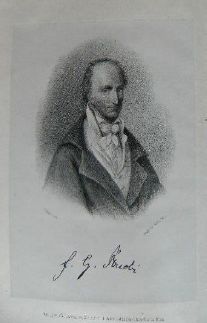
(253) ZIRNGIEBL, Eberhard. Friedrich Heinrich Jacobi's Leben, Dichten und Denken. Ein Beitrag zur Geschichte der deutschen Literatur und Philosophie.
Wien, Wilhelm Braumüller 1867.
XIV,367p. With lithograph portrait. Contemp. half calf, gilt back, marbled sides.
First (only) edition. A study on the life and teachings of Friedrich Heinrich Jacobi, with ample attention for his position towards Spinozistic rationalism, the Jacobi-Mendelssohn controversy on Lessing's alleged Spinozism and the teachings of Kant, Fichte and Schelling.
*Van der Linde 347 note. SB 1718.
(254) AVENARIUS, Richard (1843-1896) Ueber die beiden ersten Phasen des Spinozischen Pantheismus und das Verhältniss der zweiten zur dritten Phase. Nebst einem Anhang: Ueber Reihenfolge und Abfassungszeit der älteren Schriften Spinoza's.
Leipzig, Eduard Avenarius 1868.
VIII,[II],105,[1]p. Recent plain boards.
First (only) edition. The author's doctoral dissertation on the development of Spinoza's pantheism. Avenarius was a German-Swiss philosopher, a radical positivist and the formulator of the theory of empirio-criticism.
*Van der Linde 146. Wolf 954. SB 1272.
(255) BAUMANN, Johann Julius (1837-1916) Die Lehren von Raum, Zeit und Mathematik in der neueren Philosophie nach ihrem ganzen Einfluss dargestellt und beurtheilt. I. Band: Suarez, Descartes, Spinoza, Hobbes, Locke, Newton. II. Band: Leibniz, Leibniz und Clarke, Berkeley, Hume, Kurzer Lehrbegriff von Geometrie, Raum, Zeit und Zahl. Schluss und Regeln aus dem Ganzen.
Berlin, Georg Reimer 1868-69.
2 volumes. XII,515; VIII,685,[1]p. Modern cloth. Name on titles.
First (only) edition. The part on Spinoza occupies p.157-236 in the first volume.
*Van der Linde 441. SB 1942 & 3489.
(256) BOUILLIER, Francisque (1813-1899) Histoire de la philosophie cartésienne. Troisième édition.
Paris, Ch. Delagrave 1868.
2 volumes. XIII,620; [IV],658p. Contemp. half calf.
Third and best edition. Spinoza is treated in volume 1, p.315-428. First published in 1842 with the title Histoire et critique de la révolution cartésienne.
*Wolf 48 (second edition of 1854). SB 13116.
(257) RUBIN, Salomo (1823-1910) Spinoza und Maimonides. Ein psychologisch- philosophisches Antitheton.
Wien, Herzfeld & Bauer 1868.
50p. Orig. printed wrappers. Stamps.
First (only) edition. The author's doctoral dissertation for the University of Göttingen
*Van der Linde 279. SB 1819.
(258) SCHMIDT, Paul Wilhelm. Spinoza und Schleiermacher. Die Geschicke [sic] ihrer Systeme und ihr gegenseitiges Verhältniss. Ein dogmengeschichtlicher Versuch.
Berlin, Georg Reimer 1868.
VIII,198,[1]p. Contemp. boards.
First (only) edition.
*Van der Linde 349. Wolf 1140. SB 1178.
(259) TOORENENBERGEN, Albert van (1825-1886) Dr. Bernard Nieuwentijd, in de lijst zijns tijds.
[No place 1868.]
31p. Blank wrappers. (Offprint from Stemmen voor Waarheid en Vrede)
A short study of Bernard Nieuwentyt (1654-1718), Dutch natural philosopher and well-known adversary of Spinoza.
(260) KIRCHMANN, Julius Hermann von (1802-1884) Die Grundbegriffe des Rechts und der Moral als Einleitung in das Studium rechtsphilosophischer Werke.
Berlin, L.Heimann 1869.
VIII,201p. Contemp. plain cloth. Stamps. (Philosophische Bibliothek, 11. Band)
First edition. The author was a German jurist and philosopher, now best remembered for his translations into German of and 'elucidations' to various works of Spinoza. This study on the foundations of law and morals also includes numerous references to Spinoza.
*SB 9710.
(261) KIRCHMANN, Julius Hermann von (1802-1884) Erläuterungen zu Benedict von Spinoza's Ethik. [Bound with:] Erläuterungen zu Benedict von Spinoza's Bearbeitung der Prinzipien der Philosophie des Rene Descartes. [And with:] Erläuterungen zu Benedict von Spinoza's Abhandlung über die Verbesserung des Verstandes und zu dessen Politischer Abhandlung. [And with:] Erläuterungen zu Benedict von Spinoza's theologisch-politischer Abhandlung. [And with:] Erläuterungen zu Benedict von Spinoza's Briefwechsel.
Berlin, L.Heimann 1869-72.
5 volumes in 1. VIII,186, [IV],112, 136, 114, [IV],87,[5]p. Contemp. half cloth, gilt back, marbled sides. (Philosophische Bibliothek 5., 42., 45., 36. und 47. Band)
A complete set of the well-known 'elucidations' to Spinoza's works.
*Van der Linde 27b. Wolf 1050 and 1051. SB 1078, 1964, 1554, 1965 and 1106.
(262) BRASCH, Moritz (1843-1895) Benedict von Spinoza's System der Philosophie nach der Ethik und den übrigen Traktaten desselben in genetischer Entwickelung dargestellt und mit einer Biographie Spinoza's versehen.
Berlin, Albert Wruck 1870.
[VIII],192p. Contemp. cloth-backed boards.
First (only) edition. The author was a German-Jewish philosopher and man of letters, publisher of the works of Moses Mendelssohn, and chief editor of the well-known Brockhaus encyclopedia.
*Van der Linde 147. Wolf 970. SB 1070.
(263) JOËL, Manuel (1826-1890) Spinoza's theologisch-politischer Traktat auf seine Quellen geprüft.
Breslau, Schletter'sche Buchhandlung (H. Skutsch) 1870.
XI,76p. Modern plain cloth.
First edition.
*Van der Linde 379. SB 3591.
(264) WILLIS, Robert (1799-1878) Benedict de Spinoza; his life, correspondence, and ethics.
London, Trübner 1870.
XLIV,[2],647p. Orig. cloth, back lettered gilt. Fine copy.
First (only) edition. Includes the first English translation of the Ethica (p.414-647) and a translation of Spinoza's correspondence (p.216-413).
*Van der Linde 28. SB 1161. Boucher 20.
(265) ZIMMERMANN, Robert (1824-1898) Studien und Kritiken zur Philosophie und Aesthetik. Erster Band: Zur Philosophie. Zweiter Band: Zur Aesthetik.
Wien, Wilhelm Braumüller 1870.
2 volumes. VII,[5],391; [VIII],399p. Uncut in orig. printed wrappers.
First (only) edition thus. Volume 1, p.36-60: Ueber den logischen Grundfehler der Spinozistischen Ethik, and p.126-192: Leibnitz und Lessing.
*SB 673 (the first quoted essay as published in the Sitzungsberichte der Philosphisch-Historischen Klasse der Kaiserlichen Akademie der Wissenschaften, 1850-51).
(266) VLOTEN, Johannes van (1818-1883) Benedictus de Spinoza, naar leven en werken, in verband met zijnen en onzen tijd geschetst. Tweede herziene en vermeerderde druk.
Schiedam, H.A.M.Roelants 1871.
Small 8vo. [XIV],[2],288p. Cloth-backed boards. Some staining.
Second revised and enlarged edition, first published in 1862 with the title Baruch d'Espinoza; zijn leven en schriften, in verband met zijnen en onzen tijd and without the author's name.
*Van der Linde 134 corrigenda. Wolf 1184. SB 11341.
(267) WALTER, Reinhold. Ueber das Verhältniss der Substanz zu ihren Attributen in der Lehre Spinoza's mit besonderer Berücksichtigung der Auffassung desselben bei Kuno Fischer, Erdmann und Trendelenburg.
Nürnberg, U.E. Sebald 1871.
39p. Orig. printed wrappers. Thesis Erlangen.
First (only) edition.
*SB 1457.
(268) DÖRFFLING, Max. Die Ansichten Spinozas über das Wesen der Affecte und ihre gegenseitigen Verhältnisse.
[No place] 1873.
27p. Orig. printed wrappers. Thesis Rostock.
First (only) edition.
*Wolf 954. SB 1464.
(269) RAGNISCO, Pietro. Tommaso Rossi e Benedetto Spinoza. Saggio storico-critico.
Salerno, Migliaccio 1873.
52p. Orig. printed wrappers. Foxing.
First (only) edition.
(270) GORDON, Abraham. Spinoza's Psychologie der Affekte mit Rücksicht auf Descartes.
Breslau, Druck von H.Sulzbach 1874.
IV,89p. Thesis Leipzig.
*SB 1700.
(271) TURBIGLIO, Sebastiano (1842-1901) Benedetto Spinoza e le trasformazioni del suo pensiero. Libri tre.
Roma, G.B. Paravia 1874.
[VIII],307p. Orig. printed wrappers. With an autograph presentation letter from the author.
First (only) edition.
(272) HEINZE, Max (1835-1909) Leibniz in seinem Verhältniss zu Spinoza. [In:] Im neuen Reich. Wochenschrift für das Leben des deutschen Volkes. 1875, Nr 50.
Leipzig, S.Hirzel 1875.
p.921-932. Orig. printed wrappers.
*SB 1369.
(273) KYM, Andreas Ludwig (1822-1899) Metaphysische Untersuchungen.
München, Theodor Ackermann 1875.
XIII,414,[1]p. Contemp. half cloth, gilt back.
First (only) edition. The last chapter (p.384- 414) is entitled Plato und Spinoza. Ein geschichtlicher Gegensatz im Lichte unserer Zeit.
*SB 1513.
(274) WEISE, Hermann. Ueber das erste Buch der Ethik des Spinoza.
Salzwedel, Buchdruckerei von Herm. Robolsky [1875].
36p. Thesis.
First (only) edition.
*SB 1076.
(275) BETZ, Hendrik Johan (1842-1905) Levensschets van Baruch de Spinoza, met een kort overzicht van zijn stelsel.
's Gravenhage, Martinus Nijhoff 1876.
[IV],107p. Orig. printed wrappers.
First (only) edition. The author was a Dutch physician, humanist, and man of letters. The benefit of this publication was destined for the Spinoza statue in The Hague unveiled in 1880.
*Wolf 962. Spinozahuis 234/. SB 11343.
(276) GINSBERG, Hugo (1876-1877) Lebens- und Characterbild Baruch Spinoza's nach den vorhandenen Quellen entworfen.
Leipzig, Erich Koschny 1876.
[IV],45,[3]p. Contemp. half cloth.
First (only) edition.
*Wolf 1022. SB 1359.
(277) GUNNING, Johannes Hermanus (1829-1905) Spinoza en de idee der persoonlijkheid. Eene studie.
Utrecht, Kemink 1876.
[IV],342p. Contemp. plain half cloth.
First edition. The author was professor of theology in Leiden and an advocate of ethical theology.
*Wolf 1026.
(278) SPRUIJT, Cornelis Bellaar (1842-1901) Van Vloten's Benedictus de Spinoza beoordeeld.
Utrecht, J.L.Beijers 1876.
XI,100p. Old boards.
First (only) edition. The author had studied mathematics and physics and became professor of philosophy in Amsterdam, an adherent of Kantianism. In the present reply to Johannes van Vloten's book on Spinoza he shows himself highly critical to the latter's attempt to replace Christian religion by Spinozism.
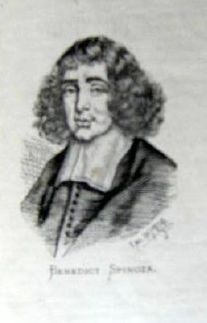
(279) ARNOLDSON, Klas Pontus (1844-1916) Benedict Spinoza. En uppsats. (Aftryck ur manadskriften Sanningsökaren.)
Upsala, Esaias Edquist 1877.
16p. With wood-engraved portrait by Emil Behrens. Orig. printed wrappers.
First (only) separate edition.
*SB 9556.
(280) BETZ, Hendrik Johan (1842-1905) Spinoza en de vrijheid. Eenige bedenkingen tegen de Spinoza-studie van den heer J.H. Gunning Jr.
's Gravenhage, Martinus Nijhoff 1877.
[IV],96p. Orig. printed wrappers.
First (only) edition. A critical review of J.H. Gunning's publication Spinoza en de idee der persoonlijkheid of 1876.
(281) BROUWERS, Jan Willem (1831-1893) Wederwoord, in verzen en in proza, aan de twee pennen in De Gids, en De Nederlandsche Spectator over La Néerlande à Victor Hugo, (Darwin en Spinoza).
Amsterdam, C.L. van Langenhuysen 1877.
84p. Old blank wrappers.
First (only) edition. The author was a priest and journalist, poet and historian, author of numerous pamphlets favouring the Catholic position.
*SB 2390.
(282) CAMERER, Theodor (1833-1909) Die Lehre Spinoza's.
Stuttgart, J.G. Cotta 1877.
XIX,[1],300p. Contemp. half calf, gilt back with red label.
First edition.
*Wolf 977. SB 1585.
(283) DESSAUER, Moritz (1842-1895) Der Sokrates der Neuzeit und sein Gedankenschatz. Sämmtliche Schriften Spinoza's gemeinverständlich und kurz gefasst mit besonderer Hervorhebung aller Lichtstrahlen.
Cöthen, Paul Schettler's Verlag 1877.
IV,182,[1]p. Modern half cloth.
First (only) edition.
*SB 1724.
(284) HEINZE, Max (1835-1909) Zum Gedächtniss Spinozas an seinem zweihundertjährigen Todestage. [In:] Im neuen Reich Band 7.
[Leipzig, Hirzel 1877.]
p.337-351. Blank wrappers.
*SB 1141.
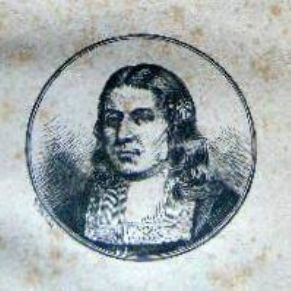
(285) HOFFDING, Harald (1843-1931) Spinozas liv og laere. Et bidrag til taenkningens historie i det 17de aarhundrede.
Kobenhavn, Rudolph Klein 1877.
V,[3],164,[2]p. With a small oval portrait on title. Contemp. half cloth.
First (only) edition. The author was professor of philosophy in Copenhagen, strongly influenced by Soren Kierkegaard in his early development, later a positivist.
*SB 11344.
(285) HOFFDING, Harald (1843-1931) Spinozas liv og laere. Et bidrag til taenkningens historie i det 17de aarhundrede.
Kobenhavn, Rudolph Klein 1877.
V,[3],164,[2]p. With a small oval portrait on title. Contemp. half cloth.
First (only) edition. The author was professor of philosophy in Copenhagen, strongly influenced by Soren Kierkegaard in his early development, later a positivist.
*SB 11344.
(286) LAND, Jan Pieter Nicolaas (1834-1897) Ter gedachtenis van Spinoza. Uitgesproken in de akademische lessen van 24 Februarij 1877.
Leiden, E.J.Brill 1877.
8p. Orig. printed wrappers.
First (only) edition. The author was professor of philosophy and Oriental languages in Leiden. He was, together with Johannes van Vloten, responsible for the publication of Spinoza's works in 1882-83, and for several articles on Spinoza, mainly of bibliographical interest. The benefit of this publication was destined for the Spinoza statue in The Hague unveiled in 1880.
(287) RENAN, Ernest (1823-1892) Spinoza. Discours prononcé à la Haye le 21 février 1877, à l'occasion du 200e anniversaire de sa mort.
La Haye, Martinus Nijhoff 1877.
31p. Orig. printed wrappers.
First edition (?), simultaneously published in Paris with a slightly different title. A German translation appeared the same year. The benefit of this publication was destined for the Spinoza statue in The Hague unveiled in 1880.
*Wolf 1115. Spinozahuis 236/. SB 12138 (the Paris edition only).
(288) SARCHI, Carlo (180?-1879) Della dottrina di Benedetto de Spinoza e di Gian Battista Vico. Discorsi.
Milano, L. Bortolotti 1877.
VIII,206,[1]p. Orig. printed wrappers.
First (only) edition. This volume consists of four discourses: on the author's Italian translation of Vico's De uno universi juris principio, on Aristotle's theory of distributive justice, on Vico's De antiquissima Italorum, and on his (the first Italian) translation of Spinoza's Tractatus theologico-politicus (1875).
*Wolf 1131.
(289) TURBIGLIO, Sebastiano (1842-1901) Le antitesi tra il medioevo e l'età moderna nella storia della filosofia in especie nella dottrina morale di Malebranche.
Roma, Tipografia dell'Opinione 1877.
[VIII],XLVII,[4],34-183,[2]p., thus complete. Orig. printed wrappers.
First (only) edition.
(290) VLOTEN, Johannes van (1818-1883) Prof. Jhr. Van der Wijck's Spinoza getoetst.
Haarlem, W.C. de Graaff 1877.
20p. Orig. printed wrappers.
First (only) edition. A critical review of B.H.C.K. van der Wijck's publication Spinoza (1877).
(291) WIJCK, Bernard Hendrik Cornelis Karel van der (1836-1925) Spinoza.
Groningen, J.B.Wolters 1877.
48p. Orig. printed wrappers.
First (only) edition. The author was professor of philosophy in Groningen.
*Spinozahuis 238/. SB 11345.
(292) KRIEGSMANN, Georg. Die Rechts- und Staatstheorie des Benedict von Spinoza. [In:] Gymnasium mit Höherer Bürgerschule in Wandsbeck. V. Jahresbericht ...
Wandsbeck, Fr. Puvogel 1878.
4to. XV,[1]p.
First (only) edition.
*SB 1912.
(293) FROHSCHAMMER, Jakob (1821-1893) Ueber die Bedeutung der Einbildungskraft in der Philosophie Kant's und Spinoza's.
München, Theodor Ackermann 1879.
VII,[1],172,8p. Orig. cloth-backed printed boards.
First (only) edition. The author was professor of philosophy in Munich.
*SB 1123.
(294) LAND, Jan Pieter Nicolaas (1834-1897) Over de eerste uitgaven der brieven van Spinoza. Amsterdam, Johannes Müller 1879.
12p. Orig. printed wrappers. (Offprint from Verslagen en Mededeelingen der Koninklijke Akademie van Wetenschappen, Afdeling Letterkunde, 2de Reeks, Deel IX)
First (only) separate edition.
*Spinozahuis 243/.
(295) AUERBACH, Berthold (1812-1882) Spinoza. Ein Denkerleben. Separat-Abdruck aus Auerbachs Romanen.
Stuttgart, J.C. Cotta 1880.
Small 8vo. XII,284p. Contemp. half cloth, marbled sides, little faded.
Seventh edition, an unchanged reprint of the third edition of 1857. Originally published in 1837 under the title Spinoza. Ein historischer Roman.
*Van der Linde 126 (second edition of 1854). Wolf 1204. SB 1961.
(296) CARO, Elme Marie (1826-1887) La philosophie de Goethe. Deuxième édition.
Paris, Hachette 1880.
Small 8vo. [IV],398,[1]p. Contemp half calf, gilt back.
Second edition, first published in 1866. The second chapter (p.31-60) treats the influence of Spinoza on Goethe.
*SB 1347.
(297) FREDERIKS, Johannes Godefridus (1828-1896) Colerus' Leven van Spinoza herdrukt.
[Amsterdam 1880.]
7p. (Offprint from De Nederlandsche Spectator)
First (only) separate edition. On the facsimile edition of Colerus' biography of Spinoza (1705) published in 1880.
(298) POST, Gerrit Pieter (1838-1910) Spinoza. Eene volksvoordracht.
's- Gravenhage, W.A. Beschoor (Firma S. van Velzen Jr.) 1880.
28p. Orig. printed wrappers.
First (only) edition. A critical comment on Spinoza at the occasion of the unveiling of the Spinoza statue in The Hague that year, from an orthodox Christian point of view.
(299) RAEDER, Hans. Logische Prüfung der im ersten Buch von Baruch Spinoza's Ethik enthaltenen Definitionen. [In:] Gymnasium mit Höherer Bürgerschule in Wandsbeck. VII. Jahresbericht ...
Wandsbeck, Fr. Puvogel [1880].
4to. VIIp.
First (only) edition.
*SB 1361.
(300) VLOTEN, Johannes van (1818-1883) Spinoza. De blijde boodschapper der mondige menschheid. Toespraak bij de onthulling van zijn standbeeld.
's-Gravenhage, Martinus Nijhoff 1880.
20p. Orig. printed wrappers.
First (only) edition. The author's speech delivered at the occasion of the unveiling of the Spinoza statue in The Hague that year.
*Spinozahuis 240/. SB 3400.
(301) LAND, Jan Pieter Nicolaas (1834-1897) Over de uitgaven en den text der Ethica van Spinoza.
Amsterdam, Johannes Müller 1881.
21p. Orig. printed wrappers. Offprint from Verslagen en mededeelingen der Koninklijke Akademie van Wetenschappen, afdeeling Letterkunde, 2de reeks, deel XI.
First (only) separate edition.
(302) LAND, Jan Pieter Nicolaas (1834-1897) Over vier drukken met het jaartal 1670 van Spinoza's Tractatus theologico-politicus.
Amsterdam, Johannes Müller 1881.
11p. Orig. printed wrappers. Offprint from Verslagen en mededeelingen der Koninklijke Akademie van Wetenschappen, afdeeling Letterkunde, 2de reeks, deel XI.
First (only) separate edition.
*Wolf 276. Spinozahuis 244/. SB 13425.
(303) REICHENAU, Wilhelm von. Die monistische Philosophie von Spinoza bis auf unsere Tage.
Köln und Leipzig, Eduard Heinrich Mayer 1881.
XX,348p. Contemp. stiff boards, little worn. Stamp on title and verso.
First edition, a second edition appeared 1884.
*SB 1920.
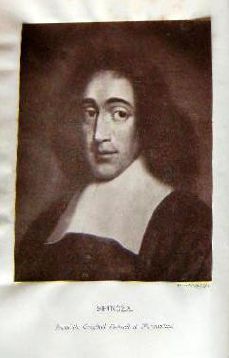
(304) MARTINEAU, James (1805- 1900) A study of Spinoza.
London, Macmillan 1882.
XI,371,32 [publ. cat.]. With portrait of Spinoza in Woodburytype. Orig. cloth, top of back damaged.
First edition. The author was an English religious philosopher influential in the history of Unitarianism, professor of mental and moral philosophy in Manchester New College,
*Wolf 1078. SB 474. Boucher 1545.
(304) MARTINEAU, James (1805- 1900) A study of Spinoza.
London, Macmillan 1882.
XI,371,32 [publ. cat.]. With portrait of Spinoza in Woodburytype. Orig. cloth, top of back damaged.
First edition. The author was an English religious philosopher influential in the history of Unitarianism, professor of mental and moral philosophy in Manchester New College,
*Wolf 1078. SB 474. Boucher 1545.
(305) WEGENER, Richard. Spinozas Begriff und Beweis der Existenz Gottes.
Berlin, Erich Wallroth 1882.
55p. Orig. printed wrappers.
Reissue of the author's Begriff und Beweis der Existenz Gottes bei Spinoza (1873), with a replaced title leaf.
*SB 1187 (the edition of 1873).
A small reconstruction of his library (306-324)
(306) [ARNAULD, Antoine (1612-1694) & Pierre NICOLE (1625-1695)] La logique ou l'art de penser: contenant, outre les regles communes, plusieurs observations nouvelles, propres à former le jugement. Seconde edition, reveuë & augmentée.
Paris, Charles Savreux 1664.
12mo. 473,[7]p. & errata-leaf after the title. Contemp. vellum. Book plate removed from front paste down.
Second revised edition. The famous Port-Royal logic, the basis for the study of logic for two centuries, first published in 1662 by the same publisher.
*Servaas van Rooijen 12mo 5 (Logique ou l'art de penser). Spinozahuis 123 (ed. of 1675)/3 (id.). En français dans le texte 100.
(307) Biblia latina. Testamenti veteris biblia sacra, sive libri canonici priscae Judaeorum ecclesiae a Deo traditi. Latini recens ex Hebraeo facti brevibusq; scholiis illustrati ab Immanuele Tremellio, & Francisco Junio ... Tertia cura ... [Bound with:] Testamentum novum, sive fedus novum ...
Hanovia [Hanover], typis Wechelianis, sumptibus Danielis ac Davidis Aubriorum nec non Clementis Schleichi 1618.
2 volumes in 1. 4to. [VIII],1063, 456,[16]p. Printed in double columns.
Modern black morocco, back gilt lettered. Some staining throghout and a few repairs to lower margin of first leaves.
*Servaas van Rooijen 4to 5 (Biblia Junii et Tremellii). Wolf 1246 (ed. of 1593) and 1247 (ed. of 1651).
(308) BUXTORF, Johannes (1564-1629) & Johannes BUXTORF (1599-1664) Thesaurus grammaticus linguae sanctae Hebraeae, duobus libris methodice propositus, quorum prior, vocum singularum naturam & proprietates: alter vocum conjunctarum rationem ... explicat: adjecta, prosodia metrica, sive poeseos Hebraeorum dilucida tractatio: Lectionis Hebraeo-Germanicae usus, & exercitatio, cum ... indice. Editio sexta recognita à Johanne Buxtorfio, filio.
Basileae, impensis Johannis Buxtorfi, junioris. Typis Joh. Jacobi Deckeri 1663.
[XVI],669,[33]p. Contemp. blind-tooled vellum.
*Servaas van Rooijen 8vo 12 (Buxtorfii Thesaurus gramm.). Spinozahuis 91 (ed. of 1629)/20 (id.). Wolf 1248 (ed. of 1620).
(309) DESCARTES, René (1596-1650) Opera philosophica. Editio secunda. Ab auctore recognita.
Amstelodami, apud Ludovicum Elzevirium [Amsterdam, L.Elzevier] 1650-54.
5 parts in 1 volume. 4to. [II],[XII],191, 164,88, [XL],302 (i.e. 292, p.217-226 omitted in pagination), [XVI],316, [XIV],98,[5]p. The third and fourth part (the Principia and Specimina) with numerous woodcuts in the text. Contemp. vellum, back with gilt lettered red calf label. Fine copy. Each part with own title-page, with a general title as quoted.
Second collected edition, in fact bound up from separate printings of the various parts with a general title.
*Servaas van Rooijen 4to 20 (Renati Descartes de prima Philosophia. de Geometria). Servaas van Rooijen 4to 24 (Descartes opera Philosophica 1650).
Constituted as folllows:
Meditationes de prima philosophia ... Editio ultima prioribus auctior & emendatior, 1654.
Appendix, continens obiectiones quintas & septimas in Renati Des-Cartes Meditationes ... cum ejusdem ad illas responsionibus & duabus epistolis, una ad patrem Dinet ... altera ad ... Gisbertum Voetium, 1654.
Principia philosophiae, 1650.
Specimina philosophiae: seu dissertatio de methodo. Rectè regendae rationis, & veritatis in scientiis investigandae: dioptrice, et meteora. Ex Gallico translata ... 1650.
Passiones animae per Renatum Des Cartes: Gallicè ab ipso conscriptae, nunc autem in exterorum gratiam Latina civitate donatae ab H[enri] D[es] M[arets] 1650.
*Guibert p.229.
(310) EPICTETUS. Epicteti stoici philosophi enchiridion, unà cum Cebetis Thebani tabula. Accessère Arriani commentariorum de Epicteti disputationibus lib. IV. omnia Hieron. Wolfio interprete ... Item Porphyrii philosophi Pythagorici De abstinentia ab animalibus necandis libri quatuor, ex nova versione, cui subjiciuntur notae breviusculae ... Lucas Holstenius Hamburgens Latinè vertit. ...
Cantabrigiae [Cambridge], ex celeberrimae Academiae typographeo, impensis G.Morden 1655.
3 parts in 1 volume. [VIII],495,[17], [II],285,[11], 87,[15]p., with a general title and separate titles to the first two works. Printed in double columns Greek/Latin. Contemp. boards, corners worn.
*Servaas van Rooijen 8vo 8 (Epicteti Enchiridion cum tab. Cebetis cum Wolfii annot.). Spinozahuis 87 (ed. of 1596)/46 (id.). Wolf (ed. of 1670).
(311) FRANCIOSINI, Lorenzo (1600- 1645) Vocabulario Italiano, e Spagnuolo ultimamente con la correzione ed aggiunta del suo vero autore mandato in luce ...
Roma, nella stamperia della R. Cam. Apost. 1638.
2 parts in 1 volume. [IV],690,[VI],834,[1]p. Contemp. vellum, stained.
*Servaas van Rooijen 8vo 9 (Franciosini Vocabolario Ital. et Spagn.).
(312) [LA COURT, Johan de (1622-1660)] Consideratien van staat, ofte politike weeg- schaal, waar in met veele reedenen, omstandigheden, exempelen, en fabulen wert overwogen; welke forme der regeeringe, in speculatie gebout op de practijck, onder de menschen de beste zy. Beschreven door V.H. In deze vierde editie naawkeurig [sic!] overzien ...
Amsterdam, Dirk Dirksz 1662.
Small 8vo. [XXVIII],670p. With engraved title and 2 folding engraved plates (the Great Council of Venice and ballot boxes. Contemp. vellum. Upper margin in the beginning faintly stained, tear in inner margin of one plate.
One of several editions of 1662, first published in 1660.
*Servaas van Rooijen 8vo 11 (Polityke weeghschael door V.H. 1661). Wildenberg 1035.
(313) [LA COURT, Johan de (1622- 1660)] Politike discoursen handelende in ses onderscheide boeken, van steeden, landen, oorlogen, kerken, regeeringen, en zeeden. Beschreven door D.C.
t'Amsterdam, by I. Ciprianus vandr. Gracht 1662.
Small 8vo. [XXIV],344,311,[1 errata]p. With engraved title. Contemp. vellum.
The 8vo edition from the same year as the 4to edition in Spinoza's library published by Hackius in Leiden.
*Servaas van Rooijen 4to 11 (Politieke discourssen 1662 Leyden). Spinozahuis 376 (the 4to ed.)/300 (id.). Wildenberg 1062.
(314) [LA PEYRERE, Isaac de (1596-1676)] Praeadamitae. Sive exercitatio super versibus duodecimo, decimotertio, & decimoquarto, capitis quinti epistolae D. Pauli ad Romanos. Quibus inducuntur primi homines ante Adamum conditi. [Followed by:] Systema theologicum, ex prae-Adamitarum hypothesi. Pars prima [all published].
[Amsterdam, Louis and Daniel Elzevier] Anno salutis 1655.
4to. [IV],52,[XVI],8,297,8p. With an engraved map of the Holy Land. Contemp. calf, rebacked, sides with gilt borders, new endpapers. Title lightly soiled and frayed.
First edition. An early criticism of the bible which caused a great rumour and was immediately forbidden. Spinoza had a copy in his library and the book is said to have been of great influence on him.
*Servaas van Rooijen 4to 28 (Praeadamita 1655). Spinozahuis 52/111. Wolf 547 (the second edition in 8vo from the same year). Willems 1188. Peignot II,p.35. Knuttel, Verboden boeken 318.
Added: Two handwritten letters from A.S. Oko to Dr.E.N. Adler and 4 typewritten letters from the Cambridge bookseller Frank R.Brown to the same, all dated 1935, concerning the present book.
(315) L'EMPEREUR, Constantin (1591-1648) Halîkôt ôlam im mavô' hagmora' [in Hebrew] sive Clavis Talmudica. Complectens formulas, loca dialectica & rhetorica priscorum Judaeorum. Latinè reddita per Constantinum l'Empereur ab Oppyck ... Cum indicibus accuratissimis, & dissertatione, qua operis usus, utilitasque ostenduntur.
Lugduni Batavorum, ex officina Elseviriorum [Leiden, Elsevier] 1634.
4to. [XL],232,[24]p. Contemp. vellum.
First (only) edition. An introduction to Talmud by the 15th century author Yeshua ben Yosef Ha-Levi, here published in Hebrew with Latin translation and index by the Dutch Hebraist Constantin l'Empereur. Spinoza had a copy in his library.
*Servaas van Rooijen 4to 19 (L'Empereur Clavis Talmudica). Spinozahuis 43/67.
(316) LUCIANUS SAMOSATENSIS. Selecti mortuorum dialogi. Cum interpretatione Latina, & grammatica singularum vocum explanatione.
Parisiis, Sebastianum Cramoisy et Gabrielem Cramoisy 1646.
Small 8vo. [IV],237,[28]p. Contemp. calf, gilt back with label, extremities little worn. Old scribbling to title.
*Servaas van Rooijen 8vo 20 (Luciani mortuorum dialogi).
(317) PETRARCA, Francesco (1304- 1374) De vita solitaria ... Editio secunda, priore longè castigatior. [Bound with:] De republica optime administranda, liber. Eiusdem de officio et virtutibus imperatoriss liber.
Bernae, excudebat Ioannes le Preux 1605 & No place, Esaias le Preux 1617.
2 works in 1 volume. 16mo. 285,136p. With woodcut vignette on title of the first work, and woodcut portrait on title of the second work. Contemp. overlapping vellum.
It may not surprise that Spinoza had a copy of Petrarca's famous book On the solitary life! It is here bound with Petrarca's book on republican government, first printed in 1602.
*Servaas van Rooijen 12mo 27 (Petrarcha de Vita Solitaria). Spinozahuis 145/109.
(318) PETRONIUS ARBITER (c.27-66) Satyricon, cum fragmento nuper Tragurii reperto. Accedunt diversorum poëtarum Lusus in Priapum, Pervigilium Veneris, Ausonii cento nuptialis, Cupido crucifixus, epistolae de Cleopatra, & alia nonnulla. Omnia commentariis, & notis doctorum virorum illustrata. Concinnante Michaele Hadrianide.
Amstelodami, typis Ioannis Blaeu [Amsterdam, Joan Blaeu] 1669.
2 parts in 1 volume. [XXXVI],558,[42],168,[8]p. With engraved title by Romeyn de Hooghe. Contemp. calf, gilt back with red label, spine ends litle worn. Engraved armorial bookplate on front paste-down.
*Servaas van Rooijen 8vo 14 (Petronius Arbiter cum Comm. 1669. Amstel.). Spinozahuis 93/110. Wolf 1270 (ed. of 1614) and 1271 (ed. of 1694).
(319) PIGNORIUS, Laurentius (1571-1631) Mensa Isiaca, qua sacrorum apud Aegyptios ratio & simulacra subjectis tabulis aeneis simul exhibentur & explicantur. Accessit ejusdem authoris de Magna deum matre discursus, & sigillorum, gemmarum, amuletorum aliquot figurae & earundem ex Kirchero Chisletioque interpretatio. Nec non Jacobi Philippi Tomasini Manus Aenea, & de vita rebusque Pignorii dissertatio.
Amstelodami, sumptibus Andreae Frisii [Amsterdam, Andreas Frisius] 1669.
2 parts in 1 volume. 4to. [VIII],96,[11], [VIII],96p. With engraved title, 3 title leaves with engraved vignette, 17 engraved plates (11 folding) and 33 engravings (some full-page) in the text. Contemp. calf, gilt back, gilt double line borders on both sides, small repair to top of back, a few worm holes. A few quires browned and minor repairs to the folding plates but a good copy.
Third edition of a path-breaking study on Egyptology, first published in 1605 with a different title. It treats the Mensa Isiaca, a bronze table top found around 1525 in the ruins of the temple of Isis in Rome.
*Servaas van Rooijen 4to 15 (Pignorii Mensa Isiaca. Amstel. 1669). Spinozahuis 39/113. Wolf 1272.
(320) SANDIUS, Christophorus or Christof SAND (1644- 1680) Nucleus historiae ecclesiasticae, exhibitus in historia Arianorum, tribus libris comprehensa: quibus praefixus est tractatus de veteribus scriptoribus ecclesiasticis. Secunda editio ab authore locupletata & emendata.
Coloniae [but Amsterdam], apud Joannem Nicolai 1676.
4to. [VIII],436,[20]p. Contemp. panelled calf, back little damaged.
Second, but actually third edition. The author was born in Königsberg and fled with his father to Amsterdam. Both held opinions close to Socinianism.
*Servaas van Rooijen 4to 18 (Sandii Nucleus Hist. Eccles. 1676 col. cum Tractatu de Script. Vet. Eccles.). Spinozahuis 42/127. Knijff & Visser 3123.
(321) SCHOOTEN, Frans van (1615-1660) Principia matheseos universalis, seu introductio ad geometriae methodum Renati Des Cartes, edita ab Er. Bartholino, Casp. fil. [Bound with:] De organica conicarum sectionum in plano descriptione, tractatus. Geometris, opticis; praesertim vero gnomonicis & mechanicis utilis. Cui subnexa est appendix, de cubicarum aequationum resolutione.
Lugd. Bat., ex officina Elseviriorum [Leiden, B. & A. Elzevier] 1651 & 1646.
4to. 2 works in 1 volume. [XIV],46p., wanting title-leaf & [XVI],117p. With numerous figures in the text of the second work. Contemp. or slightly later full red morocco, back richly gilt with double label, both sides with gilt triple-line borders, all edges gilt, marbled endpapers.
First edition of both works. Frans van Schooten was one of the greatest mathematicians of his time, professor in Leiden and translator of Descartes' Geometria into Latin, of seminal importance for the introduction of Cartesian mathematics in Europe. Among his students were Christiaan Huygens, Johan de Witt and Johan Hudde. Spinoza had a copy of the first work in his library. The second work on the kinematic generation of conic sections by means of linkages is Van Schooten's first original work. Both works are of great rarity.
First work: *Servaas van Rooijen 4to 38 (à Schooten Principia matheseos univer. 1651). Spinozahuis 62/130. Willems 699.
Second work: *Willems 607.
(322) SENECA, Lucius Annaeus. Epistolae, quae exstant ex recensione I. Lipsii & Io. Fr. Gronovii.
Lugdun. Batavor. [Leiden], ex officina Elseviriana 1649.
12mo. 502p. Contemp. full morocco, back richly gilt, triple line borders on both sides, inner gilt dentelles, all edges gilt.
*Servaas van Rooijen 12mo 8 (Seneca Epistolae). Spinozahuis 126/136.
(323) SNELLIUS, Willebrord (Willebrord Snel van Royen) (1580-1626) Tiphys batavus, sive histiodromice, de navium cursibus, et re navali.
Lugduni Batavorum, ex officina Elseviriana [Leiden, B. & A. Elzevier] 1624.
4to. [LVI],109,[3],62,[1]p. With 2 engraved plates and a full-page engraving and some woodcuts in the text. Recent boards with old vellum back. Some browning, blank corner of one leaf torn without loss.
First (only) edition. One of the earliest mathematical treatises on navigation. Snellius was a Dutch astronomer and mathematician, professor at the University of Leiden.
*Servaas van Rooijen 4to 35 (Snellii Tiphys Batavus). Spinozahuis 59/138. Wolf 1285 (wanting the plates). Bierens de Haan 4397. Willems 224.
Lugduni Batavorum, ex officina Elseviriana [Leiden, B. & A. Elzevier] 1624.
4to. [LVI],109,[3],62,[1]p. With 2 engraved plates and a full-page engraving and some woodcuts in the text. Recent boards with old vellum back. Some browning, blank corner of one leaf torn without loss.
First (only) edition. One of the earliest mathematical treatises on navigation. Snellius was a Dutch astronomer and mathematician, professor at the University of Leiden.
*Servaas van Rooijen 4to 35 (Snellii Tiphys Batavus). Spinozahuis 59/138. Wolf 1285 (wanting the plates). Bierens de Haan 4397. Willems 224.
(324) WOLZOGEN, Lodewijk (1633-1690) Orthodoxa fides sive adversus Johannem de Labadie censura censurae Medioburgensis in libellum De interprete Scripturarum. Ipse libellus secunda editione praemissus est.
Trajecti ad Rhenum, apud Johannem Ribbium [Utrecht, Johannes Ribbius] 1668.
Small 8vo. [XLVI],[2 blank],[4],112,[4],326,[4]p. Contemp. vellum, ribbed back with ms. title, green sprinkled edges. Mildly browned throughout, upper margin short but sufficient. Bookplate from a Jesuit library.
First edition thus, including the author's De Scripturarum interprete, also published separately the same year. Lodewijk Wolzogen (here written as Ludovicus), a protestant theologian from Middelburg and Cartesio-Cocceian professor at the university of Utrecht, had published a refutation of Lodewijk Meyer's Philosophia S. Scripturae interpres. His refutation however was considered full of dangerous and Socinian views by orthodox theologians, among whom was Jean de Labadie. In the present volume Wolzogen answered his critics. It is preceded by the text of his refutation of Meyer's book De Scripturarum interprete adversus exercitatorem paradoxum. In two following letters it is - as we now know falsely - stated that the author of that contested book was not Lambert van Velthuysen. Bamberger notes that only in 1670, when Spinoza's Tractatus appeared and the similarities with Meyer's book were noted, Spinoza was mentioned as its author.
*Servaas van Rooijen 12mo 15 (the separate edition of De Scripturarum interprete). Van der Linde 59 (id.). Bamberger 6. Spinozahuis 133/156 (id.).
References
Bamberger
Fritz Bamberger, Early editions of Spinoza's Tractatus theologico-politicus. A bibliohistorical reexamination, in Studies in bibliography and booklore, vol. 5, 1961. Reprinted in:
Bamberger
Fritz Bamberger, Spinoza & anti-Spinoza literature. The printed literature of Spinozism 1665-1832. Laurel S.Wolfson and David J. Gilner, editors. Cincinnati 2003.
Boucher
Wayne I. Boucher, Spinoza in English. A bibliography from the seventeenth century to the present. Second edition. Bristol 2002.
Dommanget
Maurice Dommanget, Sylvain Marechal. L'egalitaire 'L'homme sans Dieu'. Sa vie, son oeuvre (1750-1803). Paris 1950.
Evans
David Owen Evans, Le socialisme romantique. Pierre Leroux et ses contemporains. Paris 1948.
Glazemaker
Glazemaker 1682-1982. Catalogus bij een tentoonstelling over de vertaler Jan Hendriksz Glazemaker in de Universiteitsbibliotheek van Amsterdam. Amsterdam 1982.
Israel
Jonathan I.Israel, Radical enlightenment. Philosophy and the making of modernity 1650-1750. Oxford 2001.
Joode
Steven de Joode, Bibliografie van de polemiek rond Van Leenhofs Den hemel op aarden (Joode).
Kingma & Offenberg
J.Kingma & A.K.Offenberg, Bibliography of Spinoza's works up to 1800, in Studia Rosenthaliana, vol. 11. 1977.
Knuttel
W.P.C.Knuttel, Verboden boeken in de Republiek der Vereenigde Nederlanden. Beredeneerde catalogus. 's-Gravenhage 1914.
Land
J.P.N.Land, Over vier drukken met het jaartal 1670 van Spinoza's Tractatus theologico-politicus, in Verslagen en mededeelingen der Koninklijke Akademie van Wetenschappen, afdeeling Letterkunde. 1881.
Macdonald & Hargreaves
Hugh Macdonald & Mary Hargreaves, Thomas Hobbes. A bibliography. London 1952.
Presser
Jacob Presser, Das Buch De tribus impostoribus (Von den drei Betrugern). Amsterdam 1926.
Rosenberg
Aubrey Rosenberg, Tyssot de Patot and his work 1655-1738. The Hague 1972.
SB
Spinoza Bibliografie. Spinoza-Gesellschaft (SB).
Servaas van Rooijen
A.J. Servaas van Rooijen, Inventaire des livres formant la bibliothèque de Bénédict Spinoza, publié d'après un document inédit avec des notes biographiques et bibliographiques et une introduction. La Haye-Paris 1888 (Servaas van Rooijen).
Spinozahuis
Catalogus van de boekerij der vereeniging Het Spinozahuis. [Ed. by J. te Winkel.] Den Haag [1914].
/
Catalogus van de bibliotheek der vereniging Het Spinozahuis te Rijnsburg. Leiden 1965.
Stoddard
Roger E.Stoddard, Julien Offray de La Mettrie, 1709-1751. A bibliographical inventory. Koln 2000.
Van der Linde
A. van der Linde, Benedictus Spinoza. Bibliografie. 's Gravenhage 1871.
Vercruysse
Jeroom Vercruysse, Bibliographie descriptive des ecrits du Baron d'Holbach. Paris 1971.
Wade
Ira O.Wade, The clandestine organization and diffusion of philosophic ideas in France from 1700 to 1750. Princeton 1938.
Warda
Arthur Warda, Die Druckschriften Immanuel Kant's (bis zum Jahre 1838). Wiesbaden 1919.
Wildenberg
Ivo W.Wildenberg, Johan & Pieter de la Court (1622-1660 & 1618-1685). Bibliografie en receptiegeschiedenis. Amsterdam-Maarssen 1986.
Willems
Alphonse Willems, Les Elzevier. Histoire et annales typographiques. Bruxelles 1880.
Wolf
Spinoza (1632-1677). The library of the late Prof. Dr. A.Wolf. Internationaal Antiquariaat (Menno Hertzberger). Catalogue no.150. Amsterdam 1950
Fritz Bamberger, Early editions of Spinoza's Tractatus theologico-politicus. A bibliohistorical reexamination, in Studies in bibliography and booklore, vol. 5, 1961. Reprinted in:
Bamberger
Fritz Bamberger, Spinoza & anti-Spinoza literature. The printed literature of Spinozism 1665-1832. Laurel S.Wolfson and David J. Gilner, editors. Cincinnati 2003.
Boucher
Wayne I. Boucher, Spinoza in English. A bibliography from the seventeenth century to the present. Second edition. Bristol 2002.
Dommanget
Maurice Dommanget, Sylvain Marechal. L'egalitaire 'L'homme sans Dieu'. Sa vie, son oeuvre (1750-1803). Paris 1950.
Evans
David Owen Evans, Le socialisme romantique. Pierre Leroux et ses contemporains. Paris 1948.
Glazemaker
Glazemaker 1682-1982. Catalogus bij een tentoonstelling over de vertaler Jan Hendriksz Glazemaker in de Universiteitsbibliotheek van Amsterdam. Amsterdam 1982.
Israel
Jonathan I.Israel, Radical enlightenment. Philosophy and the making of modernity 1650-1750. Oxford 2001.
Joode
Steven de Joode, Bibliografie van de polemiek rond Van Leenhofs Den hemel op aarden (Joode).
Kingma & Offenberg
J.Kingma & A.K.Offenberg, Bibliography of Spinoza's works up to 1800, in Studia Rosenthaliana, vol. 11. 1977.
Knuttel
W.P.C.Knuttel, Verboden boeken in de Republiek der Vereenigde Nederlanden. Beredeneerde catalogus. 's-Gravenhage 1914.
Land
J.P.N.Land, Over vier drukken met het jaartal 1670 van Spinoza's Tractatus theologico-politicus, in Verslagen en mededeelingen der Koninklijke Akademie van Wetenschappen, afdeeling Letterkunde. 1881.
Macdonald & Hargreaves
Hugh Macdonald & Mary Hargreaves, Thomas Hobbes. A bibliography. London 1952.
Presser
Jacob Presser, Das Buch De tribus impostoribus (Von den drei Betrugern). Amsterdam 1926.
Rosenberg
Aubrey Rosenberg, Tyssot de Patot and his work 1655-1738. The Hague 1972.
SB
Spinoza Bibliografie. Spinoza-Gesellschaft (SB).
Servaas van Rooijen
A.J. Servaas van Rooijen, Inventaire des livres formant la bibliothèque de Bénédict Spinoza, publié d'après un document inédit avec des notes biographiques et bibliographiques et une introduction. La Haye-Paris 1888 (Servaas van Rooijen).
Spinozahuis
Catalogus van de boekerij der vereeniging Het Spinozahuis. [Ed. by J. te Winkel.] Den Haag [1914].
/
Catalogus van de bibliotheek der vereniging Het Spinozahuis te Rijnsburg. Leiden 1965.
Stoddard
Roger E.Stoddard, Julien Offray de La Mettrie, 1709-1751. A bibliographical inventory. Koln 2000.
Van der Linde
A. van der Linde, Benedictus Spinoza. Bibliografie. 's Gravenhage 1871.
Vercruysse
Jeroom Vercruysse, Bibliographie descriptive des ecrits du Baron d'Holbach. Paris 1971.
Wade
Ira O.Wade, The clandestine organization and diffusion of philosophic ideas in France from 1700 to 1750. Princeton 1938.
Warda
Arthur Warda, Die Druckschriften Immanuel Kant's (bis zum Jahre 1838). Wiesbaden 1919.
Wildenberg
Ivo W.Wildenberg, Johan & Pieter de la Court (1622-1660 & 1618-1685). Bibliografie en receptiegeschiedenis. Amsterdam-Maarssen 1986.
Willems
Alphonse Willems, Les Elzevier. Histoire et annales typographiques. Bruxelles 1880.
Wolf
Spinoza (1632-1677). The library of the late Prof. Dr. A.Wolf. Internationaal Antiquariaat (Menno Hertzberger). Catalogue no.150. Amsterdam 1950
Index
Abbadie, Jacques 52
Adler, E.N. 314
Alembert, Jean Baptiste le Rond d' 155
Andala, Ruardus 50, 126
Angelis, Pedro de 183
Apostool, Samuel 33
Argens, Jean Baptiste de Boyer 118, 147
Aristotle 288
Arnauld, Antoine 56, 306
Arnoldson, Klas Pontus 279
Arpe, Pierre Frédéric 150
Arrian 310
Assarsson, Pehr 243
Aubert de Verse, Noel 55
Auerbach, Berthold 18, 30, 194, 295
Avenarius, Richard 254
Averroes 142
Adler, E.N. 314
Alembert, Jean Baptiste le Rond d' 155
Andala, Ruardus 50, 126
Angelis, Pedro de 183
Apostool, Samuel 33
Argens, Jean Baptiste de Boyer 118, 147
Aristotle 288
Arnauld, Antoine 56, 306
Arnoldson, Klas Pontus 279
Arpe, Pierre Frédéric 150
Arrian 310
Assarsson, Pehr 243
Aubert de Verse, Noel 55
Auerbach, Berthold 18, 30, 194, 295
Avenarius, Richard 254
Averroes 142
Bacon, Francis 188, 239
Bacon, Roger 237
Balling, Pieter 33
Barbeyrac, Jean 83
Barnikol, Ernst 202
Bartholin, Rasmus 321
Bartholmess, Christian 213
Basnage de Beauval, Jacques 163
Bauer, Bruno 202
Bauer, Wilhelm 227
Baumann, Johann Julius 255
Baumeister, Friedrich Christian 123
Baumgarten, Siegmund Jacob 89
Bayle, Pierre 58, 71, 84, 136, 139, 143, 147, 156, 172, 185, 190
Beccaria, Cesare 161
Bekker, Balthasar 61, 63, 89, 97, 105, 172
Bentley, Richard 122
Berckel, Abraham van 35, 47
Berkeley, George 255
Berlin, Hartog Itzig 220
Bernards, B. 90
Bertereau, Adolphe 203
Betz, Hendrik Johan 275, 280
Bidloo, Govard 59
Bilfinger, Georg Bernhard 107, 124, 127
Bilhuber, Maxim. Theoph. Wilh. 180
Bismarck, Otto von 247
Bodin, Jean 197
Böhmer, Eduard 24, 218, 225
Boerhaave, Herman 145, 172
Boettner, Gottfried 76
Bolingbroke, Henry St John, 1st Viscount 151, 153, 156
Bonavino, Cristoforo 239
Bontekoe, Cornelis 62, 70
Booms, Marinus 96
Bouillier, Francisque 200, 256
Boulainvilliers, Henri de 14, 112, 142, 146, 148
Bourignon, Antoinette 57
Bouwmeester, Johannes 1
Boyle, Robert 89, 122, 172
Brasch, Moritz 262
Bredenburg, Johannes 5, 48, 105, 110, 112, 131, 140
Bril, Jacob 96
Bröchner, Hans 221
Brouwer, Gerhard Nicolaus 99
Brouwers, Jan Willem 281
Brown, Frank R. 314
Bruder, Karl Hermann 21, 210
Brühl 121
Brun, Jean 46
Bruno, Giordano 139, 153, 173
Buchius, Paulus 75
Buddeus, Jean Francois 99, 107, 139
Bullet, Jean Baptiste 156
Buonafede, Appiano 172
Burg, Albert 26
Burgmann, Johann Christian 100
Burmannus, Franciscus (1) 72
Burmannus, Franciscus (2) 72
Burnet, Gilbert 122
Buttstaedt, H. 24
Buxtorf, Johannes (1) 308
Buxtorf, Johannes (2) 308
Buyt, F. 114
Buytendijck, Gosewynus van 96
Bacon, Roger 237
Balling, Pieter 33
Barbeyrac, Jean 83
Barnikol, Ernst 202
Bartholin, Rasmus 321
Bartholmess, Christian 213
Basnage de Beauval, Jacques 163
Bauer, Bruno 202
Bauer, Wilhelm 227
Baumann, Johann Julius 255
Baumeister, Friedrich Christian 123
Baumgarten, Siegmund Jacob 89
Bayle, Pierre 58, 71, 84, 136, 139, 143, 147, 156, 172, 185, 190
Beccaria, Cesare 161
Bekker, Balthasar 61, 63, 89, 97, 105, 172
Bentley, Richard 122
Berckel, Abraham van 35, 47
Berkeley, George 255
Berlin, Hartog Itzig 220
Bernards, B. 90
Bertereau, Adolphe 203
Betz, Hendrik Johan 275, 280
Bidloo, Govard 59
Bilfinger, Georg Bernhard 107, 124, 127
Bilhuber, Maxim. Theoph. Wilh. 180
Bismarck, Otto von 247
Bodin, Jean 197
Böhmer, Eduard 24, 218, 225
Boerhaave, Herman 145, 172
Boettner, Gottfried 76
Bolingbroke, Henry St John, 1st Viscount 151, 153, 156
Bonavino, Cristoforo 239
Bontekoe, Cornelis 62, 70
Booms, Marinus 96
Bouillier, Francisque 200, 256
Boulainvilliers, Henri de 14, 112, 142, 146, 148
Bourignon, Antoinette 57
Bouwmeester, Johannes 1
Boyle, Robert 89, 122, 172
Brasch, Moritz 262
Bredenburg, Johannes 5, 48, 105, 110, 112, 131, 140
Bril, Jacob 96
Bröchner, Hans 221
Brouwer, Gerhard Nicolaus 99
Brouwers, Jan Willem 281
Brown, Frank R. 314
Bruder, Karl Hermann 21, 210
Brühl 121
Brun, Jean 46
Bruno, Giordano 139, 153, 173
Buchius, Paulus 75
Buddeus, Jean Francois 99, 107, 139
Bullet, Jean Baptiste 156
Buonafede, Appiano 172
Burg, Albert 26
Burgmann, Johann Christian 100
Burmannus, Franciscus (1) 72
Burmannus, Franciscus (2) 72
Burnet, Gilbert 122
Buttstaedt, H. 24
Buxtorf, Johannes (1) 308
Buxtorf, Johannes (2) 308
Buyt, F. 114
Buytendijck, Gosewynus van 96
Calmet, Dom 156
Camerer, Theodor 282
Canz, Israel Gottlieb 133
Caro, Elme Marie 296
Casearius, Johannes 1
Cebes of Thebes 310
Chaplin, W. 5
Chapon 118
Charpentier, Louis 137
Citters, C. van 96
Clarke, Samuel 91, 109, 122, 143, 255
Clauberg, Johann 206
Claudius, Matthias 164, 193
Cocceius, Johannes 38, 62, 72
Colerus, Jean 14, 19, 73, 81, 82, 112, 113, 297
Collins, Anthony 139
Condillac, Etienne Bonnot de 134
Costa, Uriel da 102
Crescas, Hasdai 248
Creuzer, Christoph Andreas Leonhard 176
Cuffeler, Abraham Johannes 53, 139
Cuperus, Franciscus 48, 110, 131
Camerer, Theodor 282
Canz, Israel Gottlieb 133
Caro, Elme Marie 296
Casearius, Johannes 1
Cebes of Thebes 310
Chaplin, W. 5
Chapon 118
Charpentier, Louis 137
Citters, C. van 96
Clarke, Samuel 91, 109, 122, 143, 255
Clauberg, Johann 206
Claudius, Matthias 164, 193
Cocceius, Johannes 38, 62, 72
Colerus, Jean 14, 19, 73, 81, 82, 112, 113, 297
Collins, Anthony 139
Condillac, Etienne Bonnot de 134
Costa, Uriel da 102
Crescas, Hasdai 248
Creuzer, Christoph Andreas Leonhard 176
Cuffeler, Abraham Johannes 53, 139
Cuperus, Franciscus 48, 110, 131
Damiron, Jean Philibert 206
Darwin, Charles 281
Deckherr, Johann 58
Descartes, René 1, 14, 17, 20, 29, 32, 33, 50, 55, 57, 72, 83, 89, 118, 144, 145, 154, 172, 182, 200, 206, 213, 229, 237, 239, 245, 251, 255, 261, 270, 309, 321
Des Maizeaux, Pierre 85
Des Marets, Henri 309
Dessauer, Moritz 283
Deurhoff, Willem 75, 89, 90, 128
Devisme 178
Dierquens, Salomon 24
Dippel, Johann Conrad 83, 87, 97
Dittes, Friedrich 226
Dörffling, Max 268
Drbal, Mathias Amos 219
Drieberge, Joannes 83
Driessen, Antonius 95
Dufresnoy, Nicolas Lenglet 112
Duijkerius, Johannes 62, 71, 74
Dumarsais, César Chesneau 130, 151
Dunin-Borkowski, Stanislaus von 62
Du Voisin, Jean Baptiste 160
Darwin, Charles 281
Deckherr, Johann 58
Descartes, René 1, 14, 17, 20, 29, 32, 33, 50, 55, 57, 72, 83, 89, 118, 144, 145, 154, 172, 182, 200, 206, 213, 229, 237, 239, 245, 251, 255, 261, 270, 309, 321
Des Maizeaux, Pierre 85
Des Marets, Henri 309
Dessauer, Moritz 283
Deurhoff, Willem 75, 89, 90, 128
Devisme 178
Dierquens, Salomon 24
Dippel, Johann Conrad 83, 87, 97
Dittes, Friedrich 226
Dörffling, Max 268
Drbal, Mathias Amos 219
Drieberge, Joannes 83
Driessen, Antonius 95
Dufresnoy, Nicolas Lenglet 112
Duijkerius, Johannes 62, 71, 74
Dumarsais, César Chesneau 130, 151
Dunin-Borkowski, Stanislaus von 62
Du Voisin, Jean Baptiste 160
Earbery, Matthias 69
Edelmann, Johann Christian 202
Edwards, Betham 5
Eichhorn, Johann Gottfried 169
Enden, Franciscus van den 64
Engelschall, Carl Gottfried 97
Epictetus 310
Erdmann, Johann Eduard 267
Eugene of Savoy 175
Ewald, Schack Hermann 13
Edelmann, Johann Christian 202
Edwards, Betham 5
Eichhorn, Johann Gottfried 169
Enden, Franciscus van den 64
Engelschall, Carl Gottfried 97
Epictetus 310
Erdmann, Johann Eduard 267
Eugene of Savoy 175
Ewald, Schack Hermann 13
Fabricius, Johann Albert 105
Faccius, J. 113
Farnocchia, Andrea Aloysio 177
Faydit, Pierre Valentin 80
Fenelon, Francois 67, 92, 112, 126
Feuerbach, Ludwig Andreas 188, 211
Fichte, Immanuel Hermann 225
Fichte, Johann Gottlieb 164, 201, 235, 253
Fischer, Christian Gabriel 129
Fischer, Jean Chretien 139
Fischer, Kuno 245, 246, 267
Förster, Johann Christian 143
Fontenelle, Bernard Le Bovier de 130
Forsberg, Nicolaus August 244
Forster, William 1
Foucher de Careil, Louis Alexandre 217
Franchi, Ausonio 239
Franciosini, Lorenzo 311
Francois, Laurent 138
Fraser, Alexander Campbell 240
Frederick William I 107
Frederick II, Holy Roman Emperor 142
Frederick II, the Great 107, 116, 117, 147, 153
Frederiks, Johannes Godefridus 297
Freret, Nicolas 146, 159
Freudenthal, Jacob 104
Froer, V. 30
Frohschammer, Jakob 293
Froude, James Anthony 218
Faccius, J. 113
Farnocchia, Andrea Aloysio 177
Faydit, Pierre Valentin 80
Fenelon, Francois 67, 92, 112, 126
Feuerbach, Ludwig Andreas 188, 211
Fichte, Immanuel Hermann 225
Fichte, Johann Gottlieb 164, 201, 235, 253
Fischer, Christian Gabriel 129
Fischer, Jean Chretien 139
Fischer, Kuno 245, 246, 267
Förster, Johann Christian 143
Fontenelle, Bernard Le Bovier de 130
Forsberg, Nicolaus August 244
Forster, William 1
Foucher de Careil, Louis Alexandre 217
Franchi, Ausonio 239
Franciosini, Lorenzo 311
Francois, Laurent 138
Fraser, Alexander Campbell 240
Frederick William I 107
Frederick II, Holy Roman Emperor 142
Frederick II, the Great 107, 116, 117, 147, 153
Frederiks, Johannes Godefridus 297
Freret, Nicolas 146, 159
Freudenthal, Jacob 104
Froer, V. 30
Frohschammer, Jakob 293
Froude, James Anthony 218
Galenus, Abraham 33
Genovesi, Antonio 154, 157
Genthe, Friedrich Wilhelm 189
Germond, J.B.L. 190
Geulincx, Arnold 70, 206, 245
Gfroerer, August Friedrich 17
Ginsberg, Hugo 276
Glazemaker, Jan Hendrik 7, 8, 11
Goeree, Jan 90
Goethe, Johann Wolfgang von 164, 170, 193, 296
Gordon, Abraham 270
Gottsched, Johann Christoph 123
Gravesande, Willem Jacob 's 119
Griepenkerl, Friedrich Konrad 192
Gronovius, Johann Friedrich 322
Grotius, Hugo 80
Guhrauer, G.W. 104
Gunning, Johannes Hermanus 277, 280
Gurdon, Brampton 122
Genovesi, Antonio 154, 157
Genthe, Friedrich Wilhelm 189
Germond, J.B.L. 190
Geulincx, Arnold 70, 206, 245
Gfroerer, August Friedrich 17
Ginsberg, Hugo 276
Glazemaker, Jan Hendrik 7, 8, 11
Goeree, Jan 90
Goethe, Johann Wolfgang von 164, 170, 193, 296
Gordon, Abraham 270
Gottsched, Johann Christoph 123
Gravesande, Willem Jacob 's 119
Griepenkerl, Friedrich Konrad 192
Gronovius, Johann Friedrich 322
Grotius, Hugo 80
Guhrauer, G.W. 104
Gunning, Johannes Hermanus 277, 280
Gurdon, Brampton 122
Hadrianides, Michael 318
Hafner, Gottlob Eberhard 179
Hagen, Gottlieb Friedrich 125
Halma, François 71
Hamann, Johann Georg 164
Hattem, Pontiaan van 96, 140
Hebler, Carl 231
Hegel, Georg Wilhelm Friedrich 14, 164, 170, 195, 201, 205, 214
Heidanus, Abraham 38
Heinsius, Daniel 3, 85
Heinze, Max 272, 284
Helfferich, Adolph 207
Helms, Franz Jakob 100
Helvetius, Claude Adrien 140
Hemsterhuis, François 173, 184, 208
Herbart, Johann Friedrich 191, 192
Herbert of Cherbury 45, 73
Herder, Johann Gottfried 164, 170, 173, 193, 201
Heumann, Christoph August 89
Heydenreich, Karl Heinrich 164
Hitchcock, Ethan Allen 222, 232
Hoadly, Benjamin 83
Hobbes, Thomas 32, 34, 35, 47, 59, 73, 83, 89, 91, 109, 136, 139, 197, 243, 255
Hochstetter, Andreas Adam 65
Hochstetter, Ernst Friedrich 179
Hoffding, Harald 285
Hoffmann, Adolph Friedrich 116
Hoffmann, Friedrich 103
Holbach, Paul Henri Thiry d' 130, 146, 149, 159
Holstenius, Lucas 310
Holte, C. 178
Holtermann, Andreas 100
Hooghe, Romeyn de 318
Hoola van Nooten, Dirk 155
Horn, Ignaz Einhorn 241
Houtteville, Claude Francois Alexandre 101
Huber, Ulricus 197
Hudde, Johannes 50, 321
Huet, Pierre Daniel 50, 126, 213
Hugo, Victor 281
Hume, David 255
Huygens, Christiaan 50, 321
Hafner, Gottlob Eberhard 179
Hagen, Gottlieb Friedrich 125
Halma, François 71
Hamann, Johann Georg 164
Hattem, Pontiaan van 96, 140
Hebler, Carl 231
Hegel, Georg Wilhelm Friedrich 14, 164, 170, 195, 201, 205, 214
Heidanus, Abraham 38
Heinsius, Daniel 3, 85
Heinze, Max 272, 284
Helfferich, Adolph 207
Helms, Franz Jakob 100
Helvetius, Claude Adrien 140
Hemsterhuis, François 173, 184, 208
Herbart, Johann Friedrich 191, 192
Herbert of Cherbury 45, 73
Herder, Johann Gottfried 164, 170, 173, 193, 201
Heumann, Christoph August 89
Heydenreich, Karl Heinrich 164
Hitchcock, Ethan Allen 222, 232
Hoadly, Benjamin 83
Hobbes, Thomas 32, 34, 35, 47, 59, 73, 83, 89, 91, 109, 136, 139, 197, 243, 255
Hochstetter, Andreas Adam 65
Hochstetter, Ernst Friedrich 179
Hoffding, Harald 285
Hoffmann, Adolph Friedrich 116
Hoffmann, Friedrich 103
Holbach, Paul Henri Thiry d' 130, 146, 149, 159
Holstenius, Lucas 310
Holte, C. 178
Holtermann, Andreas 100
Hooghe, Romeyn de 318
Hoola van Nooten, Dirk 155
Horn, Ignaz Einhorn 241
Houtteville, Claude Francois Alexandre 101
Huber, Ulricus 197
Hudde, Johannes 50, 321
Huet, Pierre Daniel 50, 126, 213
Hugo, Victor 281
Hume, David 255
Huygens, Christiaan 50, 321
No entries
Jacobi, Friedrich Heinrich 144, 158, 164, 166, 168, 170, 171, 173, 181, 184, 198, 201, 208, 230, 253
Jacoby, Johann 242, 247
Jäsche, Gottlob Benjamin 186
Jakob, Ludwig Heinrich von 167
Janet, Paul 252
Jaquelot, Isaac 71
Jelles, Jarig 7, 8, 11, 12, 33
Jerusalem, Karl Wilhelm 158
Jeshua ben Joseph Ha-Levi 315
Joël, Manuel 248, 263
Josephus, Flavius 163
Junius, Franciscus 307
Jurieu, Pierre 55
Jacoby, Johann 242, 247
Jäsche, Gottlob Benjamin 186
Jakob, Ludwig Heinrich von 167
Janet, Paul 252
Jaquelot, Isaac 71
Jelles, Jarig 7, 8, 11, 12, 33
Jerusalem, Karl Wilhelm 158
Jeshua ben Joseph Ha-Levi 315
Joël, Manuel 248, 263
Josephus, Flavius 163
Junius, Franciscus 307
Jurieu, Pierre 55
Kahle, Ludwig Martin 126
Kalb, J.A. 16
Kant, Immanuel 107, 164, 167, 168, 186, 201, 226, 235, 253, 293
Kierkegaard, Soren 285
Kirchmann, Julius Hermann von 25, 28, 29, 260, 261
Klopstock, Friedrich Gottlieb 193
Knorn, Christian Friedrich 45
Knutzen, Matthias 91, 139, 153, 190
Koenen, Hendrik Jakob 204
Koerbagh, Adriaan 35, 36, 89
Kortholt, Christianus 14, 73
Kortholt, Sebastian 73, 76
Kriegsmann, Georg 292
Kym, Andreas Ludwig 273
Kalb, J.A. 16
Kant, Immanuel 107, 164, 167, 168, 186, 201, 226, 235, 253, 293
Kierkegaard, Soren 285
Kirchmann, Julius Hermann von 25, 28, 29, 260, 261
Klopstock, Friedrich Gottlieb 193
Knorn, Christian Friedrich 45
Knutzen, Matthias 91, 139, 153, 190
Koenen, Hendrik Jakob 204
Koerbagh, Adriaan 35, 36, 89
Kortholt, Christianus 14, 73
Kortholt, Sebastian 73, 76
Kriegsmann, Georg 292
Kym, Andreas Ludwig 273
Labadie, Jean de 38, 97, 324
La Chapelle, Armand Boisbeleau de 122
La Court, Johan de 32, 35, 312, 313
La Court, Pieter de 20, 32, 35, 37, 59
La Croze, Mathurin Veyssiere de 153
La Forge, Louis de 206
Lalande, J. 190
La Mettrie, Julien Offray de 132, 136, 145, 190
La Monnoye, Bernard de 142, 150, 189
Lamy, Francois 67, 112
Land, Jan Pieter Nicolaas 238, 286, 294, 301, 302
Lange, Joachim 107, 115, 116, 117, 120, 123, 125
Lange, Johann 63
Lange, Samuel Gotthold 120
La Peyrere, Isaac de 314
La Placette, Jean 84
La Porte, Joseph de 135
La Roche, Jacques Fontaine de 135, 141, 155
La Roche, Jean Baptiste Louis de 135
Lau, Theodor Ludwig 175, 176, 190
Le Clerc, Jean 68, 80, 156
Leenhof, Frederik van 77, 89, 139, 140, 190
Le Grand, Antoine 206
Leibniz, Gottfried Wilhelm 14, 50, 93, 101, 106, 107, 121, 133, 134, 143, 144, 145, 154, 173, 182, 201, 203, 207, 217, 219, 226, 237, 242, 255, 265, 272
L'Empereur, Constantin 315
Leroux, Pierre 209
Lessing, Friedrich 164
Lessing, Gotthold Ephraim 144, 158, 164, 166, 170, 171, 173, 201, 215, 219, 224, 230, 231, 242, 253, 265
Lewes, George Henry 249
Liesching, Christian Ludwig 180
Lilienthal, Michael 89
Limborch, Philipp van 68, 72, 102
Linde, Antonius van der 233, 234
Lips, Johann Heinrich 14
Lipsius, Justus 322
Liszynski, Casimir 153
Locke, John 68, 83, 105, 130, 143, 145, 154, 255
Lodtmann, Gerhard Wilhelm 127
Loewe, Johann Heinrich 235
Louis XIV 85
Lucianus Samosatensis 316
Lucas, Jean Maximilien 14, 142
Lucretius 89
Ludovici, Carl Gunther 107, 120, 121, 125
Lymington, Viscount 88
La Chapelle, Armand Boisbeleau de 122
La Court, Johan de 32, 35, 312, 313
La Court, Pieter de 20, 32, 35, 37, 59
La Croze, Mathurin Veyssiere de 153
La Forge, Louis de 206
Lalande, J. 190
La Mettrie, Julien Offray de 132, 136, 145, 190
La Monnoye, Bernard de 142, 150, 189
Lamy, Francois 67, 112
Land, Jan Pieter Nicolaas 238, 286, 294, 301, 302
Lange, Joachim 107, 115, 116, 117, 120, 123, 125
Lange, Johann 63
Lange, Samuel Gotthold 120
La Peyrere, Isaac de 314
La Placette, Jean 84
La Porte, Joseph de 135
La Roche, Jacques Fontaine de 135, 141, 155
La Roche, Jean Baptiste Louis de 135
Lau, Theodor Ludwig 175, 176, 190
Le Clerc, Jean 68, 80, 156
Leenhof, Frederik van 77, 89, 139, 140, 190
Le Grand, Antoine 206
Leibniz, Gottfried Wilhelm 14, 50, 93, 101, 106, 107, 121, 133, 134, 143, 144, 145, 154, 173, 182, 201, 203, 207, 217, 219, 226, 237, 242, 255, 265, 272
L'Empereur, Constantin 315
Leroux, Pierre 209
Lessing, Friedrich 164
Lessing, Gotthold Ephraim 144, 158, 164, 166, 170, 171, 173, 201, 215, 219, 224, 230, 231, 242, 253, 265
Lewes, George Henry 249
Liesching, Christian Ludwig 180
Lilienthal, Michael 89
Limborch, Philipp van 68, 72, 102
Linde, Antonius van der 233, 234
Lips, Johann Heinrich 14
Lipsius, Justus 322
Liszynski, Casimir 153
Locke, John 68, 83, 105, 130, 143, 145, 154, 255
Lodtmann, Gerhard Wilhelm 127
Loewe, Johann Heinrich 235
Louis XIV 85
Lucianus Samosatensis 316
Lucas, Jean Maximilien 14, 142
Lucretius 89
Ludovici, Carl Gunther 107, 120, 121, 125
Lymington, Viscount 88
Machiavelli, Niccolò 32, 59, 197
Maimonides 257
Malebranche, Nicolas 55, 56, 80, 134, 143, 145, 237, 239, 244, 245, 251, 289
Mansvelt, Regnerus van 110
Marechal, Pierre Sylvain 162, 190
Maresius, Samuel 38
Martineau, James 304
Marx, Karl 202
Matthias, Conradus 187
Mayer, Johann Friedrich 175
Meer, N. .v.d. 163
Mendelssohn, Moses 144, 164, 166, 167, 168, 170, 171, 173, 174, 184, 201, 208, 230, 253, 262
Mercier de Compiegne, Claude François Xavier 178
Meslier, Jean 151
Meyboom, Louis Susan Pedro 208
Meyer, Lodewijk 1, 3, 4, 5, 7, 34, 35, 38, 105, 324
Mirabaud, Jean Baptiste de 130, 159
Monnikhoff, Johannes 24
Montesquieu, Charles Louis de Secondat de 135, 140, 141, 155
More, Thomas 197
Müller, Johannes Joachim 175
Muller, Frederik 24
Musaeus, Johannes 45
Maimonides 257
Malebranche, Nicolas 55, 56, 80, 134, 143, 145, 237, 239, 244, 245, 251, 289
Mansvelt, Regnerus van 110
Marechal, Pierre Sylvain 162, 190
Maresius, Samuel 38
Martineau, James 304
Marx, Karl 202
Matthias, Conradus 187
Mayer, Johann Friedrich 175
Meer, N. .v.d. 163
Mendelssohn, Moses 144, 164, 166, 167, 168, 170, 171, 173, 174, 184, 201, 208, 230, 253, 262
Mercier de Compiegne, Claude François Xavier 178
Meslier, Jean 151
Meyboom, Louis Susan Pedro 208
Meyer, Lodewijk 1, 3, 4, 5, 7, 34, 35, 38, 105, 324
Mirabaud, Jean Baptiste de 130, 159
Monnikhoff, Johannes 24
Montesquieu, Charles Louis de Secondat de 135, 140, 141, 155
More, Thomas 197
Müller, Johannes Joachim 175
Muller, Frederik 24
Musaeus, Johannes 45
Napoleon 190
Newton, Isaac 50, 154, 255
Niceron, Jean Pierre 110
Nicole, Pierre 306
Nietzsche, Friedrich 202
Nieuwentyt, Bernard 93, 106, 110, 259
Noodt, Gerard 83
Noordkerk, Hermanus 128
Nourrisson, Jean Felix 250
Newton, Isaac 50, 154, 255
Niceron, Jean Pierre 110
Nicole, Pierre 306
Nietzsche, Friedrich 202
Nieuwentyt, Bernard 93, 106, 110, 259
Noodt, Gerard 83
Noordkerk, Hermanus 128
Nourrisson, Jean Felix 250
Ochsenstein, Heinrich Christopher von 115
Oko, Adolph Sigmund 314
Oldenburg, Henry 204
Orelli, Conrad von 205, 214
Orobio de Castro, Isaac 102, 112, 153
Outrein, Johannes d' 77
Owen, Octavius Freire 217
Oko, Adolph Sigmund 314
Oldenburg, Henry 204
Orelli, Conrad von 205, 214
Orobio de Castro, Isaac 102, 112, 153
Outrein, Johannes d' 77
Owen, Octavius Freire 217
Pascal, Blaise 130
Paulus, Heinrich Eberhard Gottlob 14, 17, 21
Petrarca, Francesco 317
Petronius Arbiter 318
Philipps, Jenkin Thomas 91
Philippson, Ludwig 228
Philipson, Moses 174
Philon, Louis 139
Picart, Bernard 90
Pignorius, Laurentius 319
Pintzger, Paul 124
Pius VI 178
Placcius, Vincentius 58
Plato 273
Pluquet, Francois Andre Adrien 140
Pobuda, Wenzel 201
Poiret, Pierre 57, 94, 126
Polak, Leo 102
Poot, Abraham van 66
Porphyry 310
Post, Gerrit Pieter 298,
Poucharaux, F. 178
Prat, J.G. 22
Pungeler, Abraham 94
Paulus, Heinrich Eberhard Gottlob 14, 17, 21
Petrarca, Francesco 317
Petronius Arbiter 318
Philipps, Jenkin Thomas 91
Philippson, Ludwig 228
Philipson, Moses 174
Philon, Louis 139
Picart, Bernard 90
Pignorius, Laurentius 319
Pintzger, Paul 124
Pius VI 178
Placcius, Vincentius 58
Plato 273
Pluquet, Francois Andre Adrien 140
Pobuda, Wenzel 201
Poiret, Pierre 57, 94, 126
Polak, Leo 102
Poot, Abraham van 66
Porphyry 310
Post, Gerrit Pieter 298,
Poucharaux, F. 178
Prat, J.G. 22
Pungeler, Abraham 94
No entries
Raeder, Hans 299
Ragnisco, Pietro 269
Ramus, Petrus 237
Regis, Pierre Sylvain 206
Reichenau, Wilhelm von 303
Reimarus, Elise 164, 171
Reimarus, Hermann Samuel 171
Reimarus, Johann Albert Heinrich 164, 171
Reimmann, Jacob Friedrich 89
Reinbeck, Johann Gustave 117
Renan, Ernest 287
Reus, Ant. de 70
Rey, Marc Michel 150
Riedel, Carolus 20, 32
Rist, Johann Georg 193
Ritter, Heinrich 198, 215
Roggeveen, Jacob 96
Rohault, Jacques 206
Romang, Johann Peter 192
Roodenpoort, J. 74
Rosemond, J.B. de 49
Rossi, Tommaso 269
Rousseau, Jean Jacques 209, 243
Rousset de Missy, Jean 142, 150
Rubin, Salomo 257
Rues, Simeon Friedrich 131
Ragnisco, Pietro 269
Ramus, Petrus 237
Regis, Pierre Sylvain 206
Reichenau, Wilhelm von 303
Reimarus, Elise 164, 171
Reimarus, Hermann Samuel 171
Reimarus, Johann Albert Heinrich 164, 171
Reimmann, Jacob Friedrich 89
Reinbeck, Johann Gustave 117
Renan, Ernest 287
Reus, Ant. de 70
Rey, Marc Michel 150
Riedel, Carolus 20, 32
Rist, Johann Georg 193
Ritter, Heinrich 198, 215
Roggeveen, Jacob 96
Rohault, Jacques 206
Romang, Johann Peter 192
Roodenpoort, J. 74
Rosemond, J.B. de 49
Rossi, Tommaso 269
Rousseau, Jean Jacques 209, 243
Rousset de Missy, Jean 142, 150
Rubin, Salomo 257
Rues, Simeon Friedrich 131
Saintes, Amand 201
Saint Evremond, Charles de 85
Saint-Glain, Gabriel de 9, 19
Saisset, Emile 19, 23, 223, 236, 237, 240
Saldenus, Guilielmus 54, 58
Sandius, Christophorus 320
Santvoort, Dirk 89
Sarchi, Carlo 31, 288
Sayn-Hohenstein, Friedrich Graf zu 107
Schaarschmidt, Carl Max Wilhelm 27, 29, 30
Schaden, Emil August von 211
Schagen, Marten 131
Schelling, Friedrich Wilhelm Joseph 164, 170, 181, 195, 201, 205, 214, 253
Schleiermacher, Friedrich 198, 258
Schmid, Carl Christian Erhard 175, 176
Schmidt, Friedrich Willhelm 15
Schmidt, Johann Lorenz 12, 13, 111, 115
Schmidt, Paul Wilhelm 258
Schoder, Friedrich Gustav 179
Schönborn, Gottlob Friedrich Ernst 193
Schooten, Frans van 321
Schott, Andreas Heinrich 179, 180
Schurman, Anna Maria van 97
Schwarz, Carl 216
Schwarz, Christian Gottlieb 91
Seneca, Lucius Annaeus 322
Sigwart, Christoph von 182
Sigwart, Heinrich Christoph Wilhelm 182, 196, 199
Simon, Richard 80, 160
Sinnhold, Johann Nicolaus 115
Snellius, Willebrord 323
Spruijt, Cornelis Bellaar 278
Spyck, Hendrik van der 24, 73, 81
Stahr, Adolf 224
Stillingfleet, Edward 49, 51, 65
Stolle, Gottlieb 104
Stouppe, Jean Baptiste 42, 43, 44, 46
Struve, Burkhard Gotthelf 126
Suarez, Francisco 255
Süssmilch, Johann Peter 143
Swedenborg, Emanuel 222, 232
Sylvius, Franciscus de le Boe 3, 4
Saint Evremond, Charles de 85
Saint-Glain, Gabriel de 9, 19
Saisset, Emile 19, 23, 223, 236, 237, 240
Saldenus, Guilielmus 54, 58
Sandius, Christophorus 320
Santvoort, Dirk 89
Sarchi, Carlo 31, 288
Sayn-Hohenstein, Friedrich Graf zu 107
Schaarschmidt, Carl Max Wilhelm 27, 29, 30
Schaden, Emil August von 211
Schagen, Marten 131
Schelling, Friedrich Wilhelm Joseph 164, 170, 181, 195, 201, 205, 214, 253
Schleiermacher, Friedrich 198, 258
Schmid, Carl Christian Erhard 175, 176
Schmidt, Friedrich Willhelm 15
Schmidt, Johann Lorenz 12, 13, 111, 115
Schmidt, Paul Wilhelm 258
Schoder, Friedrich Gustav 179
Schönborn, Gottlob Friedrich Ernst 193
Schooten, Frans van 321
Schott, Andreas Heinrich 179, 180
Schurman, Anna Maria van 97
Schwarz, Carl 216
Schwarz, Christian Gottlieb 91
Seneca, Lucius Annaeus 322
Sigwart, Christoph von 182
Sigwart, Heinrich Christoph Wilhelm 182, 196, 199
Simon, Richard 80, 160
Sinnhold, Johann Nicolaus 115
Snellius, Willebrord 323
Spruijt, Cornelis Bellaar 278
Spyck, Hendrik van der 24, 73, 81
Stahr, Adolf 224
Stillingfleet, Edward 49, 51, 65
Stolle, Gottlieb 104
Stouppe, Jean Baptiste 42, 43, 44, 46
Struve, Burkhard Gotthelf 126
Suarez, Francisco 255
Süssmilch, Johann Peter 143
Swedenborg, Emanuel 222, 232
Sylvius, Franciscus de le Boe 3, 4
Taillandier, Saint Rene 229
Tels, Hartog Hyman 197
Thales of Miletus 195
Thelott, Ernst Carl Gottlieb 173
Thiebault, Dieudonné 147
Thomas, Karl 191, 212
Til, Salomon van 64, 75
Tindal, Matthew 111
Toland, John 78, 86, 91, 98, 105, 139, 149, 172, 190
Tomasini, Giacomo Filippo 319
Toorenenbergen, Albert van 259
Tournemine, René Joseph de 92
Tremellius, Immanuel 307
Trendelenburg, Adolf 267
Tschanter, Johann Christoph 76
Tschirnhaus, Ehrenfried Walther von 172
Turbiglio, Sebastiano 251, 271, 289
Tyroff, Martin 115
Tyssot de Patot, Simon 88, 108
Tels, Hartog Hyman 197
Thales of Miletus 195
Thelott, Ernst Carl Gottlieb 173
Thiebault, Dieudonné 147
Thomas, Karl 191, 212
Til, Salomon van 64, 75
Tindal, Matthew 111
Toland, John 78, 86, 91, 98, 105, 139, 149, 172, 190
Tomasini, Giacomo Filippo 319
Toorenenbergen, Albert van 259
Tournemine, René Joseph de 92
Tremellius, Immanuel 307
Trendelenburg, Adolf 267
Tschanter, Johann Christoph 76
Tschirnhaus, Ehrenfried Walther von 172
Turbiglio, Sebastiano 251, 271, 289
Tyroff, Martin 115
Tyssot de Patot, Simon 88, 108
Valsecchi, Antonino 152, 159
Vanini, Lucilio 136, 142, 153
Velthuysen, Lambert van 35, 126, 324
Vetrani, Antonio 154, 157
Vico, Gian Battista 288
Villacorta, Francisci Henriquez de 3
Vloten, Johannes van 24, 238, 266, 278, 286, 290, 300
Voetius, Gisbertus 62, 309
Vogelsang, Reinier 126
Volder, Burchard de 50
Volkmuth, Peter 195
Voltaire 136, 142, 151, 156, 160, 161, 165, 202
Vossius, Gerard 85
Vries, Simon Joosten de 33
Vroes, Jan 142
Vanini, Lucilio 136, 142, 153
Velthuysen, Lambert van 35, 126, 324
Vetrani, Antonio 154, 157
Vico, Gian Battista 288
Villacorta, Francisci Henriquez de 3
Vloten, Johannes van 24, 238, 266, 278, 286, 290, 300
Voetius, Gisbertus 62, 309
Vogelsang, Reinier 126
Volder, Burchard de 50
Volkmuth, Peter 195
Voltaire 136, 142, 151, 156, 160, 161, 165, 202
Vossius, Gerard 85
Vries, Simon Joosten de 33
Vroes, Jan 142
Wachter, Johann Georg 79, 140
Walch, Johann Georg 107
Walter, Reinhold 267
Wegener, Richard 305
Weise, Hermann 274
Weissenbach, Joseph Anton 165
Weyer, Sylvain van de 184, 208
Wijck, Bernard Hendrik Cornelis Karel van der 290, 291
William III of Orange 59
Williams, David 161
Willis, Robert 26, 264
Wingstedt, Carl 232
Wirth, Johann Ulrich 225
Witt, Johan de 1, 2, 3, 32, 39, 40, 41, 321
Wittichius, Christophorus 60, 66, 126
Wittichius, Jacobus 95, 99
Wizenmann, Thomas 164, 168
Wolf, Hieronymus 310
Wolff, Christian 12, 13, 107, 115, 116, 117, 120, 123, 125, 126, 129, 133, 145, 154, 172, 201
Wolzogen, Lodewijk 38, 324
Wyermars, Hendrik 89
Walch, Johann Georg 107
Walter, Reinhold 267
Wegener, Richard 305
Weise, Hermann 274
Weissenbach, Joseph Anton 165
Weyer, Sylvain van de 184, 208
Wijck, Bernard Hendrik Cornelis Karel van der 290, 291
William III of Orange 59
Williams, David 161
Willis, Robert 26, 264
Wingstedt, Carl 232
Wirth, Johann Ulrich 225
Witt, Johan de 1, 2, 3, 32, 39, 40, 41, 321
Wittichius, Christophorus 60, 66, 126
Wittichius, Jacobus 95, 99
Wizenmann, Thomas 164, 168
Wolf, Hieronymus 310
Wolff, Christian 12, 13, 107, 115, 116, 117, 120, 123, 125, 126, 129, 133, 145, 154, 172, 201
Wolzogen, Lodewijk 38, 324
Wyermars, Hendrik 89
No entries
Yvon, Pierre 38
